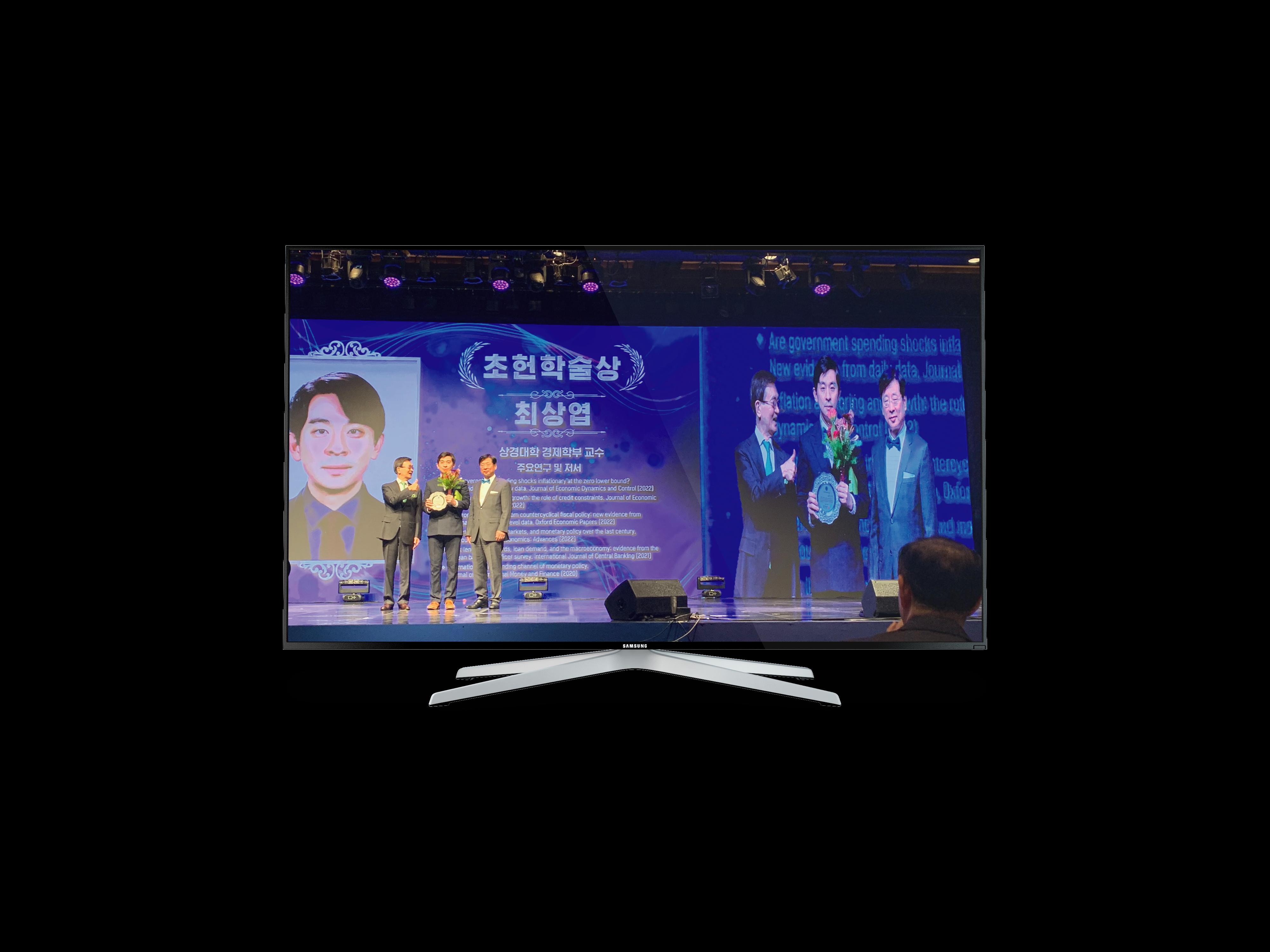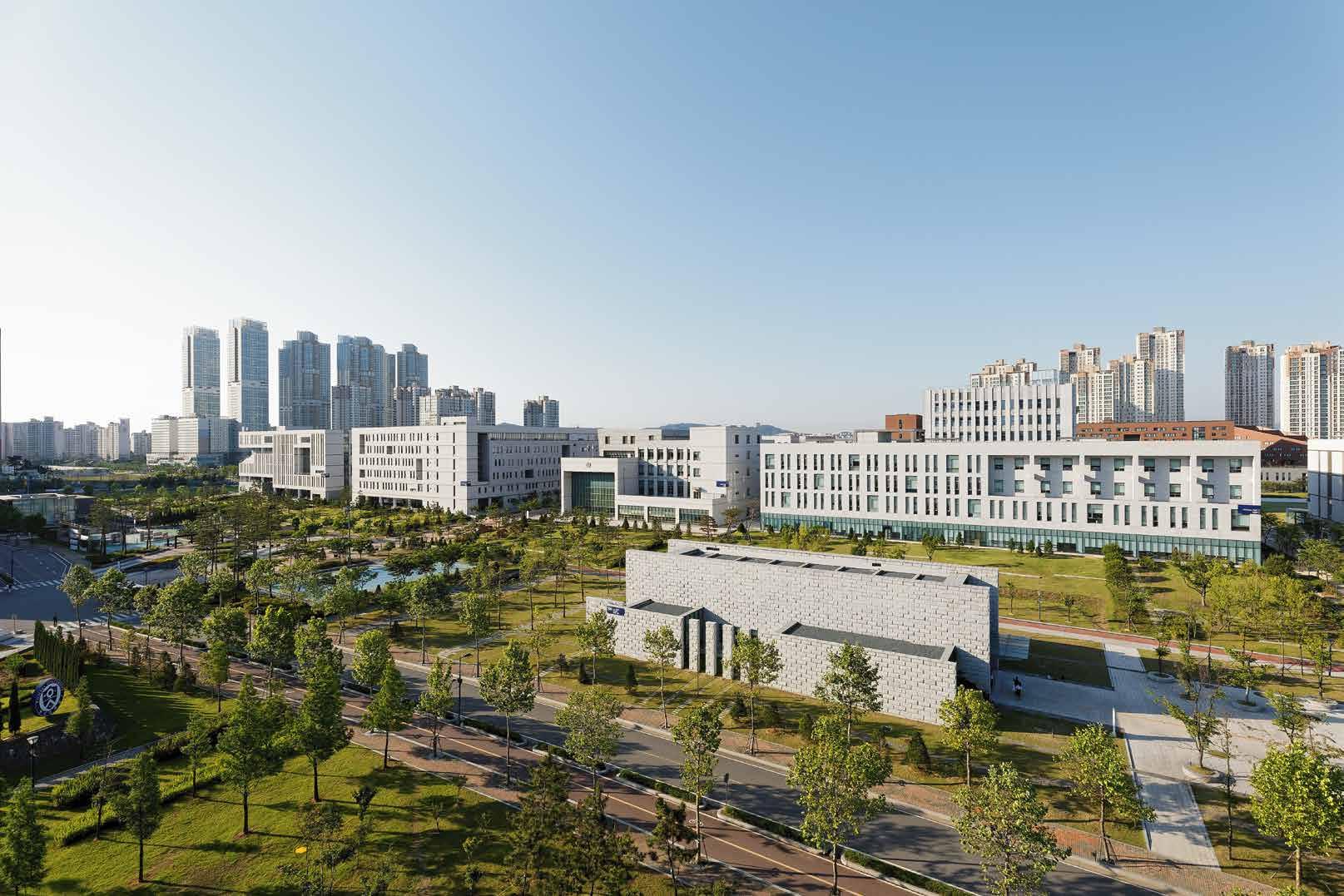





UIC recently opened two new lounges at the Songdo International Campus funded by Underwood International College and the International Campus. In addition to the traditional UIC Student Lounge (Veritas B 325) that features comfortable seating where students can work, the newly opened lounges, “COL.LAB & CREATE” and “Project Lounge” found respectively at Veritas B #437 and Veritas B #438, feature an innovative collaborative space where faculty and students can come together. By opening up a shared space, these project-based lounges are intended to foster collaboration and cooperation between faculty and students for various purposes— to foster interaction between students and professors, and for students to receive mentoring, research advice, and more.
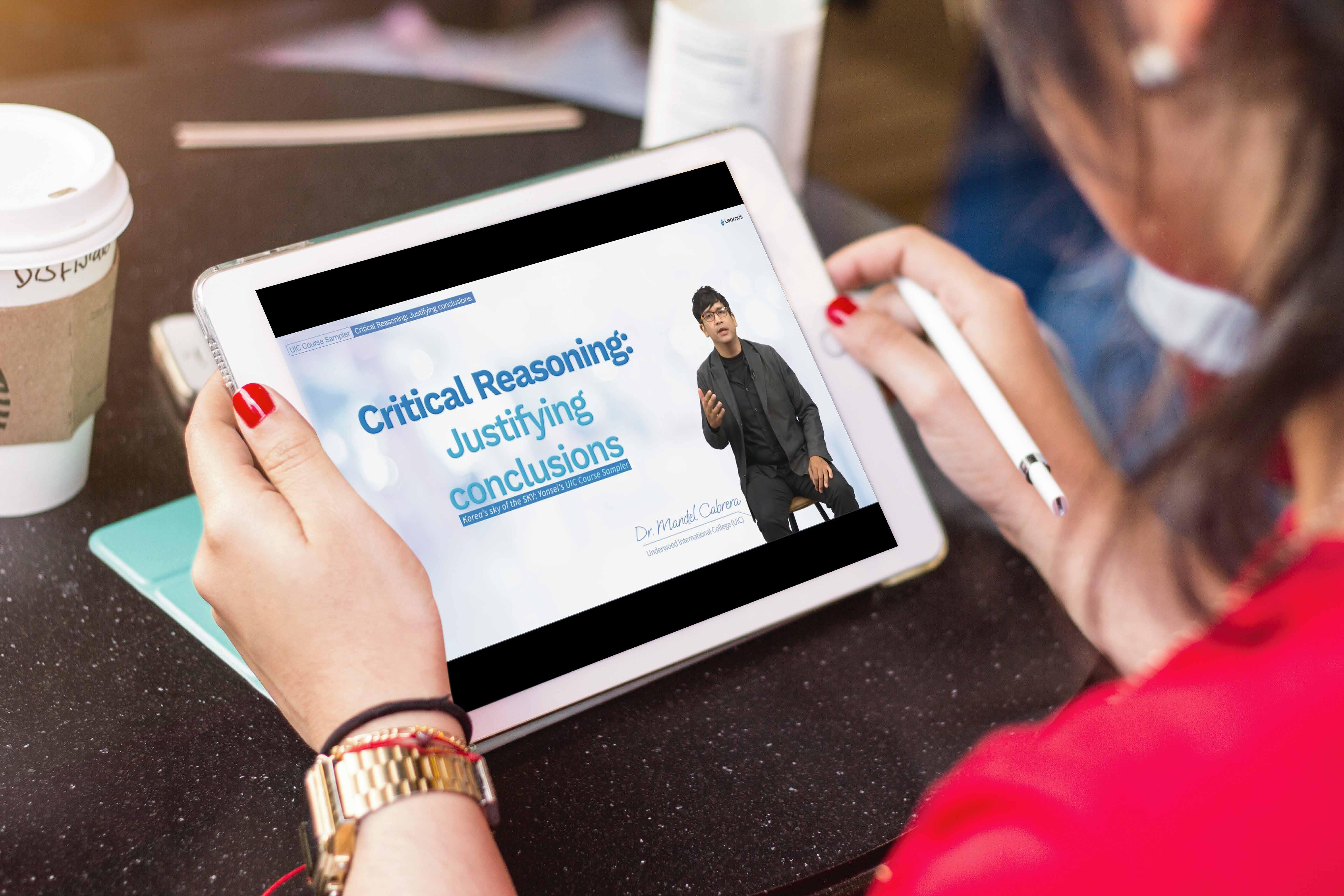
As an introduction to its diverse curriculum, UIC has created a “Course Sampler” program for the LearnUs online platform that introduces first-year and prospective students to the UIC Common Curriculum. By providing ten-minute long sample lectures in the fields of literature, history, philosophy, and research design, the Course Sampler provides a comprehensive but easy-to-access overview of the key features of a UIC education as well as an introduction to the UIC faculty. Targeting domestic high school students as well as overseas prospective students, the course “Koreaʼs sky of the SKY: Yonseiʼs UIC Course Sampler” can be found under the “International Program” section on the Yonsei LearnUs website (www.learnus.org).
World History: Eastern Civilizations by Michael Hope
Watch Professor Michael Hope talk about the concept of source analysis and how this framework can be applied to understanding the non-linear accounts of history in his World History course.
World Philosophy: Personal Identity by Natalja Deng
Professor Natalja Deng explores the fundamentals of personal identity, asking what it means to be a person and examining ethical questions about life and social interactions. Learn more about personal beliefs and how they inform a personʼs sense of self in UICʼs World Philosophy course.
World Literature: Modern Japanese Literature by Helen Lee
Learn about the salient features of reading and understanding literature with Professor Helen Lee as she deconstructs an excerpt of a popular Japanese literary text through the lens of historical context and nuance of creative writing.
Critical Reasoning: Justifying Conclusions by Mandel Cabrera
To know more about logical reasoning and how we draw conclusions, check out Professor Mandel Cabreraʼs Critical Reasoning lecture where he talks about the issues of truth and validity in justifying conclusions.
Research Design: Survey Design by Rennie Moon
Learn more about survey design, an essential data collection technique, and how to construct surveys that avoid biased, misleading responses in Professor Rennie Moonʼs Research Design course at UIC.
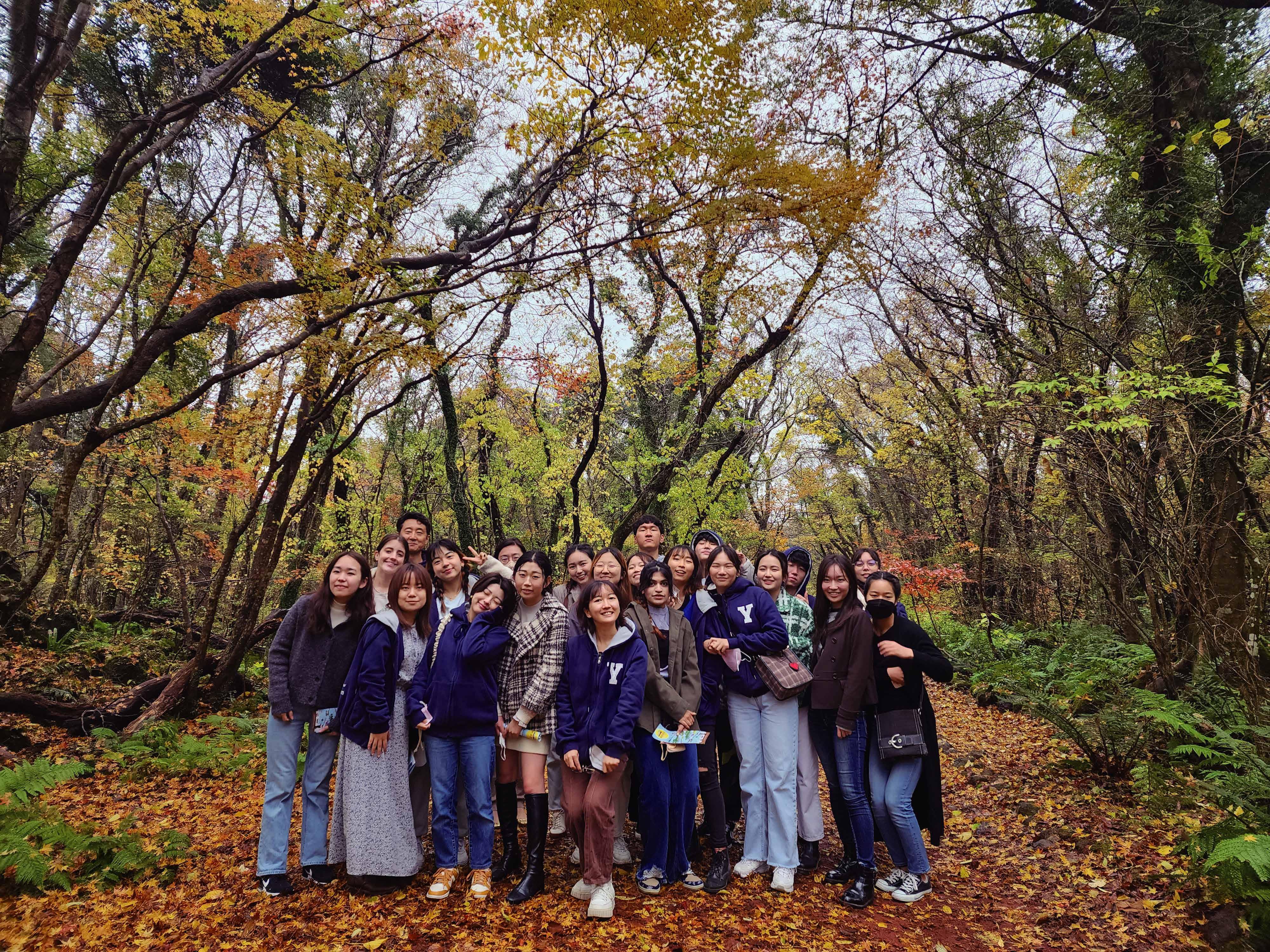
Seoyoung Clara Kim (UIC, International Studies, 22ʼ)
Karen Makino (ICU)
Junhong Moon (UIC, Asian Studies, 22ʼ)
In the 2022 fall semester, 10 students from Yonsei University and 10 students from International Christian University, Tokyo participated in the LearnUs Global Semester Program, a hybrid exchange program based on the theme of ‘Reconciliationʼ. The first 5 weeks were taught online through the LearnUs platform and from the 6th week, the ICU students traveled to Korea to join in-person lectures at the Songdo International campus.
The Launching Ceremony - Clara Kim
To welcome the arrival of ICU students in Korea, Yonsei held a launching ceremony at the Songdo campus where Yonsei President Seoung Hwan Suh and ICU Vice-President Mark Williams gave speeches. Through their speeches, I could understand the depth of behind-the-scenes work and cooperation between the two universities that made this program possible. Moreover, major donor Chairman of Zinus Corporation Younjae Lee gave a speech where he detailed his experience as one of the first Yonsei students to study abroad at the International Christian University. His experience of working at the ICU cafeteria and making friends with fellow ICU students was an opportunity to get a glimpse of the ICU-Yonsei history which decades later, our cohort was continuing.
The curriculum was composed of two L-H-P classes (World History and World Literature) and three seminar classes including Advanced Studies to Media-Communications, International Studies of the Asia Pacific and the Shinhan Lecture Series. Every class linked back to the theme of Reconciliation. Due to the multidisciplinary approach to learning about ‘Reconciliationʼ, we were able to make connections between what we learnt in each subject. During discussions, I would often hear “This ties to what we learnt in World History!” or “This point counteracts with the perspective we heard in World Literature.” By being exposed to diverse perspectives from various fields of studies, we were able to think deeply about how reconciliation can be brought about, and by extension, what it means to reconcile. Our discussions continued outside the classroom as students brought projects to the hotels during our field trip and worked on them until midnight. As we gave ideas and feedback to each other in our hotel bedrooms, it helped our projects get to the next level of depth and analysis.
The trips were the most exciting and exhausting part of the whole program. Although we saw more than enough temples and hanboks by the end of the program, I donʼt think I could have ever gotten as close to Korean culture and friends without these trips. After each trip, I began to notice the similarities between Korea and Japanese culture. The colors, structure, and the stories behind each temple might differ, but its silence and peace remarkably resembled Japanese temples. Walking with the program members through the morning breeze in Gyeongju, listening to the gentle breeze and the giggles of our chats in Buyeo, and enjoying the vast nature of Jeju island with my arms tightly linked with another memberʼs to keep warm– all of these small moments in our trips and interactions made me feel safe. It allowed me to broaden my perspective of Korea and hope for our future, especially after some of the heavy topics we covered in class.
The food was another important part of the weekly excursions. I donʼt think I would have been able to try such a variety of delicious Korean food in such a short span of time without these trips. Meal time also offered the students a chance to sit together, share meals and bond with each other. We sat with a different member at every meal, sometimes with professors or the guides, and talked about our daily lives. I feel like I learned a lot from the meals as much as I learned from the trips themselves.
The Japan trip was a replacement for the Yonsei studentʼs 5-week exchange program to Japan which was canceled due to the Japanese governmentʼs COVID-19 border control policy. Since the Yonsei students missed 5 weeks of exchange, I saw the Japan trip as an opportunity to leave the lingering emotions about the canceled exchange classes behind, and was determined to learn and enjoy all the experiences I would gain in Japan.
The entire trip lasted ten days where we visited several companies and organized and executed three days of self-guided tour. Initially, planning the self-guided tour was difficult. As someone who usually doesnʼt make precise schedules, it was challenging to look for places to visit and to consider how to move from place to place. Moreover, a slight mistake like missing a train might cause big problems if group members are separated or lost. However, as we took our first steps at Haneda Airport, my worries were proven meaningless. The companies we visited hosted us with so much care and preparation that I was deeply moved by how they treated us. The self-guided tour was also filled with fun experiences like wearing kimonos, visiting TeamLab Planet museum, and going up the Tokyo Sky Tree. In the end, I found myself having so much fun with my friends.
The 10-day stay in Tokyo was a life-changing experience for me. I will never forget all the valuable experiences I got from this semester, especially the experience from the Japan trip. I would like to thank both UIC and ICU, the professors and faculty members, and finally my beloved friends for making this program a reality.
On November 5, 2022, Professor Thomas Quartermain took students in his World History: Group II class on a trip to Gyeongbok palace. The class rented hanbok [traditional Korean clothing] as they walked around the palace. Reflecting on their experiences, the students shared about their time spent at the historic palace.
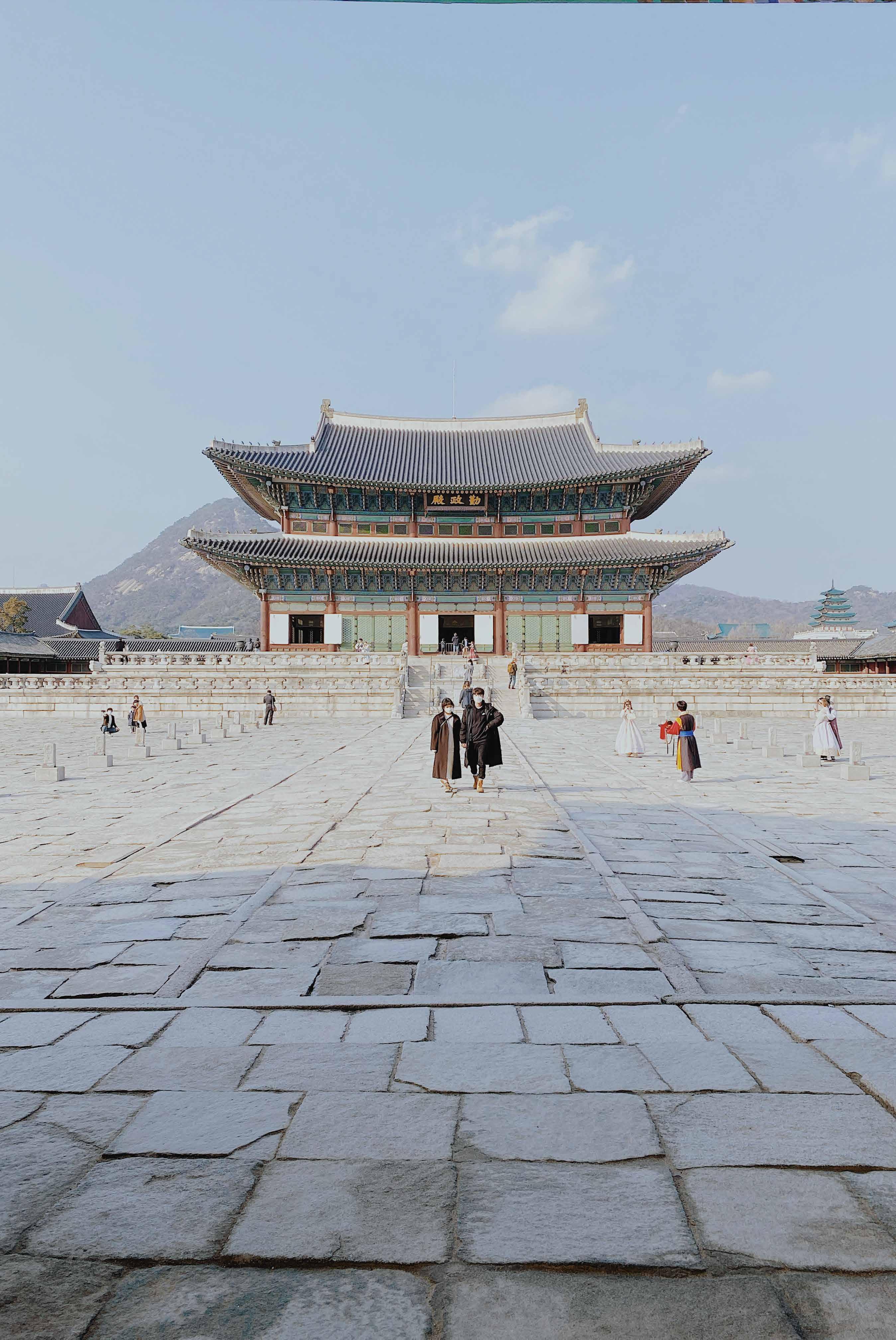
How did this field trip enhance your understanding of Korean history?
Yafet A. Kassa: During our visit, we contextualized the meaning behind feng shui, understood how various administrative and spiritual bodies of that time functioned within the imperial ecology, and got a brief glimpse of the effects of the Japanese on the Korean past.
Ngo Minh Chau: I was able to fully immerse myself in Korean culture as I walked through the palace with my classmates and as Professor Quartermain explained the palace features as we examined them. In class, we learned about King Taejong [Yi Seonggye], but it was a memorable experience to stroll through the palace that served as the King's household and functioned as the government center.
Heejoo Lee: As a Korean, Gyeongbok Palace was familiar to me because I had often visited for field trips and family outings. However, the palace felt different since we got a guided tour and I saw the features that I had missed before, like the specific purpose behind the palaceʼs construction. The most impressive part was the scenery we saw as soon as we passed Gwanghwamun gate—I felt overwhelmed because I could get the whole view of Gyeongbok Palace at once.

What stood out to you from your visit?
Jisu Lee: The palace was beautiful, and it was fascinating to think that all the kings of Joseon walked around the exact spot where we were standing. An interesting thing that caught my eye was a damaged wall from former battles which showed the physical traces of history.
Duong Thi Anh Thu: Right in front of the main palace, the actual scars of bullets and bombs on the walls impressed me the most. Since the war had happened right where I was standing, I reflected on how solid the architecture must have been to withstand such history.

Leo Pesola: One thing that stood out to me was the Gwanghwamun gate being split into three parts: one each for the military, scholars, and the king. I found it interesting how this statement of power seemed so counterintuitive, but it must have been important enough to preserve it in that state.
Vivienne Rose Dy: The thing that interested me was how social hierarchy was clearly showcased through the pathway that led to Geunjeongjeon, where the main throne was located. On the way to Geunjgeonjeon, the rocks that stood in front of it represented peopleʼs positions and the farther they were to the king, the lower the ranks they held.
Fellita Luna Sugianto: What piqued my interest is the paintings on the roof of the Gyeongbok palaceʼs gate. Apparently, it's called dancheong. The one I came across was on the north gate of Gyeongbok-gung: a painting of hyeonmu, "black tortoise," a legendary animal that protects the north.
Makeda Ermias Michael: It was amazing to be able to stand in a location that significantly influenced South Korea as it is known today. I had the chance to live through Korea's Joseon era. I was astonished by the sense of continuity with the past since individuals dressed in period attire, re-enacted royal rites, and displayed a wide variety of objects. One of my favorites was the ceilings' edge-engraved animal designs. I found comfort in the palace. It helped me realize how closely connected the past, present, and future are to one another.
How did you enjoy wearing hanbok as you went through Gyeongbok Palace?
Rabea Kahahni: I found the hanging pendants for the Norigae (the upper garment or skirt) displayed in the museum interesting. The shape and color of the ornaments worn by Joseon court ladies were related to the changing seasons; while jade and bead pendants were worn in spring, summer, and autumn, incense pouch pendants or onyx were worn during winter.
Jennifer Faye Halim: When we wore the hanbok, I felt like I was inside a historical Korean drama. Picking the hanbok color was quite challenging since all of them are gorgeous and remind me of the color societal roles that I learned in class. It piqued my interest how real people were performing as guards at the Gwanghwamun gate, stunningly costumed in red and blue robes.
Bong Indria Sukma: Wearing a hanbok in Gyeongbok-gung has been on my bucket list for a long time. It immersed me in the Korean culture I had heard so much about during my World History classes, and it felt like a fairytale. Being welcomed by the towering Gwanghwamun gate was surreal and it seemed to take me back to the Joseon dynasty. The middle pathway was blocked as it used to be reserved for the King, and though no such King exists anymore, it was interesting to see the remnants of the past still being implemented today. It was an incredible experience and I loved the opportunity of learning outside the classroom.
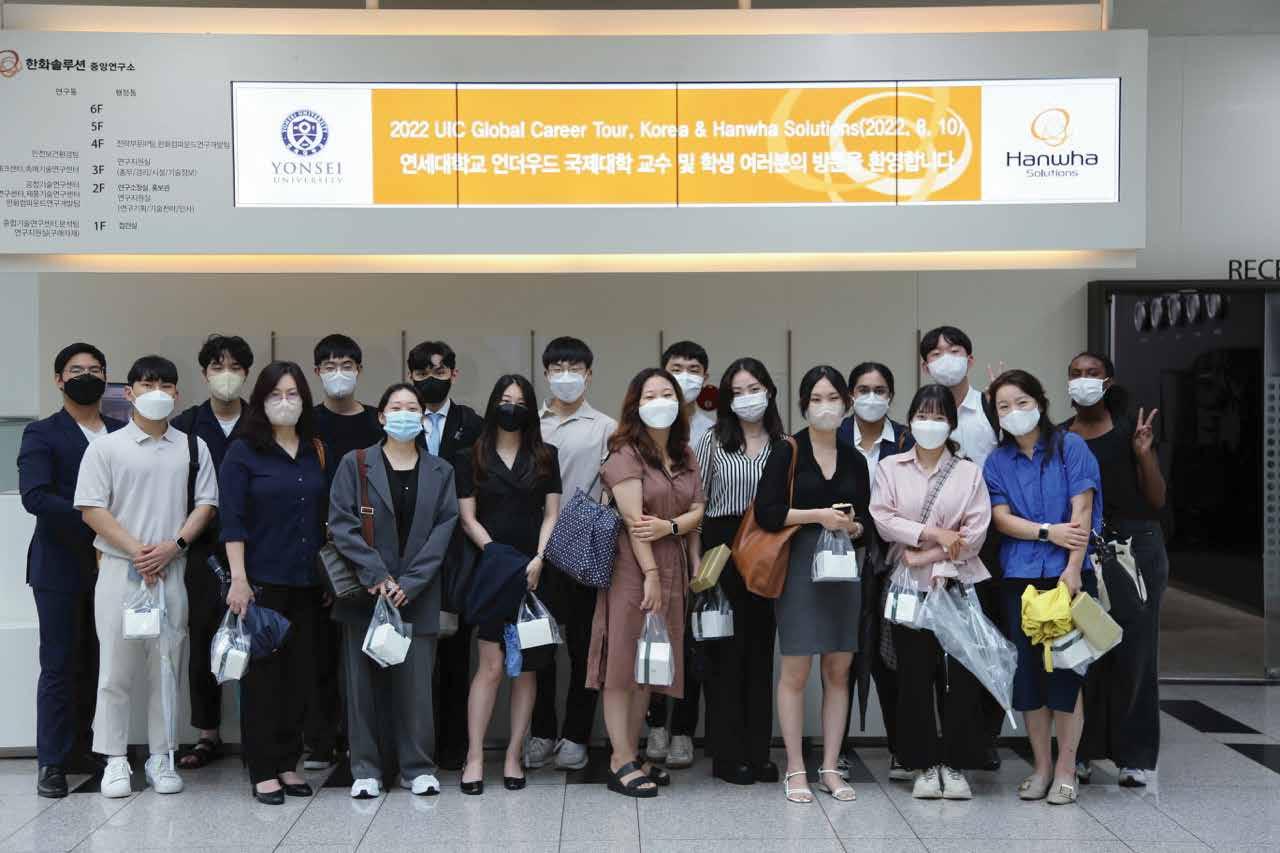
From August 8-11, 2022, UIC held its annual Global Career Tour but this time with a special emphasis on the field of science. Led by the Dean Helen Lee and professors Sunglan Chung, Hyunsang Kim, and Yoon Jung Jang, the Tour offered students the opportunity to explore possible career paths at premier science and technology firms in the greater Seoul area, including ABL Bio, Aevis Bio, BINEX, Hanhwa Solutions, Merck, Institut Pasteur Korea (IPK), ThermoFisher, and Korea Research Institute of Bioscience and Biotechnology (KRIBB). As the first in-person global tour after two years of social distancing, a total of 16 students participated in this exciting and innovative program.
What did you expect from the Global Career Tour?
Siwon Lee: Judging by the title of the program, I expected GCT to simply be a guided tour of different companies in the science field, but I was very surprised by the in-depth interactions we had with employees at each tour site.
Zunu An: I expected to gain hands-on experience with biotech companies. In particular, I wanted to explore how the material I learn in class is being applied in the real world.
Hyungjin Yoon: When I was in high school, I thought that people at the SKY universities seemed super intelligent and confident, like they knew what they were doing all the time. Once in university however, I discovered that there are things that can be learned only after experiencing them for yourself. GCT seemed like an excellent opportunity for me to get that hands-on experience in a relatively short time by meeting professionals in the biomedical industry.
What was the most valuable part of the Global Career Tour to you personally?
Siwon Lee: The most valuable aspect was the fruitful conversations that we shared with current employees. The staff at each tour site created a welcoming and passionate environment which encouraged students to ask questions without hesitation. I especially appreciated the personal accounts of their struggles and success in the process of growing from a confused undergraduate to a proud careerist. These stories not only helped me to set short and long-time goals on my career journey, but also encouraged me to keep going.
Hyungjin Yoon: Of the many benefits of this program, I would say that being able to get a grasp on the overall landscape of the biomedical industry was the biggest take-away. From research institutes to industrial giants like ThermoFisher, I was able to meet with professionals tasked with different objectives and better understand the employment structure of this industry, which is closely related to advanced academic fields beyond the bachelorʼs degree.
Zunu An: The most valuable part of the Global Career Tour was the opportunity to network with experts in the industry. I had the privilege to meet with various people in the biotech industry, from entry-level employees to company CEOs. Hearing directly from them helped me reassess my career goals and gain insight on how to prepare for the future.
How do you think the Global Career Tour will help you in either your studies at UIC or in your future career?
Siwon Lee: Prior to GCT, I only had some vague ideas about working in the industry. However, my experience with GCT helped me understand the reality of possible career paths that I could pursue as a UIC biology major. What I learned through the program will help me decide and pursue my future career.
Hyungjin Yoon: I think it would be best to come up with a very specific career path early on in college and start developing that plan. But at the same time, I understand from the bottom of my heart how hard that is. If you have similar concerns, I definitely recommend participating in GCT, since it gives you a good starting point by forming a broad understanding of the job market. From our visit to various biotech companies and research institutes, such as the Pasteur Institut Korea, I was encouraged to find that there is an increasing demand on medical informatics and data science. Another thing Iʼd like to mention is that I made connections with peers and professors from GCT that helped me later on. Having something in common really lowers the barrier to bonding, especially when it comes to interacting with your professor.
Zunu An: The Global Career Tour not only helps students with career development, but it also adds a whole new dimension in learning. It's one thing to learn about antibodies in a textbook and another to see how they are being used in pharmaceutical manufacturing. Personally, I think being able to connect abstract concepts with personal experience greatly enhances efficiency in learning.
Student Participants
Zunu An (LSBT ʼ20)
Junseo Choi (LSBT ʼ20)
Jinho Hong (EESE ʼ21.5)
Whan Hur (BC ʼ19)
Seorin Kang (BC/NSE ʼ20)
Sein Kim (LSBT ʼ20.5)
Siwon Lee (LSBT ʼ19)
Youbin Lee (BC ʼ17)
Jinyoung Hong (BCʼ19)
Yelim Hong (EESE/Econ ʼ19)
Seoyeon Kim (BC ʼ18)
Yujin Kong (LSBT/IS ʼ19)
Jaehoon Lee (LSBT/STP ʼ18)
Gayatri Patel (BC ʼ19.5)
Hamerenoah Tesega (LSBT ʼ21)
Hyungjin Yoon (BC ʼ19)
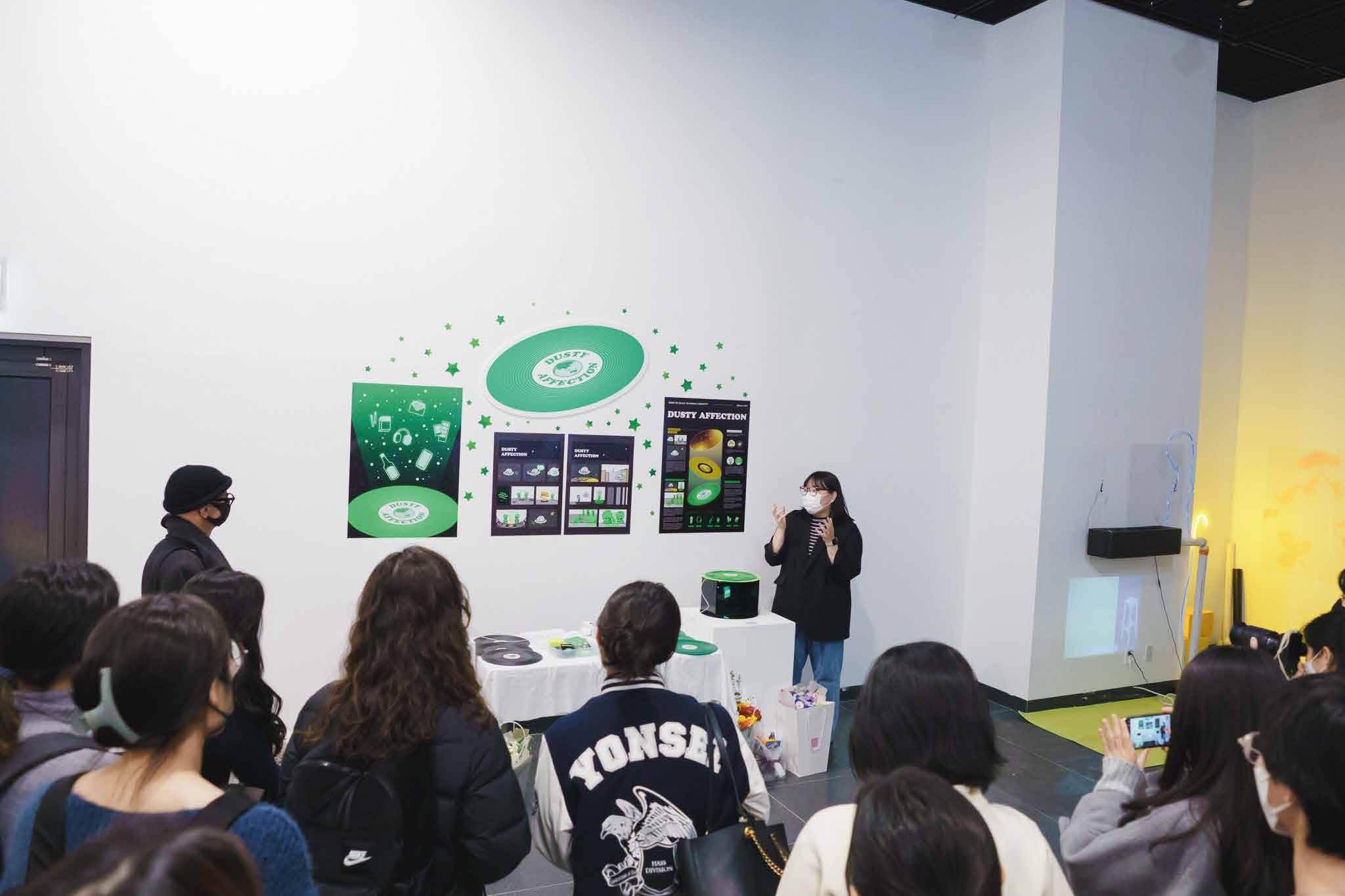
From November 22 to 28, fifteen graduating Information and Interaction Design (IID) students exhibited their works at Muak Rotary Hall. Based on the theme of 'Staying Connected: Reaching Out,’ their projects included solutions for the betterment of society with an emphasis on technology and a brighter future. Though the project began during the CCOVID-19 pandemic, participant Daniel Park said, "What started as a project based on the need to better our lives during the pandemic, led to a shift to a demand for better understanding of our surroundings and the role we fit in."
The “IIDENTITY” exhibition consisted of three portions: IID students, the identity of individuals today, and the role of entities in the world. As evidenced by their thought-provoking projects, the IID exhibition emphasized technology, systematic research thinking, insight into branches of considering user needs, market demands, and the overall design process.

Following the themes of self-care, the consequences of individual actions, and exploring and visualizing abstract concepts, the exhibition sought to present new perspectives on these pressing issues. Works concerning self-care included finding better rest and happiness, fighting alcohol abuse, and discovering what kind of flower represents oneself. As for the theme of dealing with consequences, the design projects consisted of reducing trash waste and animations on how choices affect results. Finally, artwork investigating abstract topics dealt with Korean culture, sensory transition, motion, communication, and other perspectives.
Incorporating technology into their exhibits, students utilized projectors, fog technology, holograms, 3D modeling programs, and game engines to visualize their work, as well as digital works, physical models, and branding.
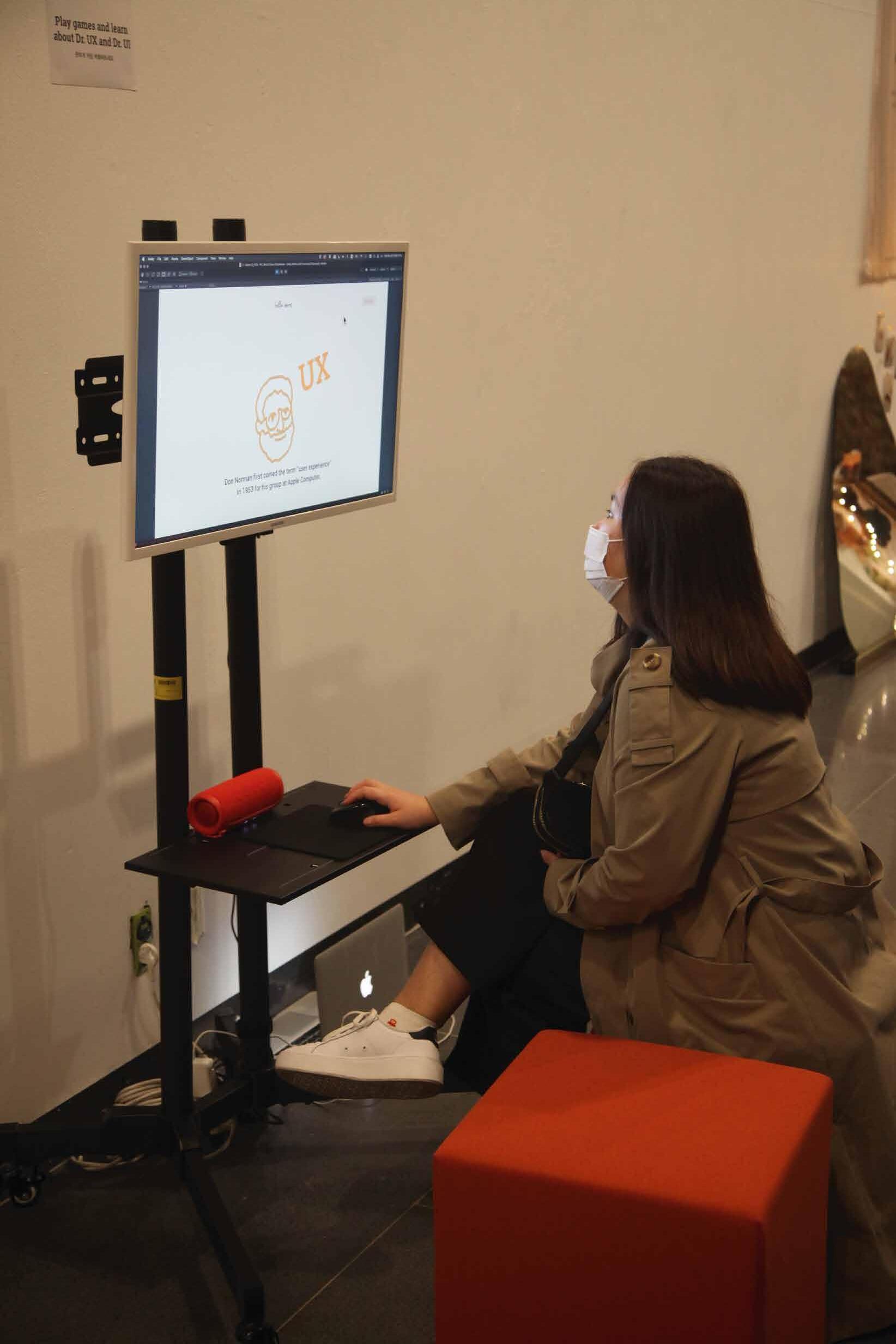
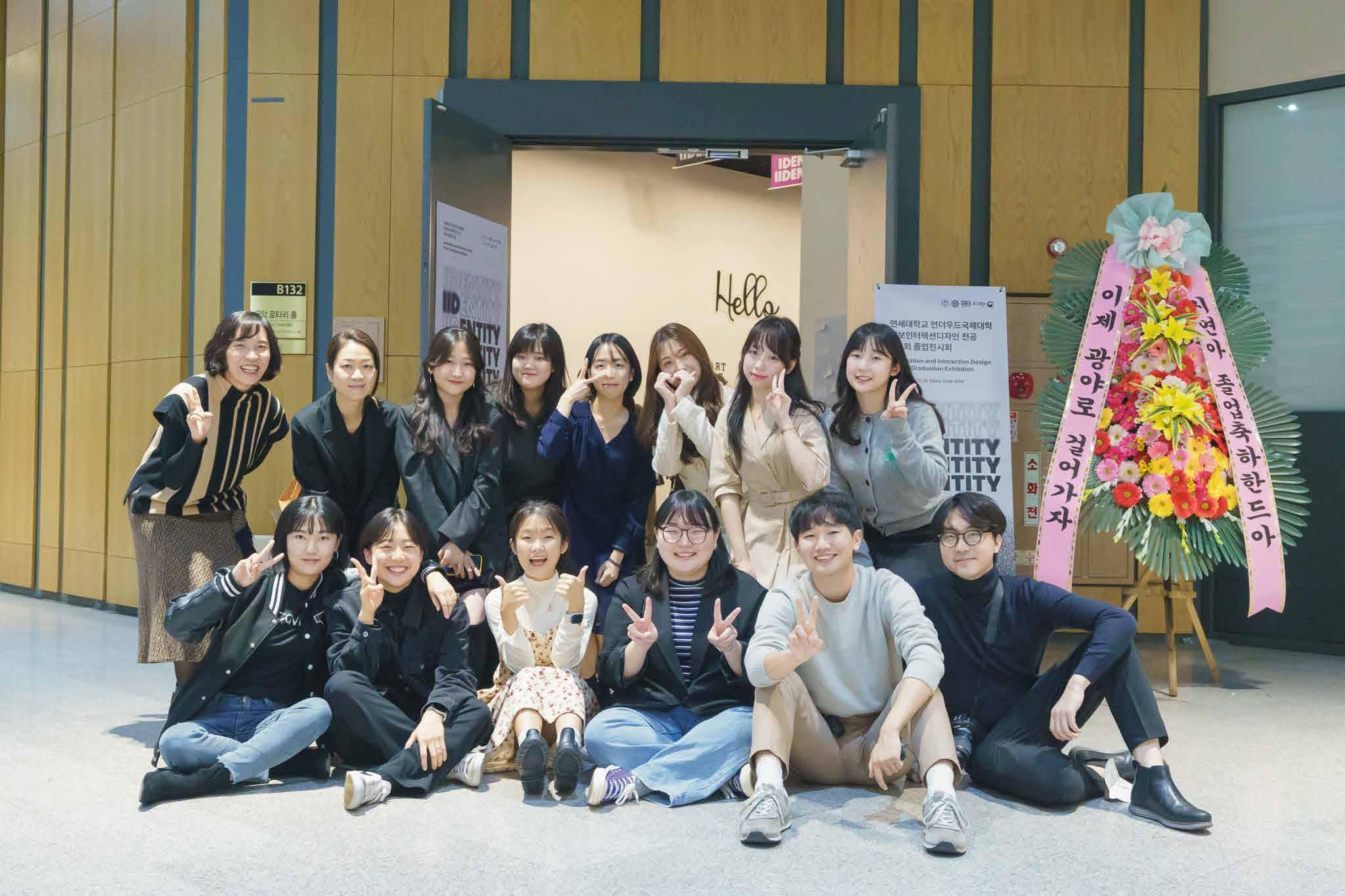
Sunwoo Lee (CDM, ’19) won an award at the Asan Entrepreneurship Review as part of “Team Yeongisang,” under the supervision of Prof. Hyun-Kyung Lee, chair of the CDM major. The competition was hosted by the Asan Nanum Foundation and featured case analysis of the challenges faced by numerous companies. Participants presented management theories and frameworks to help companies overcome theoretical and practical obstacles.
Could you give us a description of your project
This project was a case analyzing competition hosted by Asan Entrepreneurship Review (AER). I teamed up with two non-UIC students, Hayoung Paik (Konkuk University, Business major) and Sangyoon Jeon (Yonsei University, Business major). We were asked to select from among three cases: Healing Paper, Gaudiolab, and Superbin. My team members and I chose Healing Paper as our case study subject and provided a macro-perspective review regarding the platform’s strengths and the external factors
Looking back, what do you think of this project
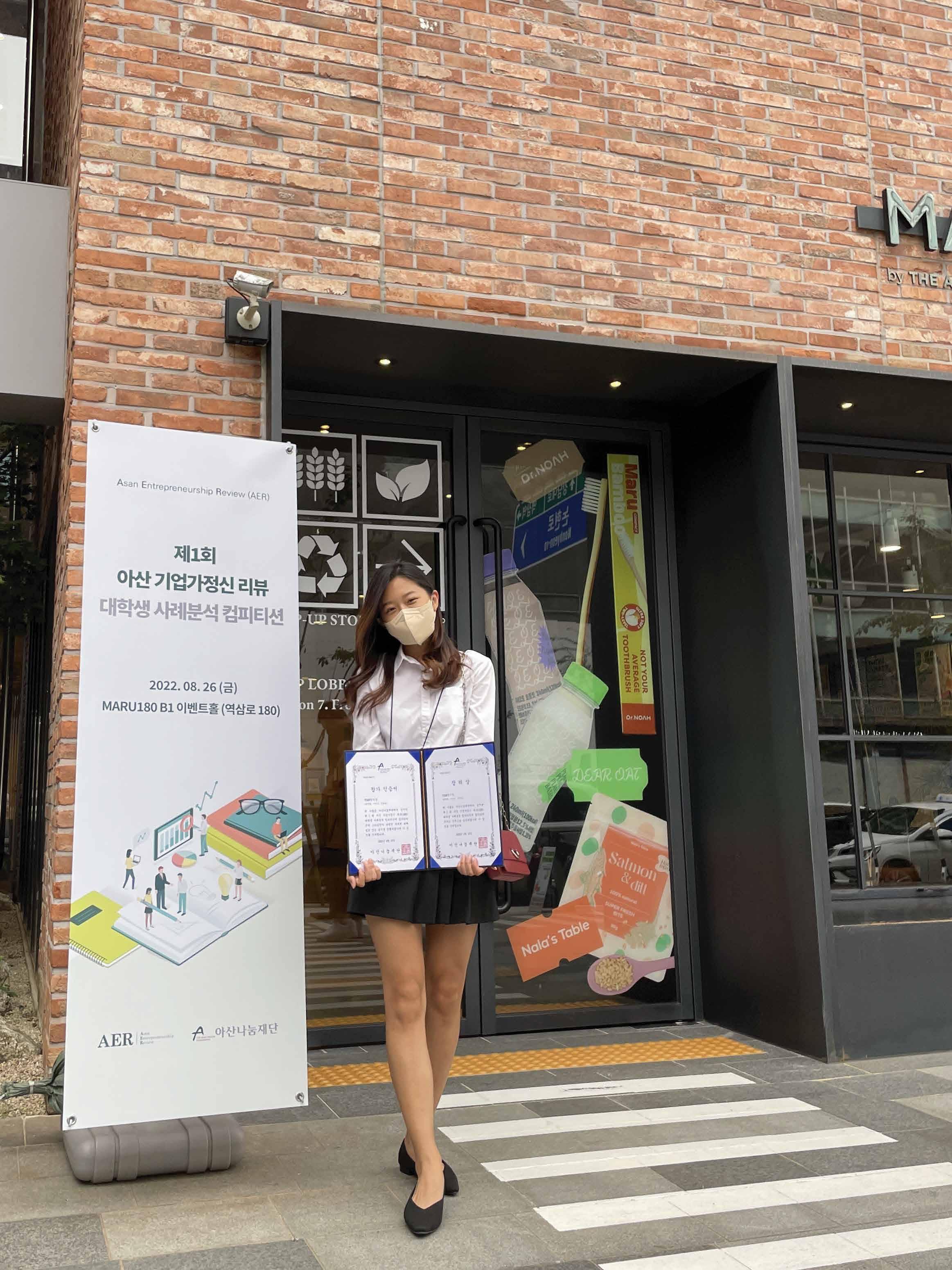
It was a great experience as it opened us up to a broader view of our field of study. At the same time, we were also able to develop practical experience as we applied frameworks best suited to our case study. Ten pages were devoted to reviewing the company based on the focus questions that we formulated. The other five pages were teaching notes that summarized the frameworks that we used as well as the meaning and value of our project. I could truly communicate with my teammates on a deeper level as we
How did you come to be considered for this award
Our paper not only focused on the company itself, but also considered external factors that could have influenced the platform and its users. I think this was evaluated positively as we provided a macroscopic perspective on the company’s growth. We were all very glad that our efforts paid off as we took 7th place. At the awards ceremony, the top six teams made presentations on their works. It was a great opportunity to listen to the other participants’ projects and see the different ways in which they approached the same theme.
What are your future plans at UIC and afterwards
Although I’ve just started my last semester, I would like to keep my options open. I want to evaluate all my interests and opportunities before I make a decision about my future career.
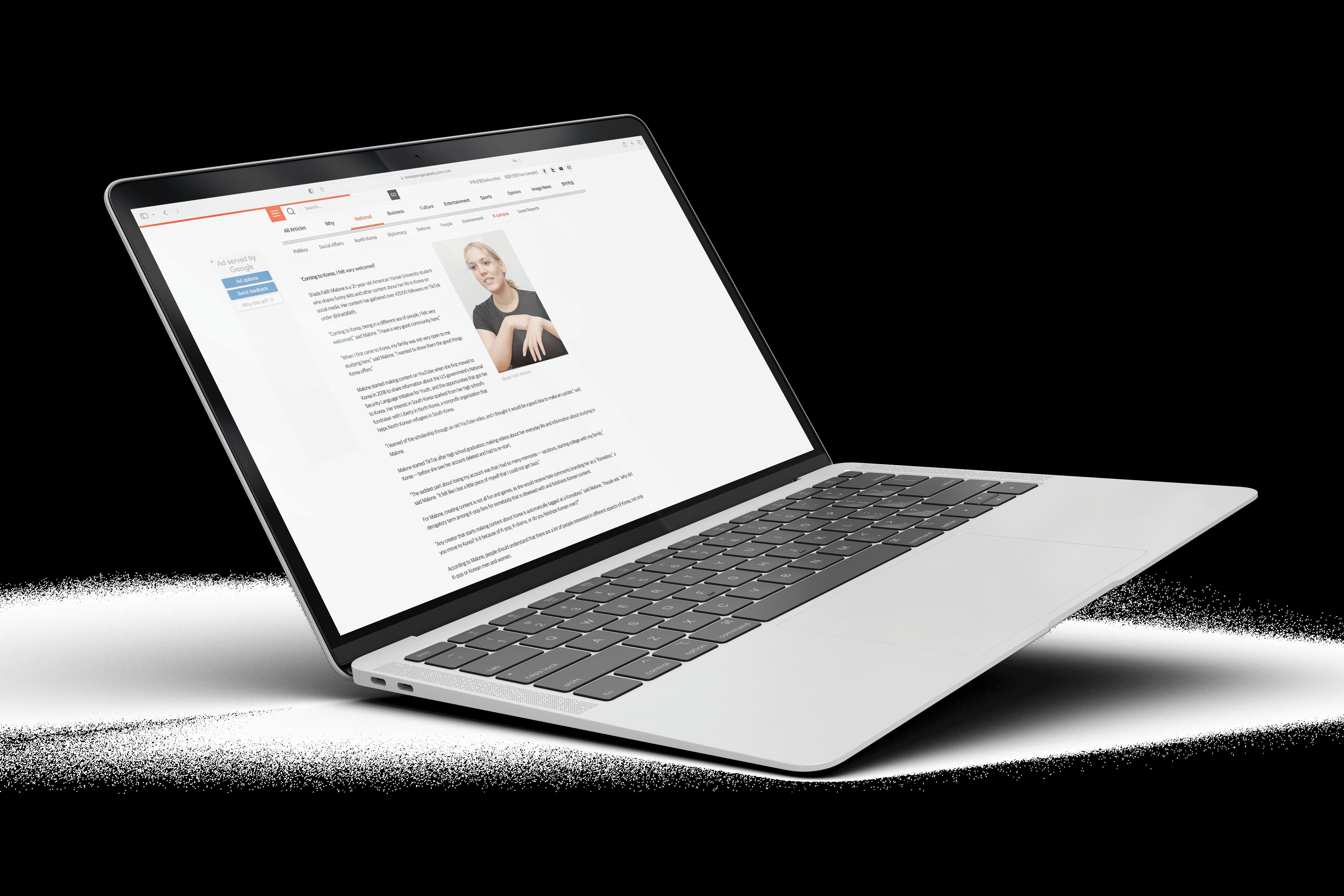

Shada Faith Malone (IS, ʼ19.5) was recently featured in a Korea Joongang Daily article about budding influencers in Korea. As an American studying in Korea, Malone shares content related to her life in Korea on her social media—mainly TikTok and YouTube. Under her TikTok handle of @shadafaith, Malone has amassed a significant following of over 47,000 people on her TikTok channel. She originally became interested in South Korea due to a high school fundraiser for North Korean refugees. Malone continues to share useful information about education, work, culture, and what daily life is like for people interested in Korea.


By Haemin Kwon (BC ʼ19) and Dr. Milan Balaz
On Dec. 1, 2022, the Integrated Science and Engineering Division (ISED) held the 7th UIC Science Fair in the lobby of Veritas Hall B on the Yonsei International Campus. The event was co-organized by Professor Milan Balaz, Ms. Shinhea Kang (ISED registrar), and Ms. Haemin Kwon (BC ʼ19). As the first in-person science fair since the start of the COVID-19 pandemic, it was a much-anticipated event.
Established in 2016, the UIC Science Fair fosters a dynamic culture of research, providing an excellent platform for UIC students to share their passion for science while simultaneously developing critical thinking and analytical skills. This year, 18 undergraduate students presented their research in the form of oral and poster presentations to an eager audience of their friends, peers, and teachers. In addition, messages from UIC Science Fair alumni about their experiences with the event were also on display at the venue. One such message from alumni Yuri Kwon (BC ʼ16, currently a Biochemistry PhD student at the University of New Hampshire) read: “[The UIC Science Fair is] one of the best opportunities UIC has to offer for a student to push beyond their limits.”

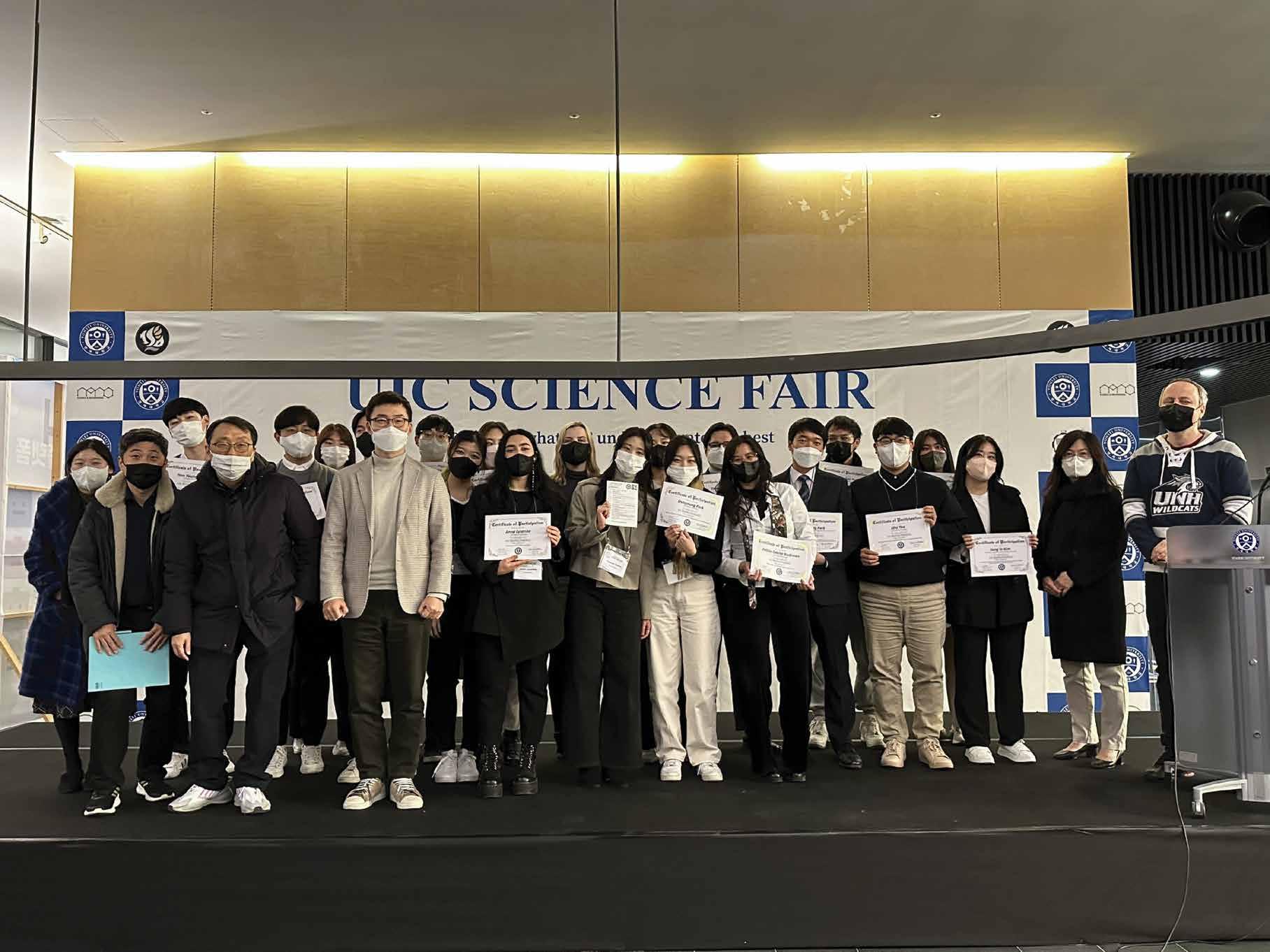


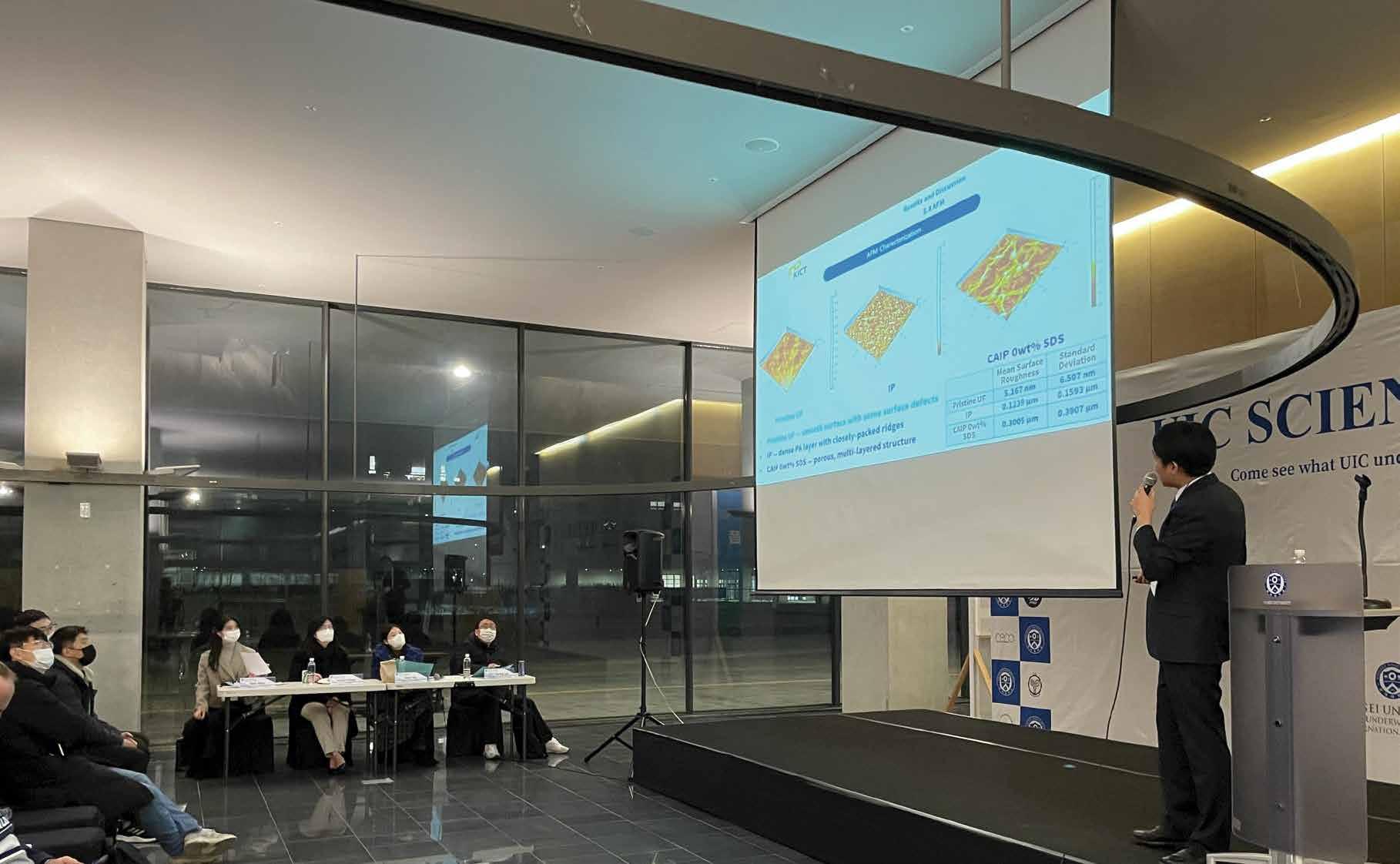
At the beginning of the event, Professor Hansung Kim, ISED director, delivered opening remarks, while Professors Milan Balaz, Sunglan Chung (Chair of BC), Jiwon Kim (Chair of NSE), and Kyu Hyoung Lee (Chair of EESE) served as judges for the event.
The UIC Science Fair was divided into 3 sessions: two oral presentations held before and after a poster presentation. The first speaker of the oral presentations, Anna Lysenko (BC ʼ19), presented on the synergy between the Tau protein and Aβ 42, followed by Jiho Yoo (BC ‘16) who discussed the identification of cellular organelle stress regulators using small molecules. Steven Penczner (NSE ʼ19) introduced triboelectric nanogenerators using cellulose, while Zunu An (LSBT ‘20) presented on T-Cell clonality assessment with WES, and Eunseo Lee (BC ʼ19) showed drug library screening for in-vitro identification of the antagonist of TGR5. Every presentation was followed by a Q&A session with the audience.
Concluding the first round of oral presentations, a 1-hour poster presentation session was held with dinner refreshments. Participants and students gathered around the posters in the lobby enjoying not only the diverse research topics and presentations but also pizza and croissants! Professors and students casually strolled the venue, asking

questions as they enjoyed the informative posters.
Hoeyoung Kim (BC ʼ19) presented a poster on the mutual information between the myelinated nerve fibers with misaligning Ranvier nodes by ephaptic coupling. Felicia Odelia Budiman (BC ‘20) answered questions on her research about the amino acid derived inhibition of Aβ42 aggregation. Seohyun Kim (EESE ʼ19) presented on the effect of vegetation shift and thinning intensity on nitrifying bacteria and Hifzhan Faiz Yeo (BC ‘21) suggested an alternative to aluminium-based deodorant, while Shinyoung Park (BC ‘20) presented on the efficacy of Bacillus Calmette-Guérin loaded egg-based dissolving microneedles. Youngwoo Kim (BC ‘17) made a poster on increasing the accuracy of diffusion tensor imaging for WM tract analysis using high-order methods, followed by Anouschka Deidesheimer (BC ʼ19), who presented on the synergy of Tau repeat domains with Aβ40. The session concluded with Yeonsoo Kwak (EESE ʼ19) talking about the microbial-mediated CH4 Flux and GHGI in response to increased N fertilizer in three rice fields.
Jung In Kim (EESE ʼ19) opened the second oral session with her research on the novel Amplex Red-based fluorometric assay to determine phenol oxidase concentration within soil. Jae Won Lee
(BC ʼ17) presented about CAR T cell immunotherapy, and Jooyeon Lim (BC ʼ20) presented the synthesis of ionizable lipid for the delivery of RNA. Shinyoung Park (NSE/EESE ʼ16) addressed the effects of sodium dodecyl sulfate on the morphology and performance of polyamide thin-film composite membranes, and Saeyun Bhang (BC ʼ20) wrapped up the session with her evaluation of the potential of tauroursodeoxycholic acid in preventing the onset of Alzheimerʼs disease.
After a quick jury deliberation, Professor Hansung Kim was invited back to the floor to deliver awards for the best presenters. The ‘Best Oral Presentationʼ award went to Mr. Zunu An, Mr. Shinyoung Park, and Ms. Saeyun Bhang, while Ms. Yeonsoo Kwak received the ‘Best Poster Presentationʼ award. In addition, all the presenters received the well-deserved ‘Certificate of Participation.ʼ
Following a group photo session, Professor Milan Balaz delivered closing remarks emphasizing the professional nature of the presentations and congratulated all participants on their achievements. Overall, the 7th UIC Science Fair was a great success, and we all look forward to the 8th Science Fair that we hope will bring a new set of exciting stories.
Two UIC students, Suh Hyun Hur (IS, ʼ16) and Myoungjin Koh (JCL, ʼ16), passed the Foreign Service Candidate Selection Exam, to become diplomats for the Ministry of Foreign Affairs. In successfully navigating the application process, they joined an elite cadre of candidates who passed a rigorous course of testing and interviews. They will now undergo training for the next year before receiving their first posting. Suh Hyun Hur and Myoungjin Koh shared some of their experiences in preparing and passing this grueling application process, as well as their future plans as diplomats.
Q: Hello, can you please introduce yourselves?
Myoungjin: Hi, my name is Koh Myoungjin, Iʼm in the class of 16, and Iʼm currently double-majoring in JCL and economics.
I also joined a tennis club called Couque Dasse in the School of Business and Economics with my friends for about a year – I love playing tennis. For an interesting fact about myself, I lived in Malaysia, Singapore, and the United States for a couple of years when I was in elementary school. As for my talents, I can speak French quite fluently. Iʼm in level C2, which is the highest level of achievement in French for foreigners.
Suh Hyun: Hi, my name is Suh Hyun Hur, in English, it's Kristie Hur, and I'm an IS major in the class of 16. I'm also double majoring in Economics at UIC.
I used to live in New Jersey in the States, so when I came back after five years, I was more fluent in English than Korean. But then I attended school in Korean from middle school to high school and came to UIC. As for my talents, I like to sing and I also play the piano. So I was actually in a band called RCM in the Political Science department. I like music in general, which helped me through my studies in Korea as well.
Q: Well, congratulations on passing the Foreign Ministry selection exam. Why did you choose to go into the foreign ministry? What was your personal motivation or inspiration?
Myoungjin: When I was at Songdo in 2016, there were several special lectures given by UIC graduates who were working in the government after passing different exams. After listening to all of those lectures, I became interested in foreign affairs the most because even though theyʼre civil servants working for the government, they work abroad for a long time.I love challenging myself with new environments, so that fit really well with me. Also, Iʼve been interested in international politics since high school. Back then, I read a lot of related books and journals, so that also motivated me to work as a diplomat.
Suh Hyun: When I was in elementary school, I was more fluent in English than in Korean, so there was a period where I had to adjust to the language and culture here in Korea. In middle school, many of my peers told me I would work well as a diplomat since Iʼm fluent in both English and Korean. So, that was the initial motive I had. But in high school I started participating in Model United Nations where I was a very vigorous speaker, which inspired me to work in public service. At the time, I thought I would be more suitable for international organizations like the UN or other organizations within in the UN, but when I came to UIC, I realized that just working in an organization might not be it for me. Then I learned about the diplomatic service civil service exam in my sophomore year.
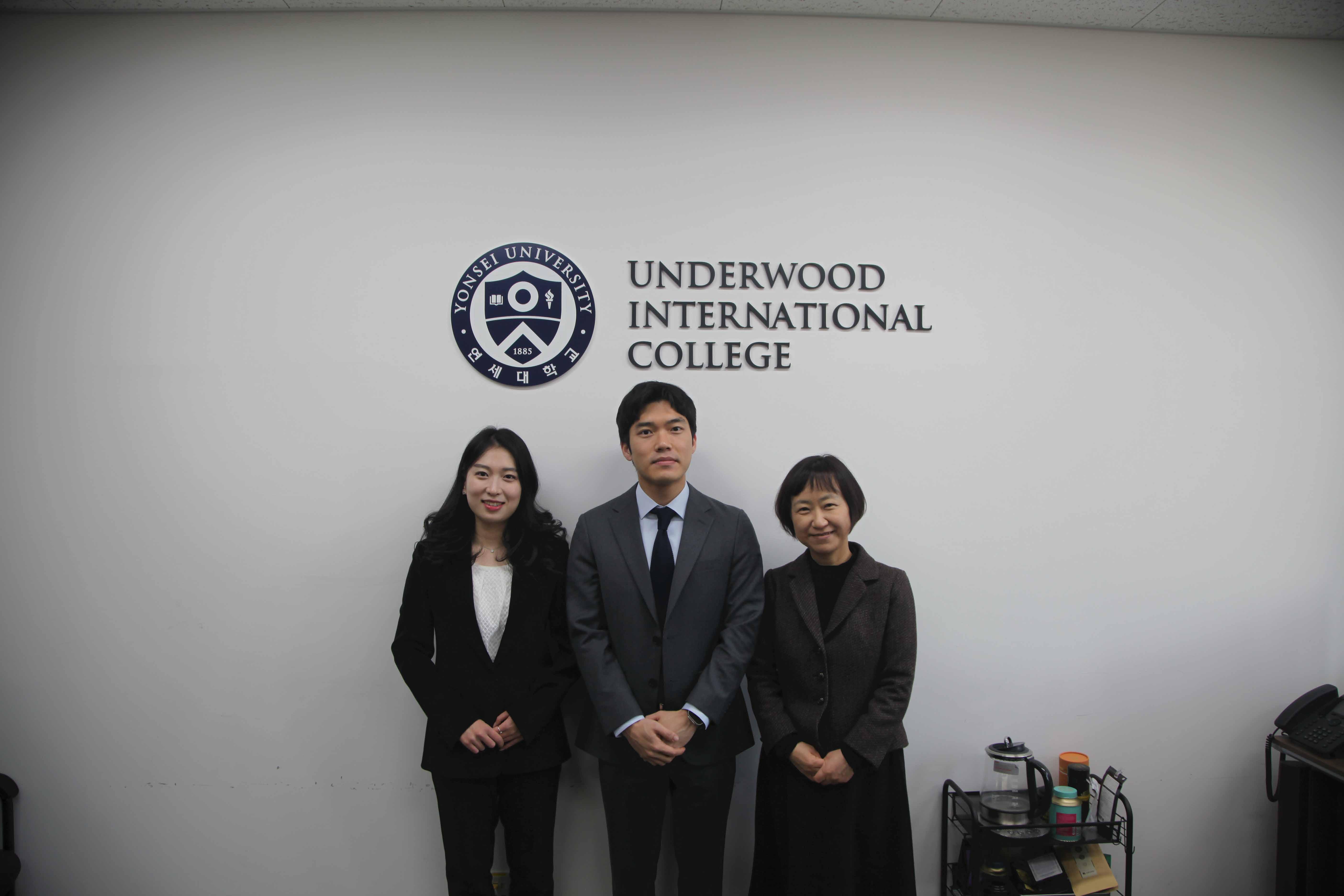
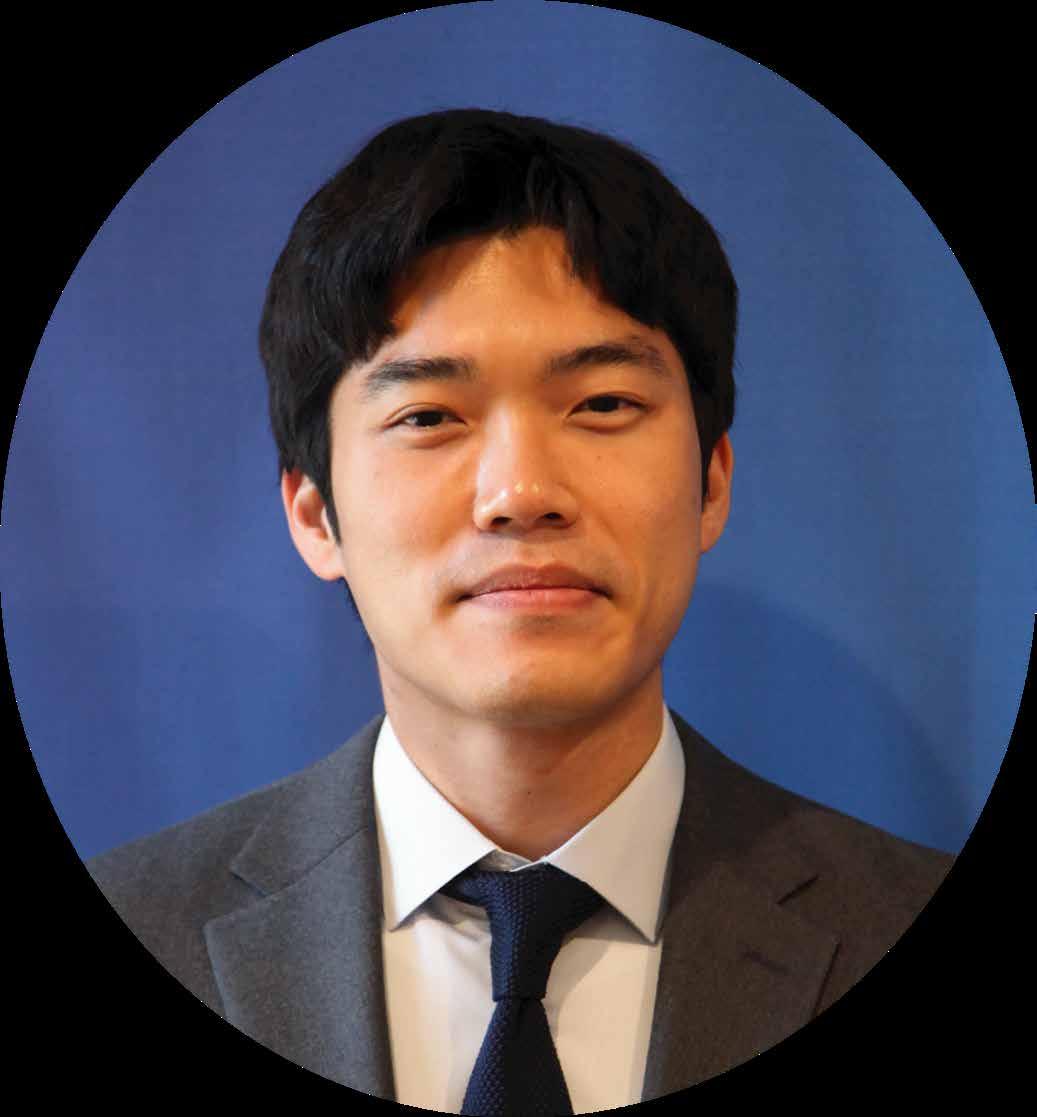
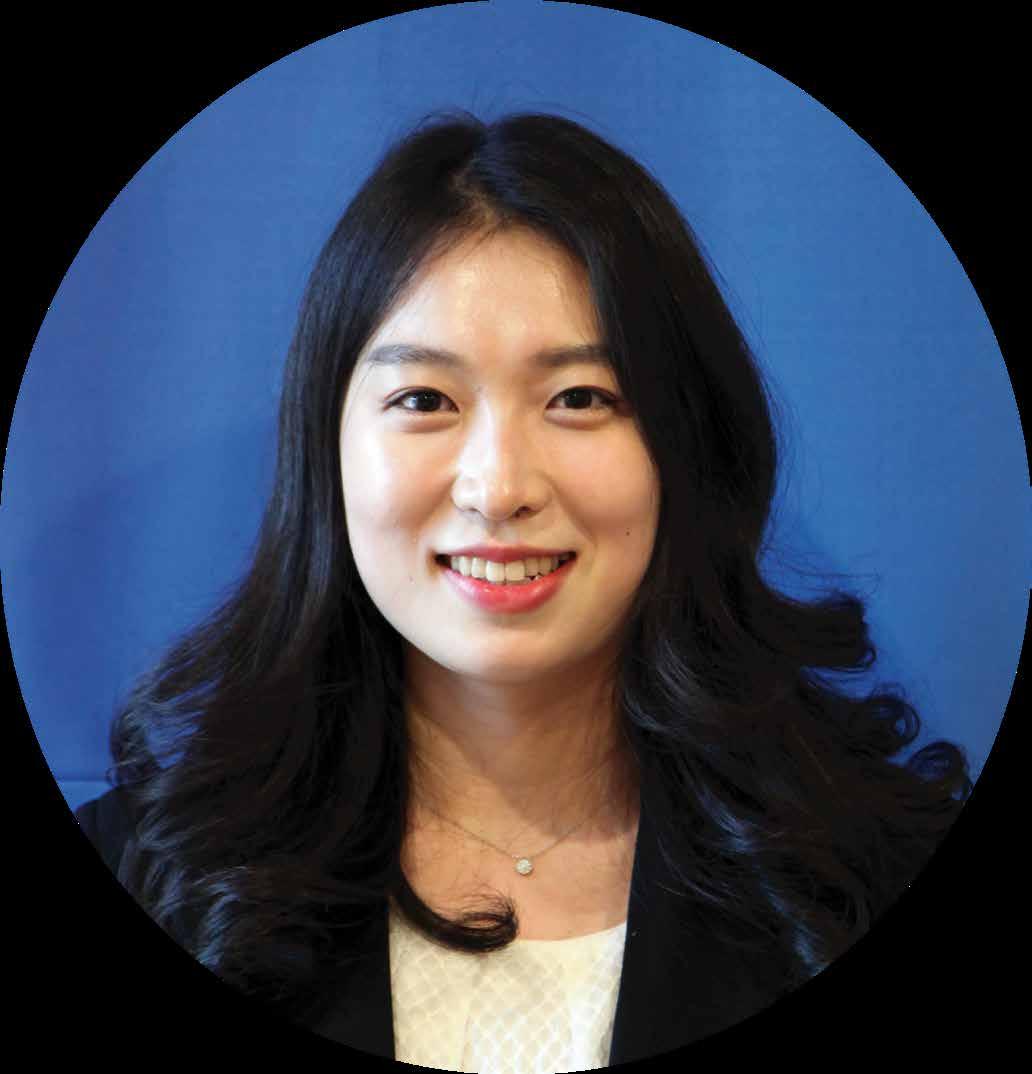
Q: Was there anything during your time at UIC that either prepared you for the exam or for working as a diplomat in the foreign ministry?
Suh Hyun: In Songdo, we have to choose a language course and I chose Chinese for beginners, because that was what I studied a little bit in high school. It actually helped me attain the language proficiency (HSK) standard needed for the job, so I think that was my initiation into preparing for the exam. Also, since Iʼm an International Studies (IS) major, I learned about many different subjects that are related to the international field, and I think that helped me. Professor Han Sukhee from GSIS especially helped. Because he has hands-on experience with Chinese diplomacy, I could learn about actual work in the field, rather than just being limited to ideal principles and theories. I was able to attain a very high score in international politics this year, so I think those experiences definitely helped. And because we constantly have to turn in essays, participate in class discussions, make English presentations, and keep interacting with students in English, UIC has also increased my English communication skills exponentially.
Myoungjin: Frankly, there arenʼt many classes that directly help to prepare for the exam. But indirectly, there were courses that helped me understand the subjects related to the exam. For instance, in the case of Common Curriculum classes, there are many opportunities to learn about Western history, which helped me to more easily understand diplomatic history – which is becoming more and more important in the exam. Microeconomics, macroeconomics, and many
international politics courses provided by UIC are also relevant. I also think the English-speaking environment at UIC is extremely helpful because one of the most significant skills for a diplomat is being multilingual, so if you are fluent in English or other second languages, you have an advantage.
Q: Myoungjin, you took the exam very early in your UIC career. I assume itʼs rather unusual. Can you explain what you did and why you did it?
Myoungjin: After finishing freshman year in 2016, I served in the army from 2017, got discharged in 2019, then I jumped into exam preparation right after. A UIC graduate who had already passed the exam strongly advised me to get started right away after my discharge from the military, instead of returning to school, because he thought that was the most efficient way to pass the exam. His advice suited me well, but it was also quite a gamble. So I want to tell UIC students to follow the most common path by taking the exam in their junior or senior year. I also strongly recommend consulting with your seniors, because then you could learn from their trials and errors, instead of repeating the mistakes they made. And one more thing – while it is very important to study hard, I think itʼs also important to study strategically and efficiently. Try putting different emphasis on each subject. For instance, economics is the most important subject to pass the exam, so you should spend the most time and energy on that subject. And there are frequently asked questions in each subject, so make sure to study the previous exams and test yourself with them.
Q: Thank you. Now letʼs talk about your future plans. You said you were going into the training institute in 2023, and then get a couple more years of training in Korea before going to your first diplomatic posting. Do you get to decide your first posting or is it completely random? And if you could, what would be your ideal posting?
Suh Hyun: We donʼt completely get to decide, but we can write a list of places where we want to go to, for up to three options. Actually, these posts are divided into four categories based on their surroundings and environment, so even if you get a really good post the first time, youʼre usually assigned to a less ideal post the next time. Iʼd prefer to start off with a not-so-good post, because I can survive more easily when Iʼm younger and healthier. Going to a developing country before going to a more developed country would be better, because then I could gain a deeper understanding of what kind of obstacles they face in developing countries, and then if I go to a developed country, it would be easier to communicate and understand what people there really need. I haven't really thought about the exact country, but if Iʼm going to change my second language to Spanish, which I am considering, then I would have to go to Latin America.
Myoungjin: I heard that the the choice of bureau depends on your grades in the training academy, so I donʼt really have a choice. But if I did well, I think Iʼll work in the economic diplomacy department, especially in multilateral economics, which is responsible for multilateral economic organizations such as the OECD. I could put my French skills to work there, since they use both English and French. And also because I double-majored in economics, I could use my economic knowledge to understand the background context. As a second option, Iʼve also thought of economic security. Nowadays with the Russia-Ukraine crisis and the competition between the U.S. and China, many countries and international organizations are imposing economic sanctions on one another. Amidst such economic instability, economic security has become increasingly significant.
Q: Wait, why are you so fluent in French?
Myoungjin: (laughs) I don't know exactly. I only started learning French when I was in the military.
Q: You didnʼt know French at all before you went to the military?
Myoungjin: No, not at all. I studied Chinese as a second language once, but I wasnʼt very interested in Chinese and I wasnʼt good at it either, so I decided to change my second language for the foreign ministry exam. Because I was interested in European politics, I read a lot of articles and journals related to French politics and the EU. I thought learning French would allow me to understand that area deeper, so I started studying in the military. I also applied for French tests and attended private academies during vacations.
TheEnglish- speakingenvi
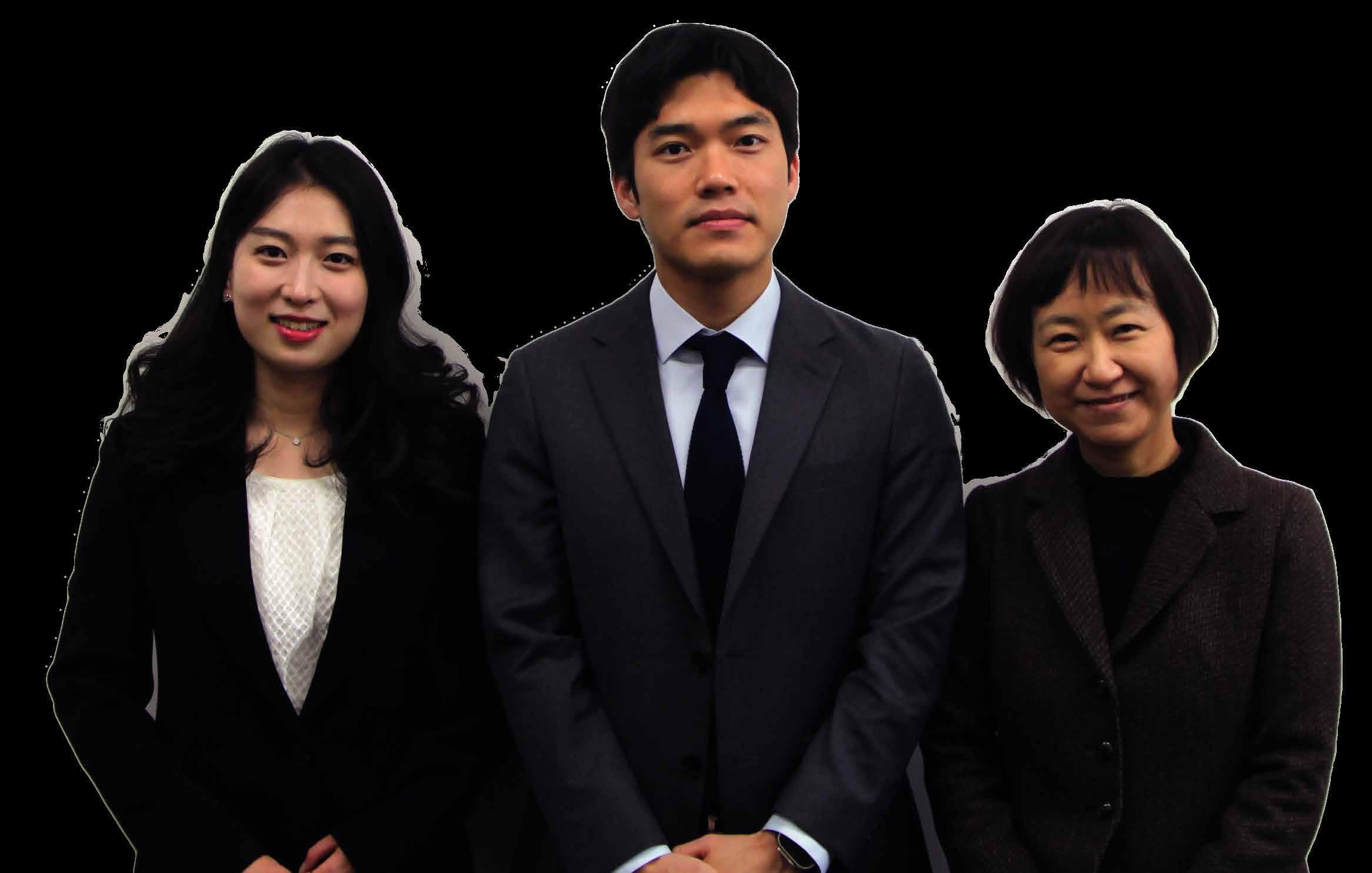
Q: Wow, Iʼve never heard of people who went into the military and came back multilingual.
Suh Hyun: (laughs) Me neither. I just want to warn people that heʼs very exceptional when it comes to studying efficiently. Itʼs not the typical course that other diplomats have followed, so I wouldnʼt recommend trying to follow in his footsteps.
Myoungjin: But I do strongly recommend that students who have to serve in the military try to prepare for those exam requirements during their military service. That would save them a lot of time when they come back to school.
Q: Iʼm sure that youʼll spend many years in the foreign ministry and have very successful careers. But do you see yourself doing something else eventually? And if you do, what might that be?
Myoungjin: I donʼt know how the MOFA works, so Iʼm not sure yet. But I know that many seniors in the ministry move onto working for private enterprises such as Samsung or SK, or international organizations like the UN or IMF by utilizing the specialized knowledge they gained while working for government
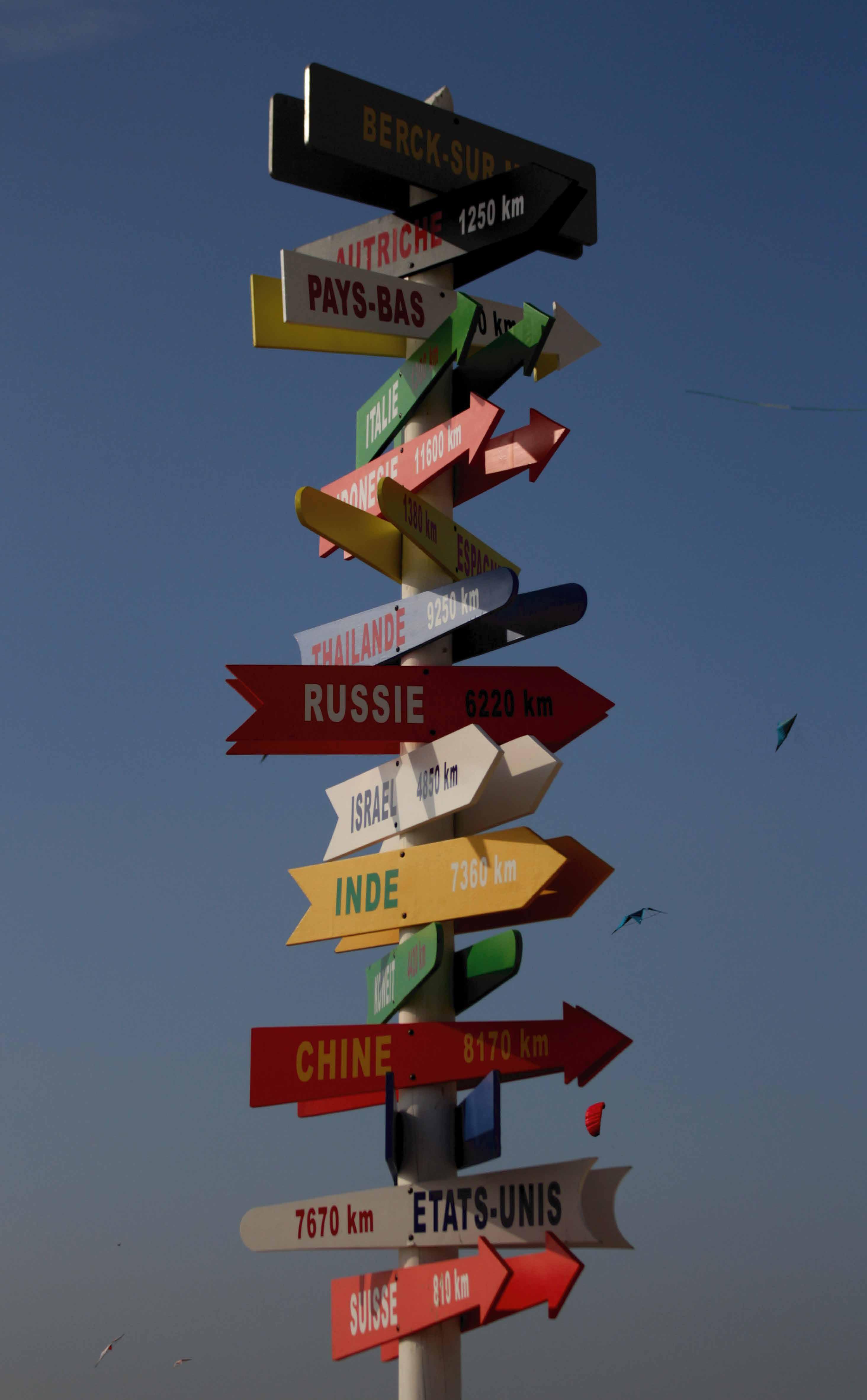

sectors. There are also some diplomats who study abroad in the field of international studies or international law. Iʼll probably continue working as a diplomat if I enjoy my work at MOFA, but if I have to choose, I could follow my seniors down one of those paths.
Suh Hyun: I also don't have a lot of experience working there since I just passed the exam, but I don't think Iʼd quit my job until retirement. But afterwards, Iʼd like to earn my PhD and come back to school and use my experience to teach other growing students with dreams of becoming a diplomat or working in international organizations.
Q: Are either of you thinking of becoming Minister of Foreign Affairs or even UN Secretary-General?
Suh Hyun: (laughs) Thatʼs very far, far away. But since I've passed the exam and this is kind of like a dream come true for me, I donʼt think Iʼll just lay back and enjoy the sunset. Iʼll be working hard in my place within whatever sector Iʼm posted in. Even if I'm posted in a sector I'm not particularly interested in, I think I have the motivation to work really hard because itʼs what I really wanted to do since I was very young. So, regardless of what position Iʼm in in the next 30 or 40 years, I'll be trying to do my best.
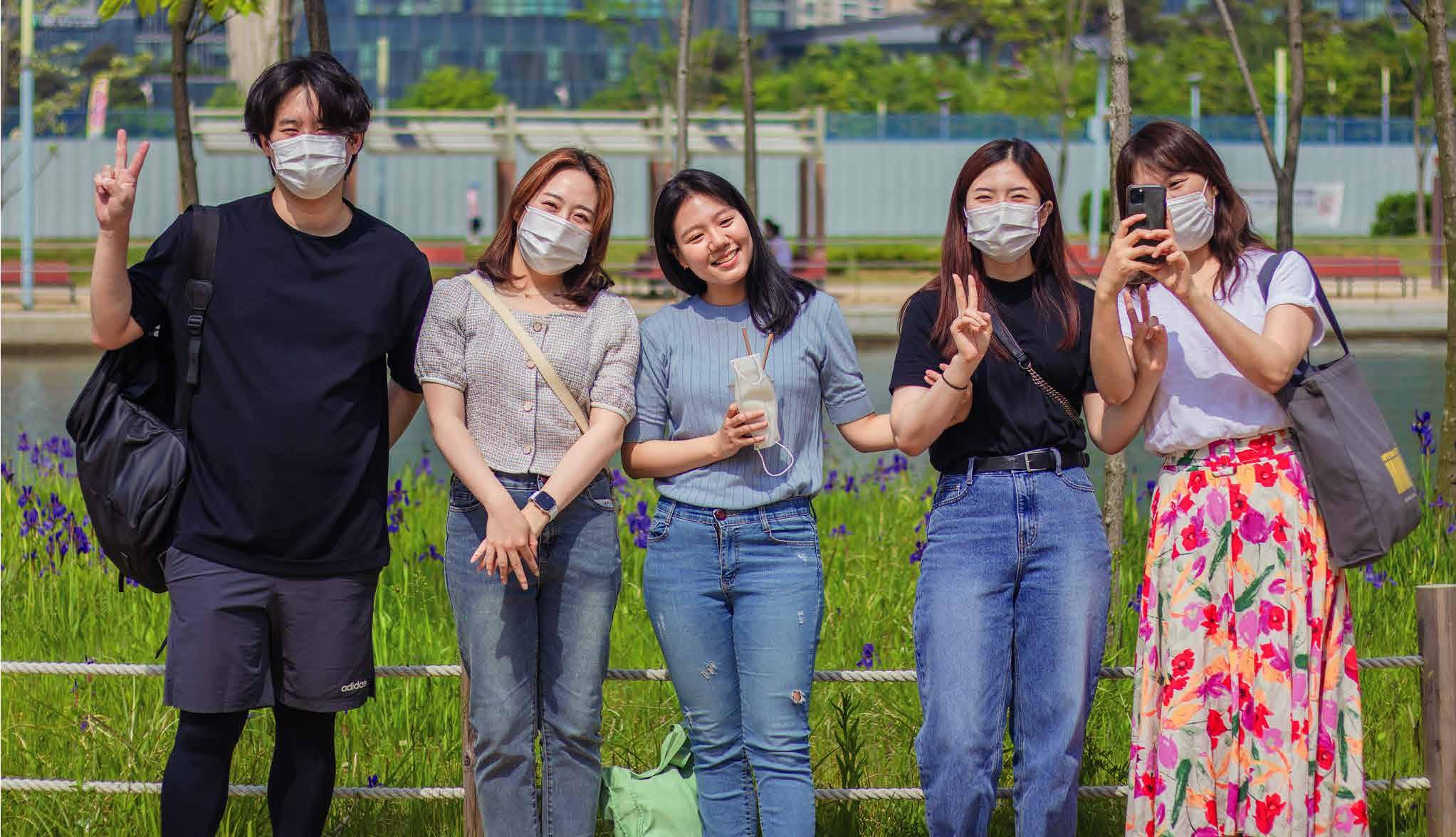
In Spring 2021, UIC began its first graduate program by establishing the Department of Innovation. Preparing students to participate in the Fourth Industrial Revolution, the graduate program of innovation offers a Master of Science (MS) and a PhD in Innovation with three tracks in Design Innovation, Technology Innovation, and Social Innovation. Two graduate students, Kai Meng and Hyojin Lee, discussed their experiences in UICʼs unique graduate program.
Can you please introduce yourselves and explain why you applied to the Department of Innovation
Kai Meng: Hi, my name is Kai Meng, and I am from Beijing, China. I started the Innovation program in the spring semester of 2022. While pursuing my marketing bachelor's degree at Macquarie University in Australia, I completed several case studies that required me to apply the framework of Design Thinking. This strengthened my belief in the increasing importance of advanced technology and creativity when enhancing usability, as well as my interest in new online product development. This motivated me to apply for the Department of Innovation at UIC, which offers me experience in technology from both Korean and other global perspectives. Yonsei University has gained a reputation for being one of Koreaʼs leading universities, and their recent development of the Department of Innovation led to one of the world's most diverse and internationalized college courses, which would equip me with the skills I need to achieve my goals.
Hyojin Lee: Hi, my name is Hyojin Lee, and I am from Seoul, South Korea. I joined the Department of Innovation in the spring of 2021, and this is my fourth and last semester. Iʼm actually one of the first students to join this program. Technology is developing and influencing our lives at a rapid pace, yet there is still a lack of research on how it affects human behavior and perception. In this regard, I am studying Human-Computer Interaction (HCI) and User Experience (UX), with a focus on user experience research. In view of the huge impact of technology on humans and society, my goal is to help guide these advances in the right direction for the better well-being of our society. I am currently affiliated with the Design Experience in Yonsei (DEY) Lab led by Dr. Younah Kang. While there are various approaches to this specific field, this lab introduces a design-oriented approach to pursuing a deeper understanding of users. By adopting a user-centered approach to the design and technology, I hope to provide a solid academic foundation for the digital world and therefore contribute to building a more sustainable society.
What has been the most valuable aspect of your experience at the Department of Innovation
Kai Meng: Looking back on the past semesters, I had the opportunity to strengthen further my Systems, Design, and Computational (SDC) thinking, which I can directly apply to my future professional endeavors. I am very grateful to Professor Younah Kang and Professor Hyun-Kyung Lee for their inspiration and invaluable guidance. I am genuinely thankful for having had the chance to study with such an outstanding faculty. The Department of Innovation offers a uniquely diverse learning environment. I have the opportunity to make new friends from all over the world, allowing me to appreciate a diverse range of perspectives while having the freedom to express my own views. Overall, studying in the Department of Innovation at Yonsei University presents new challenges that encourage me to put my skills to good use by tackling them with positivity and enthusiasm.
Hyojin Lee: For me, the best part of the Innovation program is that I have a wide range of classes that cross various fields. As a user experience researcher, being multidisciplinary is important. This not only helps me come up with more valid and feasible designs, but also expands my thoughts and ideas. By following the three-pillar curriculum consisting of Design Innovation, Technological Innovation, and Social Innovation, I can especially enrich, expand, and diversify my interests and projects. I am currently working on my thesis on the topic of ‘Dark Patterns.’ Dark Patterns refer to digital design patterns that have deceptive or manipulative qualities, which could be disturbing and even dangerous to users. This topic tackles user experience and interface designs in the most basic sense. However, the topic is also deeply rooted in ethical discourse. With its considerable effect on all users–which is practically all human beings now–this is not only the job of the designer but also the responsibility of the technicians who develop services, and of the policymakers who set the baseline and regulate the resulting unethical outcomes.
How do you think your experiences in the Innovation Program will help you in your future career
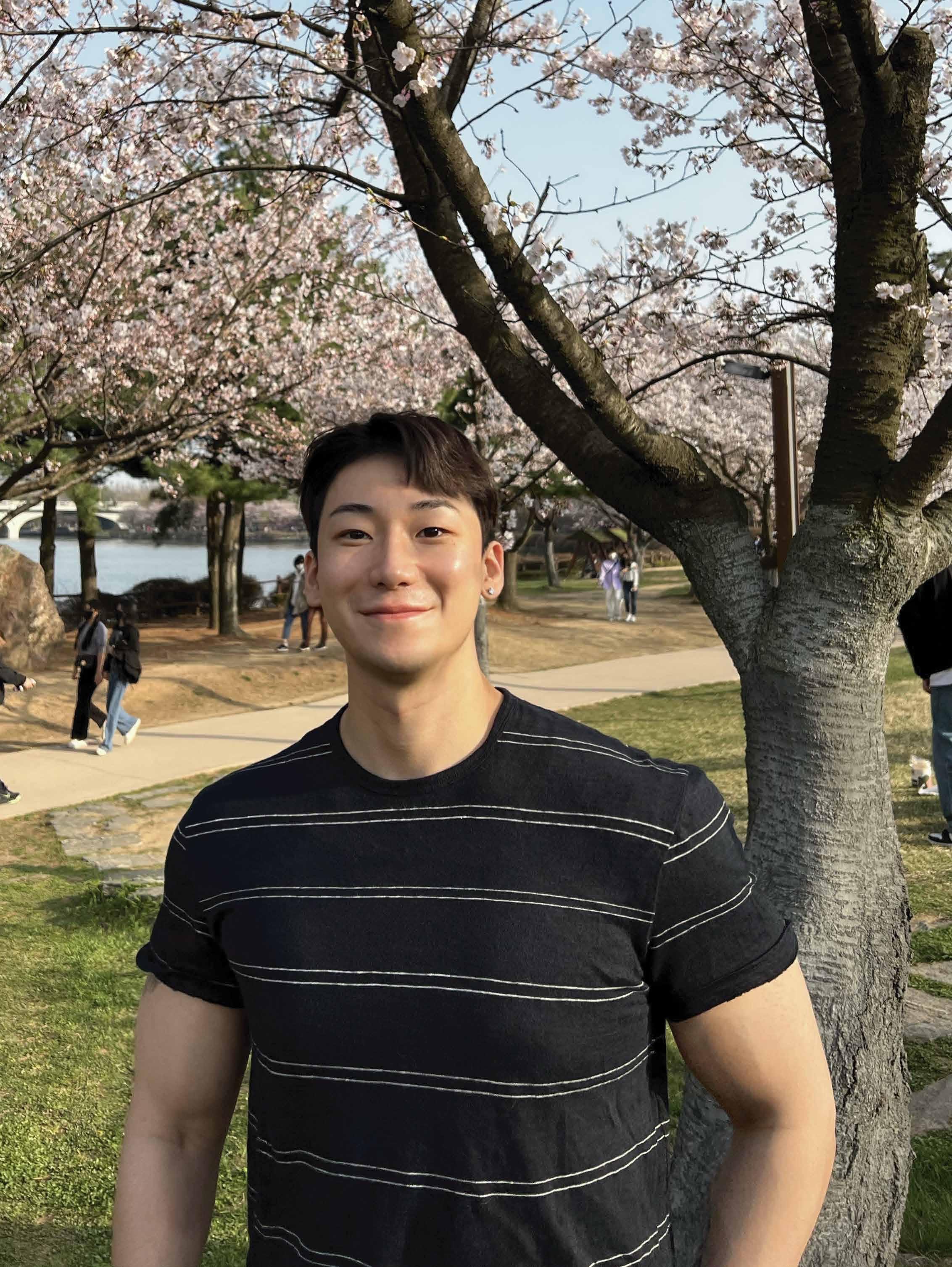
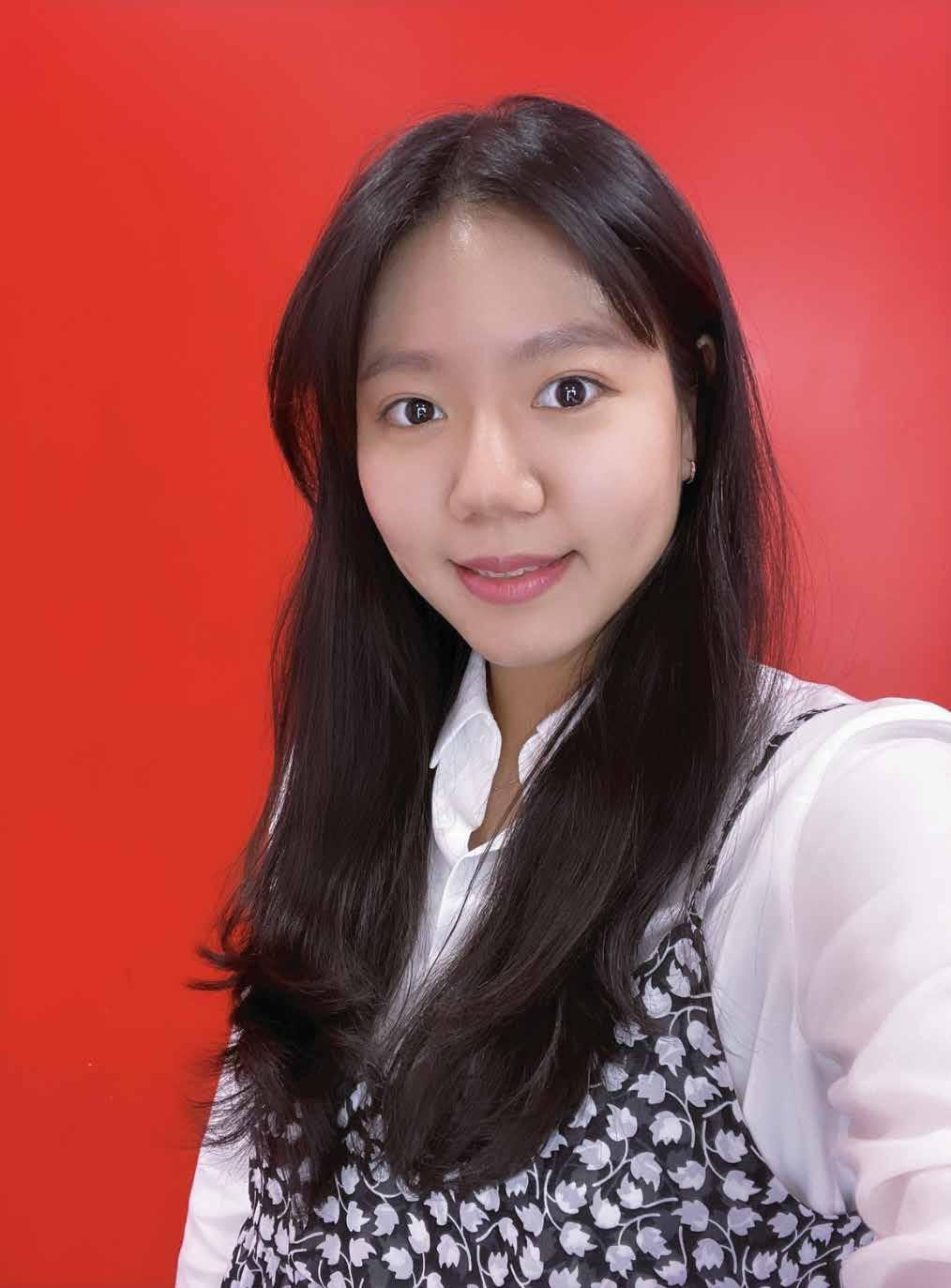
Kai Meng: Based on my past experiences in marketing research and entrepreneurial thinking, I’m determined to become a creative and innovative UX designer. This requires me to truly understand and empathize with customers’ struggles and desires. My coursework and assignments at the Department of Innovation have required me to learn qualitative and quantitative research methods and data mining skills from Python. All of these skills align with and benefit my future professional endeavors.
Alongside my coursework in the Department of Innovation, I was given the opportunity to work as a teaching assistant in Design Factory Korea. This invaluable experience has enabled me to practice multitasking, work under pressure, and enhance my efficiency and concentration skills. I firmly believe that here in the Innovation program, I will continue to develop my entrepreneurial thinking by communicating with a diverse range of professors and classmates.
Hyojin Lee: My primary aim is to tackle a broad range of topics with all technological, social, and design aspects considered. In this regard, I led and participated in several projects throughout the program and enriched my experience and skills. In the project “BeltCompass” where I designed and tested a haptic-based navigational device for the visually impaired, I experienced hardware prototyping using Arduino for the first time. In the project “Ecogram,” I created AR filters and spaces for an immersive experience in designing a metaverse service that would encourage environmentally friendly behaviors. In one of the industrial projects, I also designed a user study experiment using a VR environment as a research method for customer preference evaluation. Such hands-on projects and activities where I could freely propose and conduct my own research introduced me to many new opportunities to expand my skillset as a user experience researcher.
The Innovative Department encourages not only your standard academic achievements but also a wider range of achievements, including practical skills and interpersonal skills of communication, cooperation, and leadership –all of which are qualities that innovators should work on. With the freedom to pursue as many projects as I want, along with the most enthusiastic students and supportive faculties, I could grow to become a capable user experience researcher and a true leader of our society.
Where do you see yourself in the next five years Or what kind of career do you imagine yourself doing
Kai Meng: I would like to gain a deeper understanding of social innovation and sustainable growth. These two values are what successful and innovative companies in the modern world value in their business. My long-term goal is to adapt my father’s family business to perform better in an ever-changing society. I plan to transition it from an offline platform to an online platform, which is necessary for our survival in a digital economy. Also, implementing social innovation and sustainable growth models is essential for our family business to thrive. People are becoming more aware of a company’s social responsibility and the social benefits of its innovations. I hope to implement a business model that addresses customers’ concerns about sustainability and the social and environmental impacts of the products they consume.
Hyojin Lee: As I’ve mentioned, I do have a deep interest in user experience and am willing to pursue a career as a user experience researcher. My general interest lies in understanding people and social phenomena, so I’d prefer to adopt various methodologies in different fields of industry. I am particularly interested in exploring topics that are and would be at the forefront of technological advances. So I might not have a specific field of industry in mind at this very moment. But I do want to work with emerging technologies and their interaction with people and society. At the same time, extensive experience with diverse people and fields have opened my eyes to the many possible opportunities ahead of me. Learning new technologies and adopting new worldviews have changed my perception about myself and the world around myself. At this point, instead of restricting my figure to a certain path, I would like to constantly challenge myself with novel experiences. I am grateful for this program for having opened up so many opportunities and am looking forward to all the fun surprises my future has to offer.
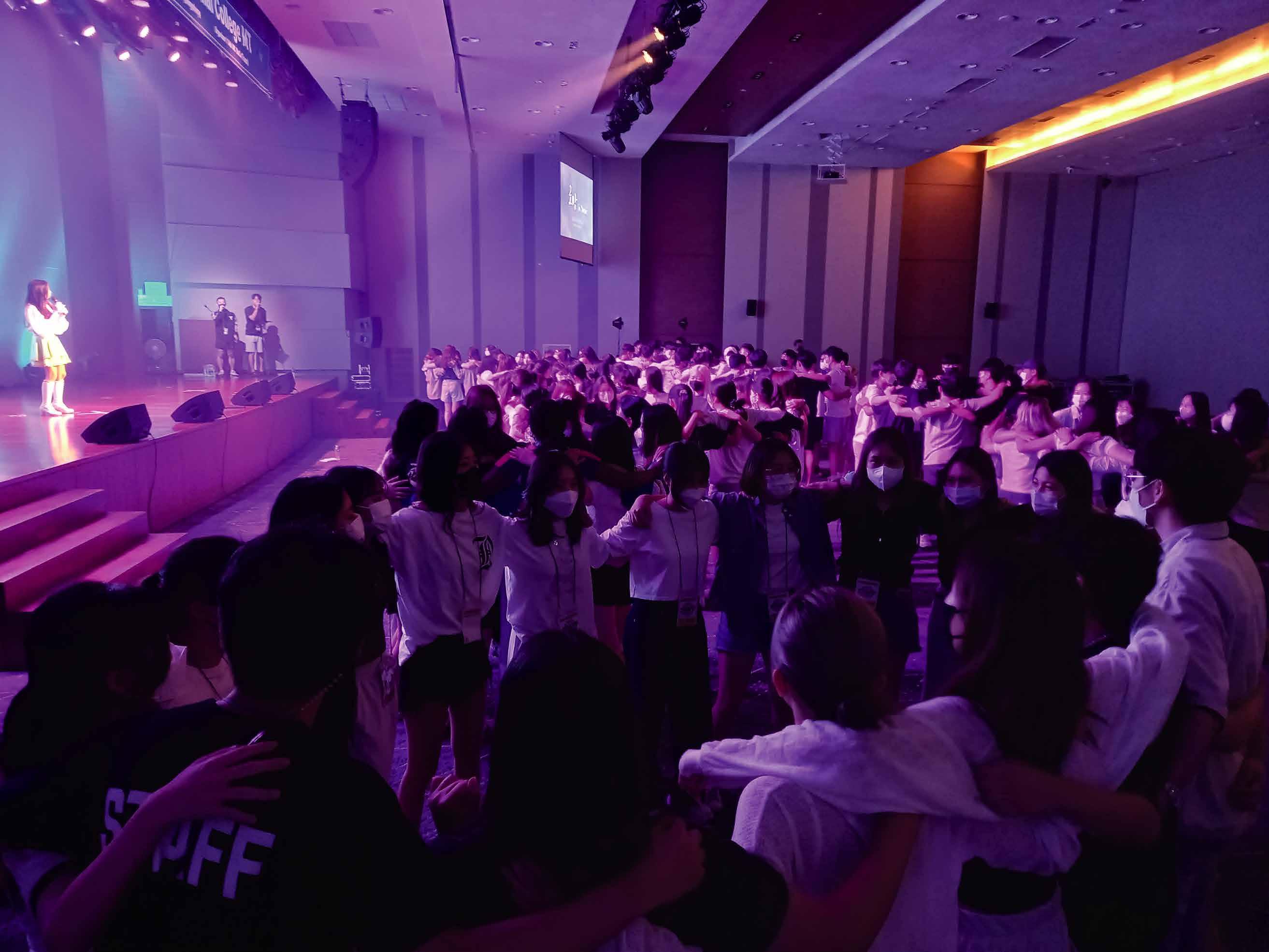
From August 21 to 23, 2022, UIC student council Transit held the first UIC MT in three years at Hanwha Resort in Pyeongchang. Due to the COVID-19 pandemic, students had been unable to participate in the “Pre-Frosh Workshop” that had been traditionally held every winter. However, students were finally able to get their traditional introduction to university life and culture. Transit sought to reinvigorate UIC culture through programs such as the Akaraka Cheering OT, mini-games, and diverse group activities. Around 180 students in total were accompanied by seven professors, with an emphasis on safety and comraderie.
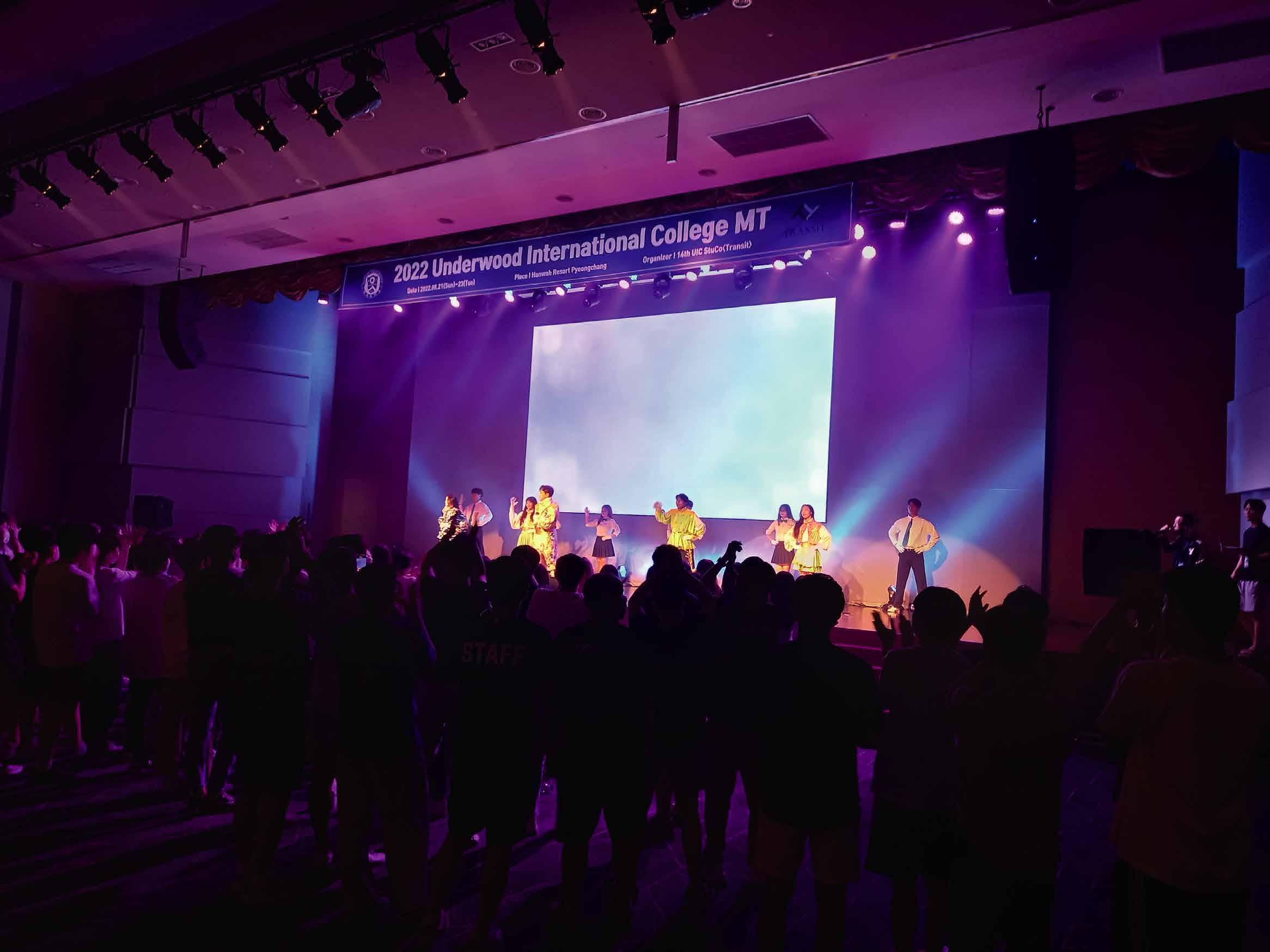
Two UIC students won prizes at the 18th Korea Times English Economic Essay Contest. Focusing on topics regarding financial companies, MZ generation customers, and ESG (Environmental, Social, and Governance) issues. Kim Ju-hyuk (Econ/CLC) won the Grand Prize award and Ju Young-Jin (IS/Econ, ʼ19) won a runner-up award.
Can you please introduce yourself?
Youngjin Ju: My name is Youngjin Ju, but I often go by Linda. I am a class of 19 UIC student double-majoring in International Studies and Economics. Although Iʼm Korean, I spent a few of my childhood years abroad in the Philippines, where I studied in an international school with a diverse student body. Iʼm passionate about creative dancing and Iʼm currently in HARIE, a dance club at Yonsei.
Ju-hyuk Kim: My Korean name is Ju-hyuk Kim, but everyone calls me Josh. I am in the class of 22 and my major is International Studies. Though I was born in Korea, I have lived in Canada since I was two. Iʼve played sports all my life and Iʼm a competitive athlete.
Congratulations on winning the awards for your essays! How would you describe your essay and your inspiration for writing it?
Ju-hyuk Kim: Initially, I was conflicted about which topic to write about. The first prompt was: ‘What can banks do to attract young people?ʼ and the second prompt was, ‘How can banks adapt to using ESG practices?ʼ After switching back and forth multiple times, I finally decided to combine the two prompts in a way that made the second prompt an extension of the first, and so my topic became ‘How can banks use ESG practices to attract young people?ʼ My inspiration was that I knew Woori Bank was sponsoring this event, so I felt that the essays could be used to the bankʼs advantage. With that in mind, I wrote my essay in a way that addressed Woori Bank and provided them with a solution of how they could use ESG practices to attract customers from the MZ generation.
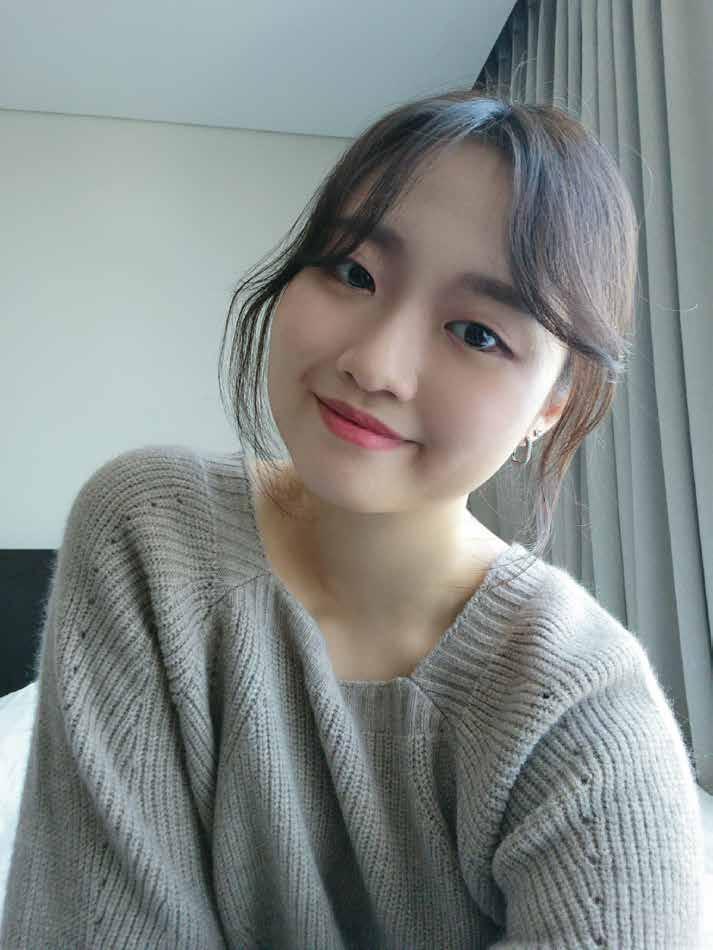
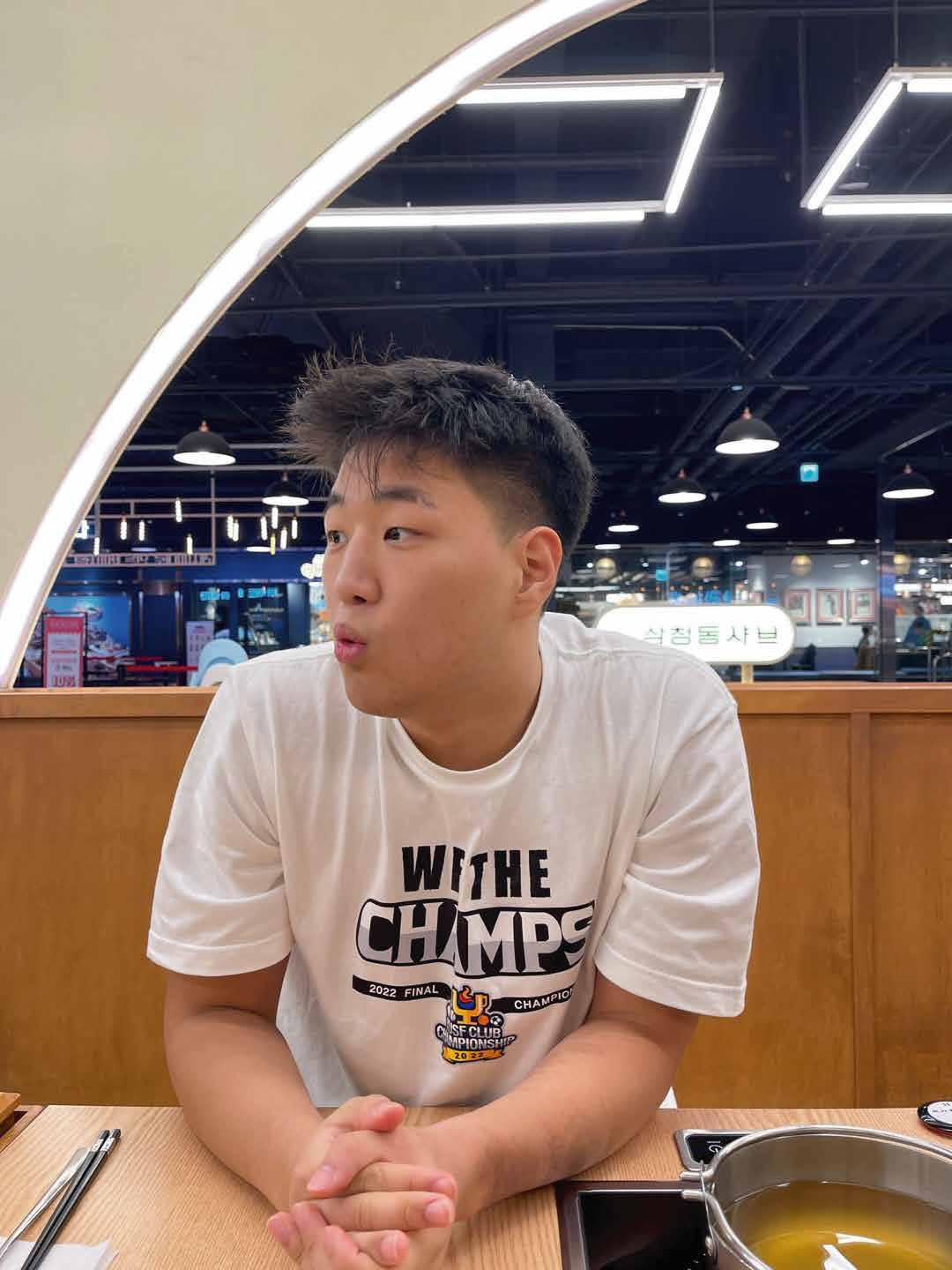
Youngjin Ju: Among the two topic options, I chose to write about the strategies that financial companies should adopt to attract the MZ Generation customers. I was inspired by a marketing educational session I had attended where I analyzed marketing trends on online platforms. My detailed study of the Chinese market and the MZ Generation gave me ideas on how to build the framework for my overall essay. Therefore, after analyzing the MZ Generation and their tech-savvy behavior, I linked those tendencies with social issues in the financial field, such as the overflow of misleading or unverified information and an insufficient financial education. Supporting my thesis with precise numbers and statistics, along with a case study of a Korean financial company, I concluded the essay with recommendations on solutions and strategies financial businesses must consider adopting to better the status quo.
Why do you think your essay won this award?
Youngjin Ju: I never imagined my entry winning any award—I guess luck played a small role in it! I tried as much as possible to make my writing simple but informative. Maybe the carefully-constructed analysis worked, or maybe the reasonable and evident solution I provided in my essay was the winning factor. I am not sure why I won, but I certainly had some good luck on my side.
Ju-hyuk Kim: I believe the simplicity and concision of my essay played a role in qualifying it for the grand prize. In my freshman year at UIC, I had the privilege of taking two of Professor Tanvi Solankiʼs classes, where I learned how to brainstorm ideas, write clear and concise essays, and formulate a powerful thesis. Also, when reading my competitorsʼ essays, I thought their essays highlighted the negative aspects of the MZ generation, but in my essay, I extolled the MZ generation and their resilience, and how ESG practices could actually be used to attract them.
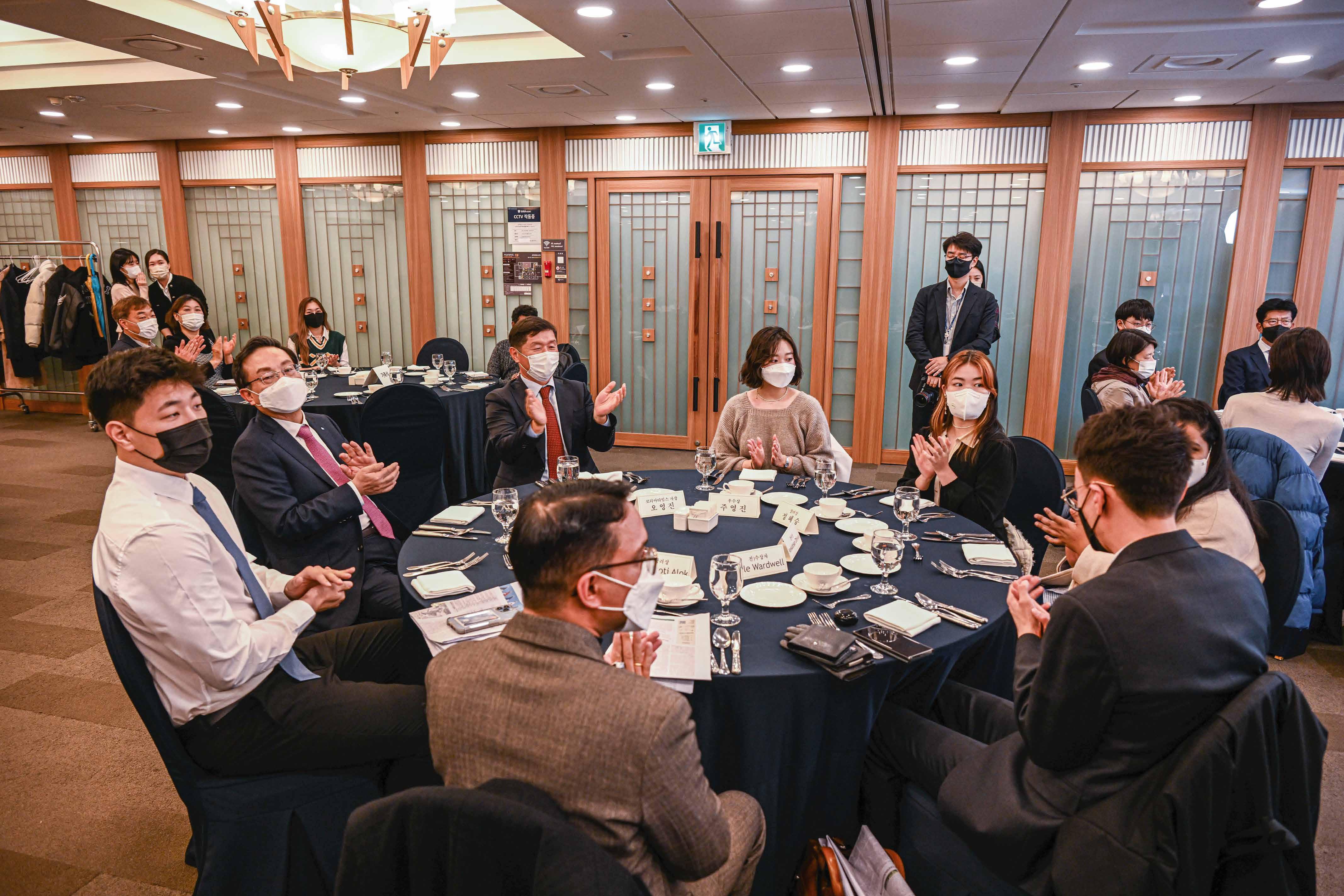

What have you learned from this process?
Youngjin Ju: I never really had an interest in finance. Unlike my friends and most of the MZ generation, I had never invested in stocks. However, writing this essay led me to study more about finance, and I now find economics to be an intriguing field of study. It is rigorous—yes, perhaps even boring, but itʼs mysteriously attractive. So my big takeaway from this entire experience was that: the hunger to learn more about economics.
Ju-hyuk Kim: Through this opportunity, I actually learned about ESG practices. Prior to writing my essay, I did not know that something like ESG even existed. Hence, I was discovering ESG, even while explaining the aspects of ESG practices. Overall, I believe I learned how to research better and learn on the go.
Was there an award ceremony and what was it like?
Ju-hyuk Kim: The award ceremony was very professional. I liked how every winner was given flowers, a chance to introduce themselves, and share their experiences with everyone else. I will remember my conversation with the CEO of Woori Bank, the laughs I shared with the chairman of the Korea Times, and the introductions amongst the winners. It was an amazing experience and one that I will always cherish.
Youngjin Ju: The ceremony was held alongside an 'Alumni Nightʼ and the winners were awarded with plaques, prizes, bundles of flowers, and also treated to a luxurious full course dinner. The former winners of the contest were also invited to celebrate, and I was able to meet a few fellow UIC students as well. As the people gathered were all talented and skilled, it was a great opportunity to network. I happened to sit next to the Korea Times President-Publisher and the Woori Financial Group CEO and had conversations with them.
What are your future plans both at UIC and after you graduate UIC?
Youngjin Ju: As an ambitious person, I have many things planned for my future. I would like to learn a new foreign language, develop analytical skills, and deepen my academics interests—especially in my second major of Economics—during my remaining semesters at UIC. In the long term, I would like to dedicate myself to making positive changes in the international community and to helping those in need. While I do not have a distinct destination in mind for a career, I am more than thrilled to rock with the wild waves on a journey pursuing my passions.
Ju-hyuk Kim: My future plans at UIC is to join the student council, find a major I would be passionate to double major in, and just enjoy my journey. I believe university is a great place where you can make friends, find yourself, and, most importantly, it is the last place where you can be anything and anyone before the real world kicks in. So, while at UIC, I want to play sports, meet more cool people, and enjoy this short time of being a student, a child, and an adult in one. After graduating, I hope that I have a job or a great internship lined up for me. I am all for higher education, however, I want to start making money and hope to help my parents retire as soon as possible, so Iʼll have to see what the future has in store for me.
“...my big takeaway from this entire experience was that: the hunger to learn more about economics.”
UIC alumnus Daniel Hyunkyu An (AS, ʼ12.5) established VLEES, an African-centric food company. After growing up in various locations throughout Africa, Daniel graduated from UIC and pursued his dream of introducing African food culture to Koreans. He shared some of his experiences and lessons learned in a brief interview.
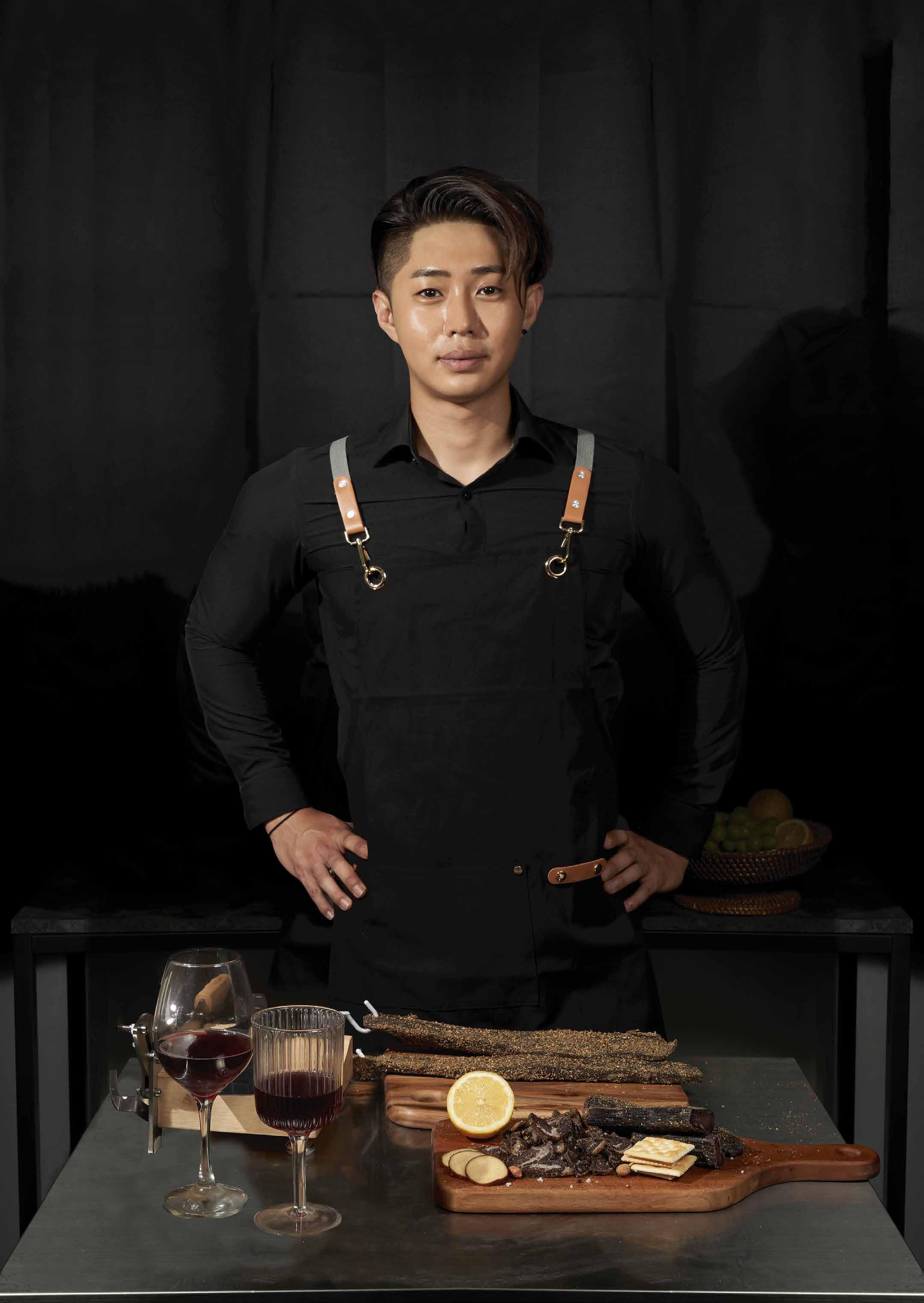
Q: Can you please introduce yourself?
Hi, my name is Daniel Hyunkyu An, and I majored in Asian Studies (AS) at UIC in the class of 12.5. I was born in Dakar, Senegal, but grew up in several different regions like Togo, Benin, Mali, South Africa, and Tanzania throughout my adolescence. Simply put, Iʼm a lot more African than Korean. Shortly after graduating high school, I first went to Canada to study medicine for a year, but I re-enrolled at Yonsei as an AS major in 2012. I finally graduated college after nine long years, in February 2021. It took me a lot longer than others because I got married at 22 and my mother suffered a stroke that left half her body paralyzed while I was still in school.
Q: Can you please describe your company in terms of its objectives, its current state, and your future plans?
After graduating from UIC, I founded VLEES to introduce African food culture through meat snacks. Iʼm planning on diversifying our current product lineup next year and expanding into the sauce, wine, and chicken sectors in the next three years for the F&B (food and beverage) business. As for the grand scale of things, Iʼm hoping to expand into African fashion, African import and export, and the African tourism business in the next five years. You can visit my website to learn more about it: www.africainkorea.com
In March 2022, I officially became part of the Korea SMEs and Startups Agency (KOSME) network, which is a non-profit, government-funded organization to grow SMEʼs (small and medium enterprises) and I received a $75,000 government grant to accelerate my business. I also recently received an additional grant of one million won from the SME Corporation department. I recently participated in the COEX Food Week in 2022, where I received several partnership offers from big companies such as Market Kurly, Hyundai, Shinsegae, Lotte, and AK Plaza, to name a few. Iʼve also started supplying my products to a VIP Cigar Bar called Resolver (Cheongdam) since November 2022.
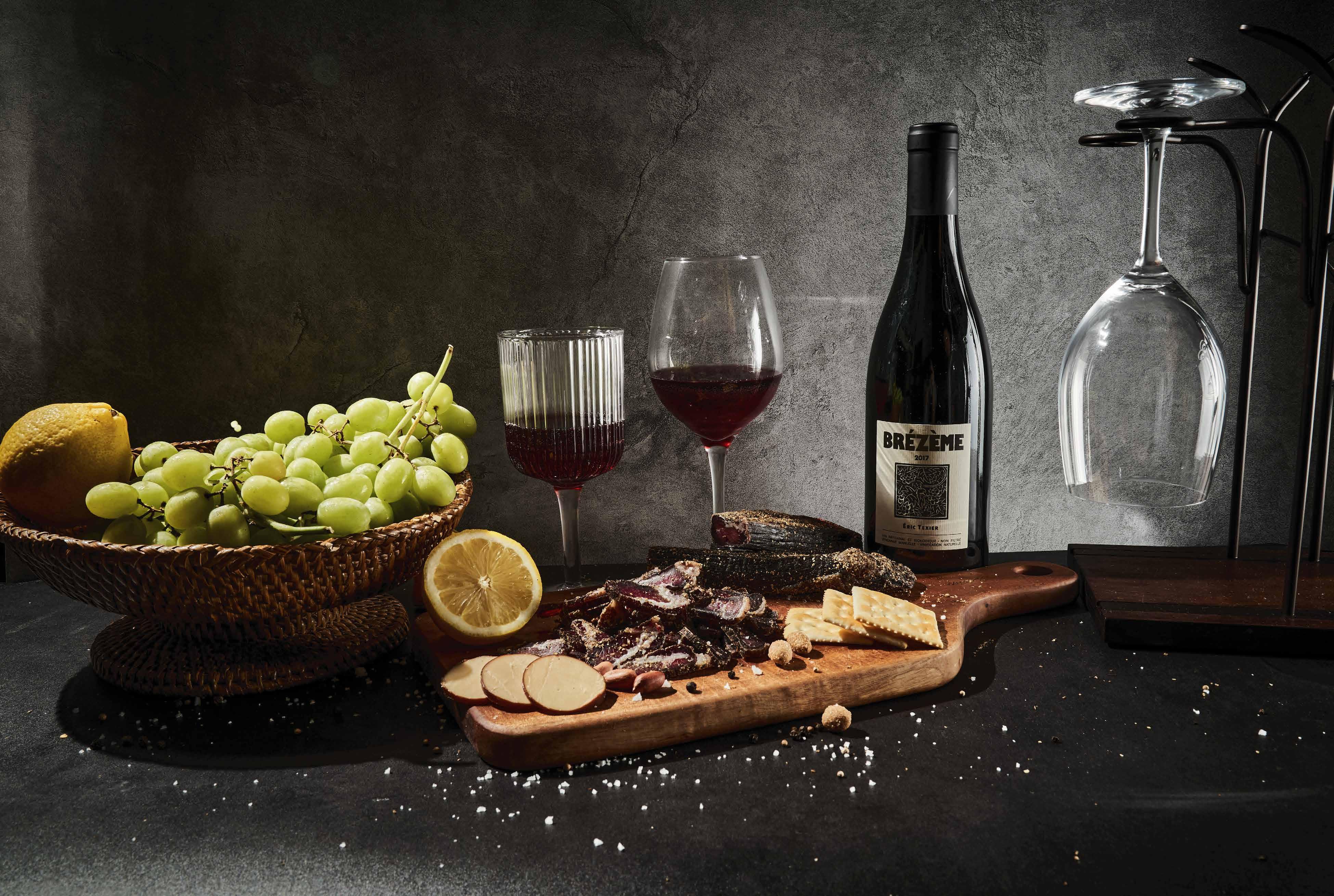
Q: How did you first get the idea to start your company?
After graduation, I received a couple of offers from SMEʼs and other global companies, but the experiences I had at the time helped me realize that I wouldnʼt ever be fully satisfied with helping to achieve someone elseʼs dream. So, I decided to pursue my own. My goal has always been to bring Africa to South Korea. I missed African snacks, which I couldnʼt find anywhere in Korea. I saw an opportunity there that lined up with my goals and values, so I took my first leap of faith last year.
Q: What has been the most difficult and the most rewarding aspects of building your own company?
When working as an employee in a company, your job is focused on one sector of the business, like sales or human resources, which inevitably limits your potential to grow within the boundaries of that sector. And your salary is handed to you after tax deductions, so everything is made simple for you and life is easy. As a CEO, life is a lot harder, but exponentially more fulfilling. Working as CEO of my own company, I needed to understand all of the different sectors that existed and to have at least a basic level of knowledge of each sector. For my business, I had to understand product development, research and development, design, photography, videography, product description, page-building, marketing, online and offline distribution, sales, taxes, and finance. Learning is very hard, but I have found that it is always 100% worth it at the end.
Q: In terms of your personal or career journey, where do you see yourself five years from now? Do you have a long-term personal vision or goal in mind for the next ten or twenty years?
In five years, I want South Koreans to remember my name when they think of the word ‘Africa.ʼ
Q: If you were standing in front of current UIC students, do you have any specific advice for them while they are at UIC or for their immediate post-graduation lives?
Learn things you are passionate about, whether itʼs photography, videography, editing, vlogging, streaming, playing games, programming, marketing, or any other thing that your parents might tell you not to do, because they canʼt see a bright enough future down that path. If you see something that others donʼt, just do it – Nike style – and prove it to them. But most importantly, prove it to yourself. That sense of satisfaction and confidence you feel at the end is priceless. Life really is a marathon. Iʼve seen a lot of friends sprint and get burned out, or get injured both mentally and physically. A few of them arenʼt in the game anymore. Make sure to find a healthy pace and reward yourself every now and then.
Among its many career talks, the UIC Career Development Center invited back UIC alumni to discuss their careers and life lessons in a series of talks to current students.
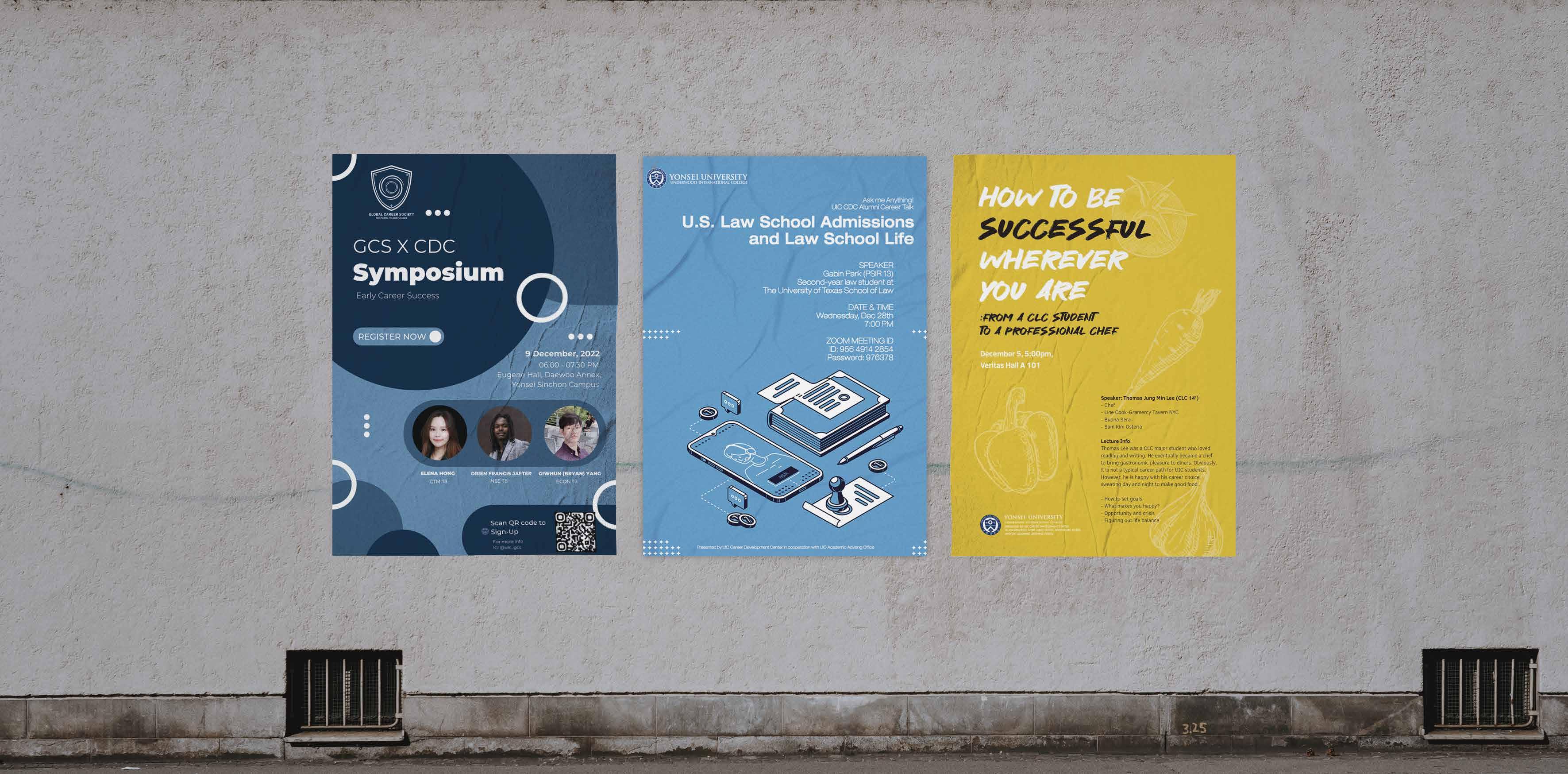
by Thomas Jungmin Lee (CLC ‘19)
On Monday, December 5th, 2022, Thomas Jungmin Lee, a Gangnam pizzeria chef and UIC graduate (CLC, ‘19), gave an Alumni Career Talk, titled “How to Be Successful Wherever You Are,” at Veritas Hall A in Songdo campus. The talk introduced his atypical career path as a chef, and offered insight on how to make career choices that are right for yourself. Topics addressed included setting goals, finding what makes you happy, seizing opportunities and overcoming crises, and figuring out balance in life.
Thomas Jungmin Lee (CLC, ‘19) is currently working at a pizzeria in Gangnam, and he was formerly a line cook at various establishments including the Gramercy Tavern NYC, Buona Sera, and Osteria Sam Kim. His current interests are exploring other culinary fields besides fine dining, in the hopes of making food for the general public instead of a select group of people. His ultimate goal is to open his own restaurant and create his own recipes instead of simply following other peopleʼs recipes.
by Gabin Park (PSIR, ‘13)
On Wednesday, December 28, 2022, Gabin Park, graduate student at the University of Texas School of Law and UIC graduate (PSIR, ‘13), gave an Alumni Career Talk, titled “U.S. Law Schools Admission and Law School Life,” via Zoom. The talk addressed various topics regarding the admissions process to U.S. legal education, including studying for the LSAT, writing personal statements, and an overview of the first-year law school curriculum. The talk also included a brief introduction to the legal career in general.
Gabin Park (PSIR, ‘13) is a second-year student at The University of Texas School of Law. She will be working as a summer associate at a law firm in Dallas in May 2023.
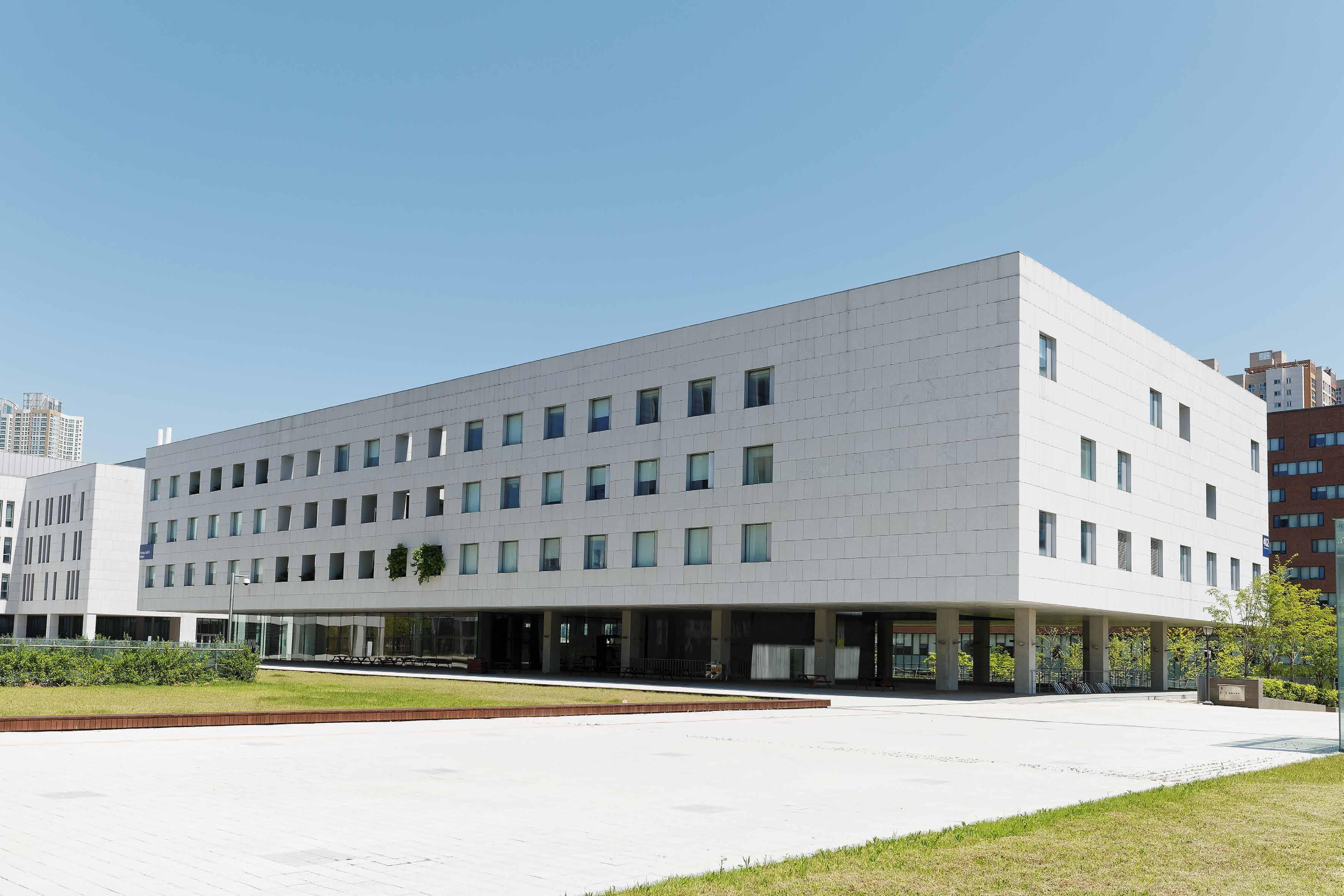
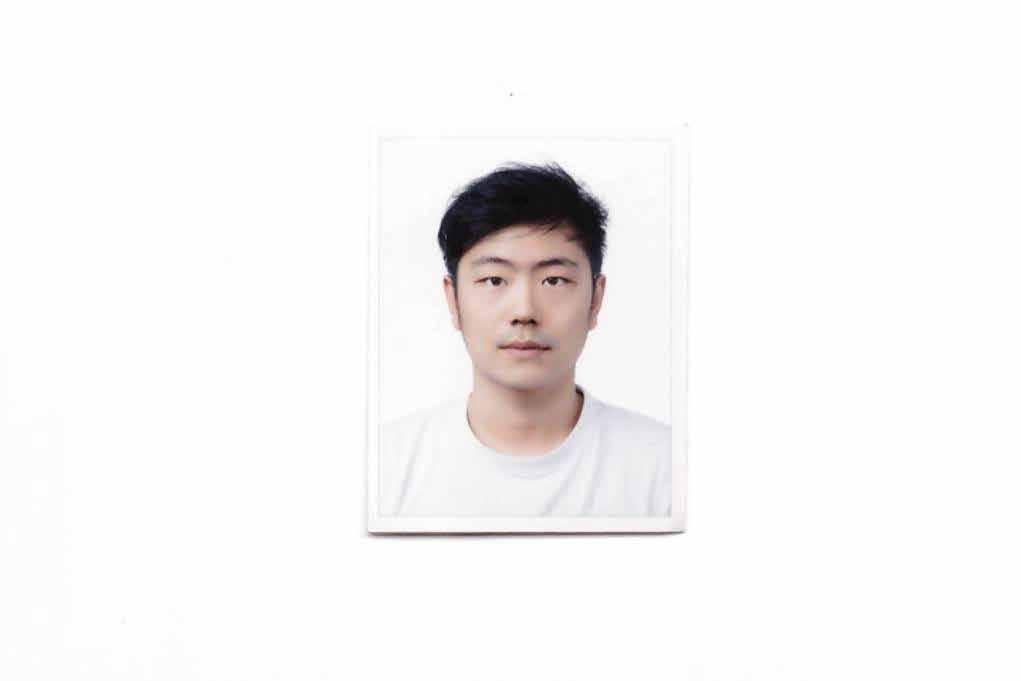
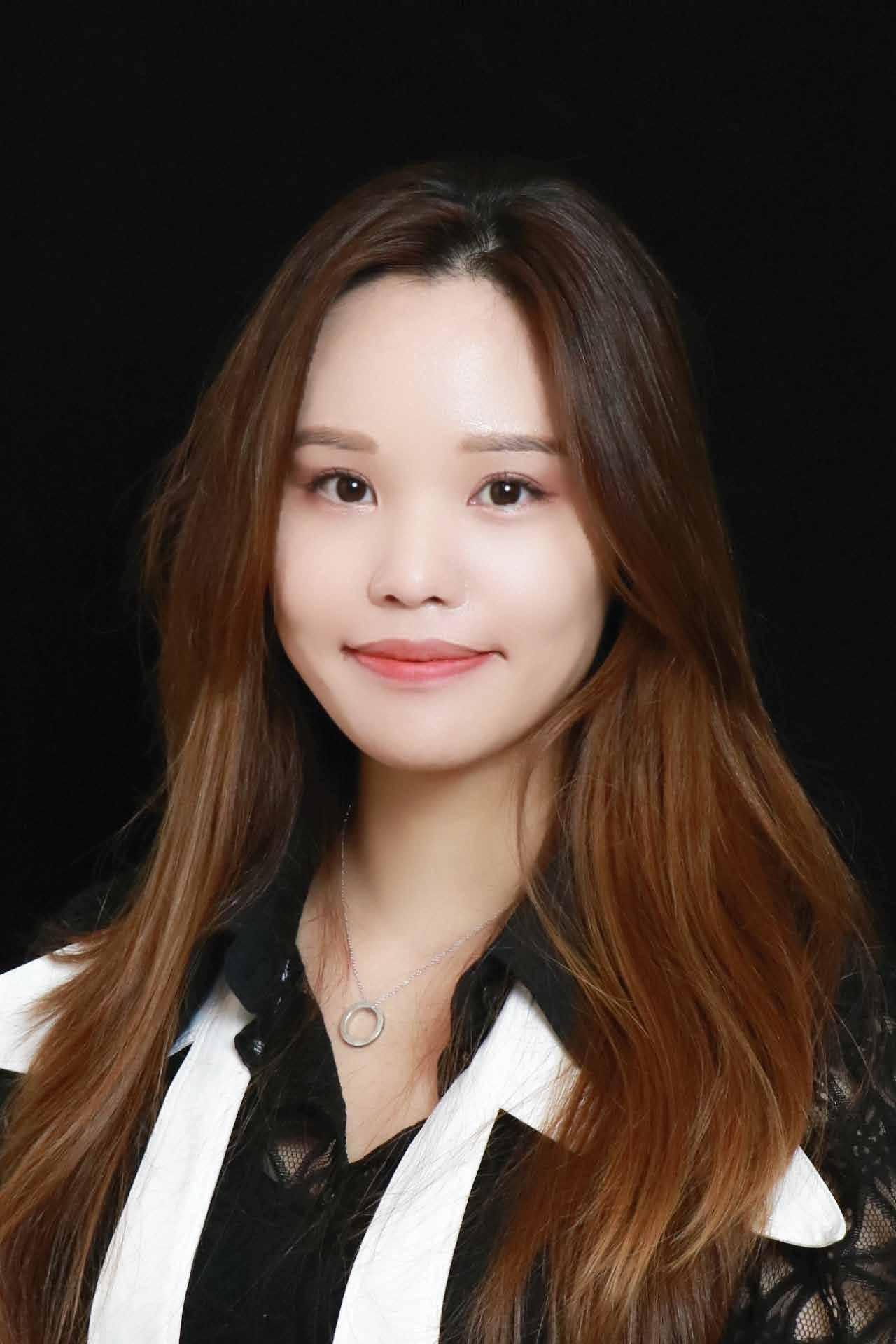
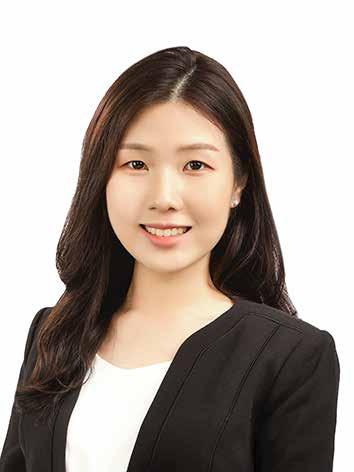
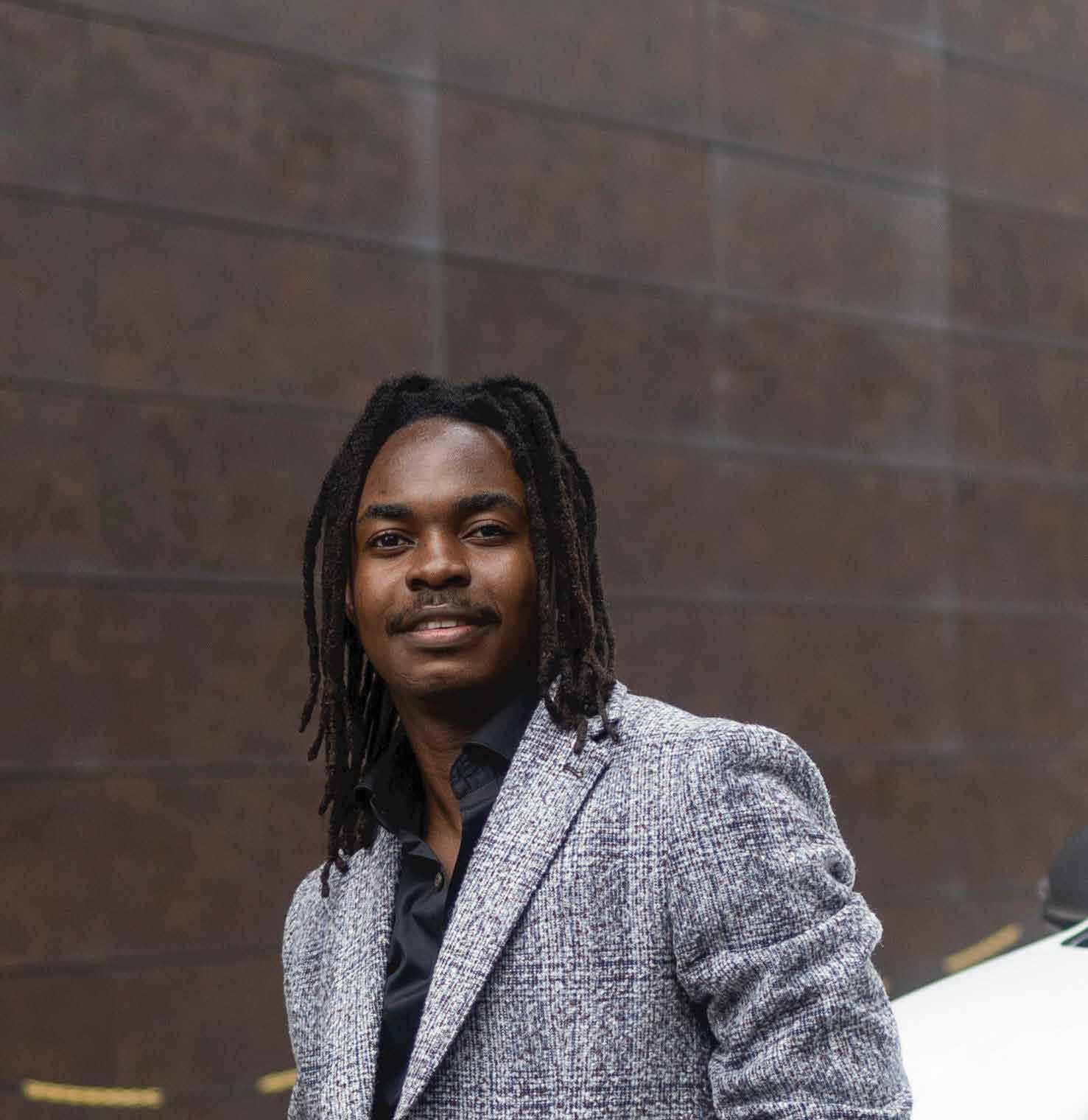
On Friday, December 9, 2022, the UIC Global Career Society (GCS) and Career Development Center (CDC) held a joint symposium, titled “GCS-CDC Early Career Success Symposium,” at the Eugene Lounge at Daewoo Hall Annex. At the symposium, three prestigious UIC alumni from diverse paths including Elena Hong (CTM, ‘13), Giwhun Bryan Yang (Econ, ‘13), and Orein Jafter Francis (NSE, ‘18), shared their experiences with utilizing career resources at UIC in addition to providing advice for career development in general. The event was an opportunity for students eager to improve their career path as undergraduates.
Elena Hong (CTM, ‘13) is currently working as Marketing Programs Manager, Ads Scaled, at Amazon APAC, and is former Sr. Campaign Planning Manager at British American Tobacco and Intl' Management Trainee at P&G across Singapore, Indonesia and
Giwhun Bryan Yang (Econʼ13) worked as an Equity Sales trader at JPMorgan prior to his current job as a Credit Suisse Associate Equity Sales trader.
Orein Jafter Francis (NSEʼ18) is an aspiring frontier science consultant and technopreneur with over two years of experience in Green Chemistry, Soft materials research, and startup management. As a Nanoscience Engineer and NanoBiomedical Engineering Mastersʼ student at Yonsei University, Orein's interests primarily lie in the impact and role of Nanobiomedicine and Technopreneurship in creating sustainable innovations and business opportunities on the African continent.
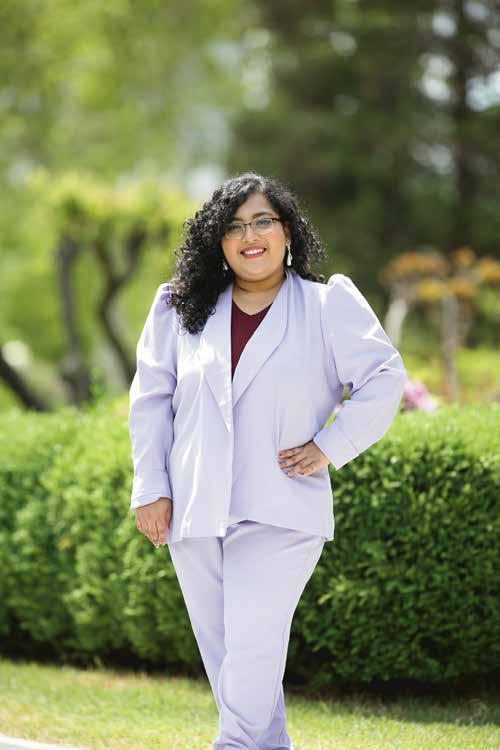
A recent UIC graduate, Farah Aziz Annesha (LSBT/CLC, ʼ18.5), won this year's IASD (International Association for the Study of Dreams) inaugural DEI (Diversity, Equity, and Inclusion) Student Research Award with her work “Swapnorajya: A Tale of Birth Dreams in Bangladesh.” An ethnographic research study of birth dreams (taemong) in Bangladesh, Annesha collected conception/birth dreams from Bangladeshi expectant mothers and interpreted the dreams based on Bangladeshi cultural, religious, historical and cross-cultural contexts. Swapnorajya was also selected as runner up for the IASD Ernest Hartmann Student Research Award in the Qualitative category. Farah Aziz Annesha is currently working towards a career in science writing and is applying to several graduate schools for Science Writing/ Medical Journalism/ Science Communications.
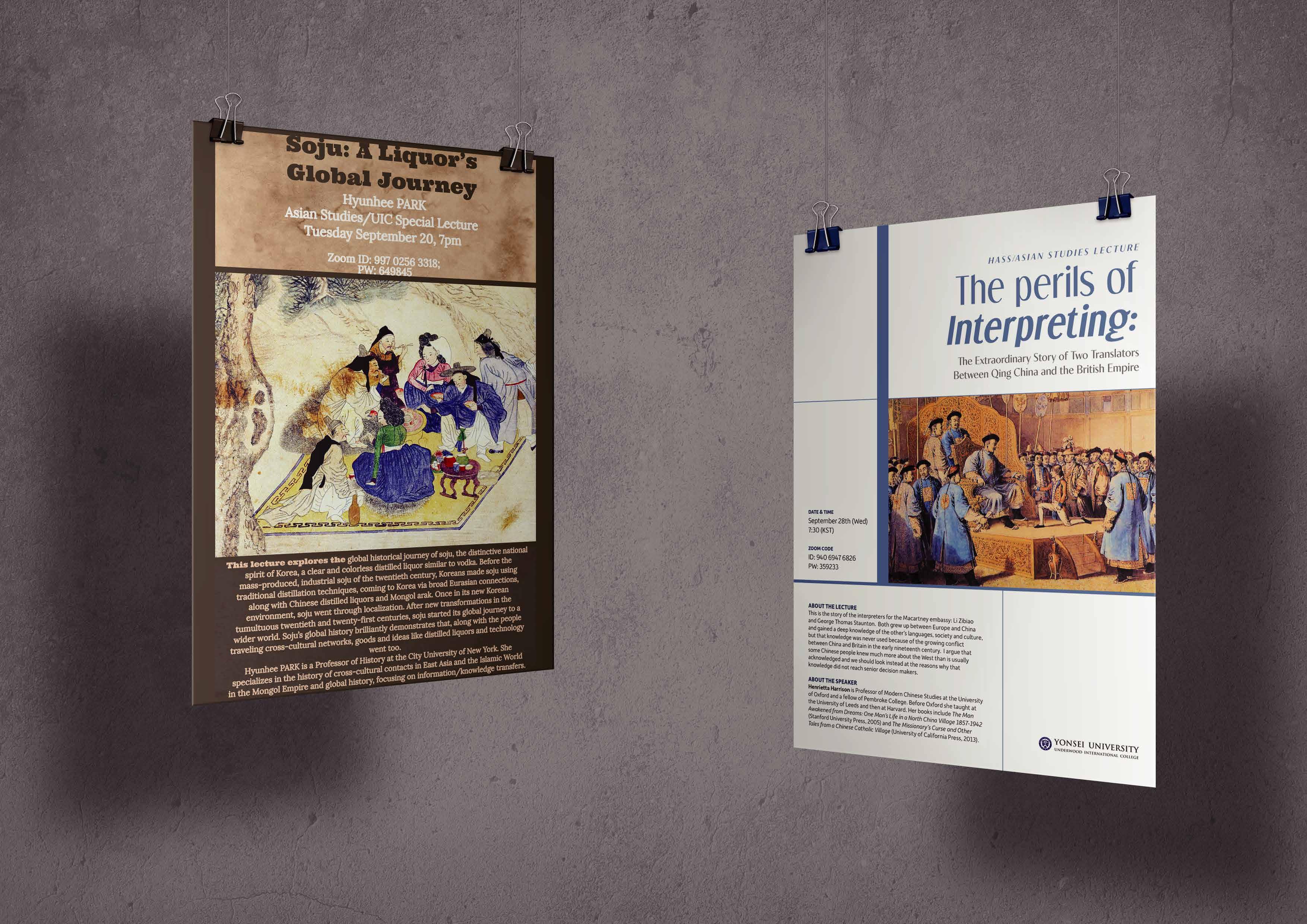
On September 20, 2022, Professor Hyunhee Park, Professor of History at the City University of New York, presented a special lecture on the global history of soju. Her lecture explored the historical journey of soju, a clear and colorless distilled liquor similar to vodka, that is now known across the world as the distinctive national spirit of Korea. Before the mass-produced, industrial soju of the twentieth century, Koreans made soju using traditional distillation techniques imported via Eurasian connections, along with Chinese distilled liquors and Mongol arak. Once in its new Korean environment, soju went through localization, and was globalized as a traditional Korean drink in the twentieth and twenty-first centuries. The global history of soju demonstrates that goods and ideas like liquor and technology travel, along with the people, across cross-cultural networks.
The Perils of Interpreting: the Extraordinary Story of Two Translators Between Qing China and the British Empire
On September 28, 2022, Professor Henrietta Harrison, Professor of Modern Chinese Studies at the University of Oxford and fellow of Pembroke College, presented a special lecture on the interpreters of the 1793 Macartney Embassy. In her lecture, Harrison told the story of Li Zibiao and George Thomas Staunton, interpreters for the Macartney embassy. Both grew up between Europe and China and gained a deep knowledge of the otherʼs languages, society and culture, but that knowledge was never used because of the growing conflict between China and Britain in the early nineteenth century. She argued that some Chinese people knew much more about the West than is usually acknowledged, and that we should look instead at the reasons why that knowledge did not reach senior decision makers.
Professor John M. Frankl, professor of Korean and Comparative Literature, recently published his translation of Kyounghoon Leeʼs work, A Cultural History of Modern Korean Literature: The Birth of Oppa (Lexington Books).
Written by Prof. Kyounghoon Lee, a professor in the Department of Korean Language and Culture at Yonsei University, A Cultural History of Modern Korean Literature: The Birth of Oppa examines Japanese colonialism and modernity and quotidian aspects of life in Korea. In his work, Kyounghoon Lee delves into a series of significant literary, cultural, and historical texts to trace the transformation of national and cultural identities through the forces of modernity and colonialism. Leeʼs depiction of the complex relationships between Korea, Japan, and the West in the first half of the twentieth century offers insight into the origins and development of modern Korea. This work by Kyounghoon Lee was selected as an outstanding work in 2004 by the National Academy of Sciences in South Korea.
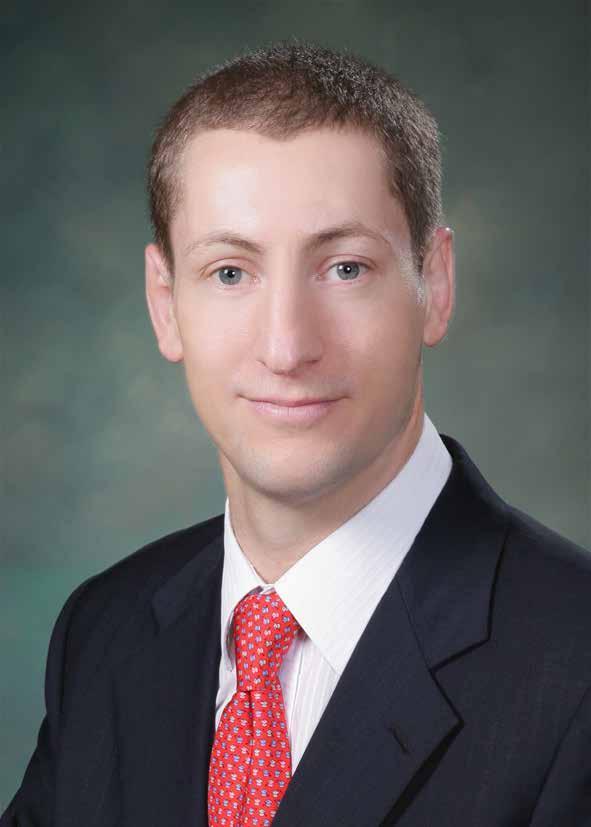
Professor Michael L. Ratnapalan, Associate Professor of History, recently published his monograph, Robert Louis Stevenson and the Pacific: The Transformation of Global Christianity (Edinburgh University Press). In Robert Louis Stevenson and the Pacific, Michael L. Ratnapalan examines major Scottish writer Louis Robert Stevenson through the lens of Pacific cultural and historical frameworks and hitherto unexplored religious contexts. Ratnapalan re-orients the intellectual biography of Robert Louis Stevenson by presenting him in the distinctive cultural environment of the Pacific. He considers Stevensonʼs legacy with respect to issues of indigenous sovereignty and agency in the context of inculturation, defined as the emergence of Christianity from within a particular culture rather than imposed on it from outside. Through interdisciplinary scholarship, the book offers an insightful connection between nineteenth-century Scottish literature and the modern anthropology of Pacific Christianity.
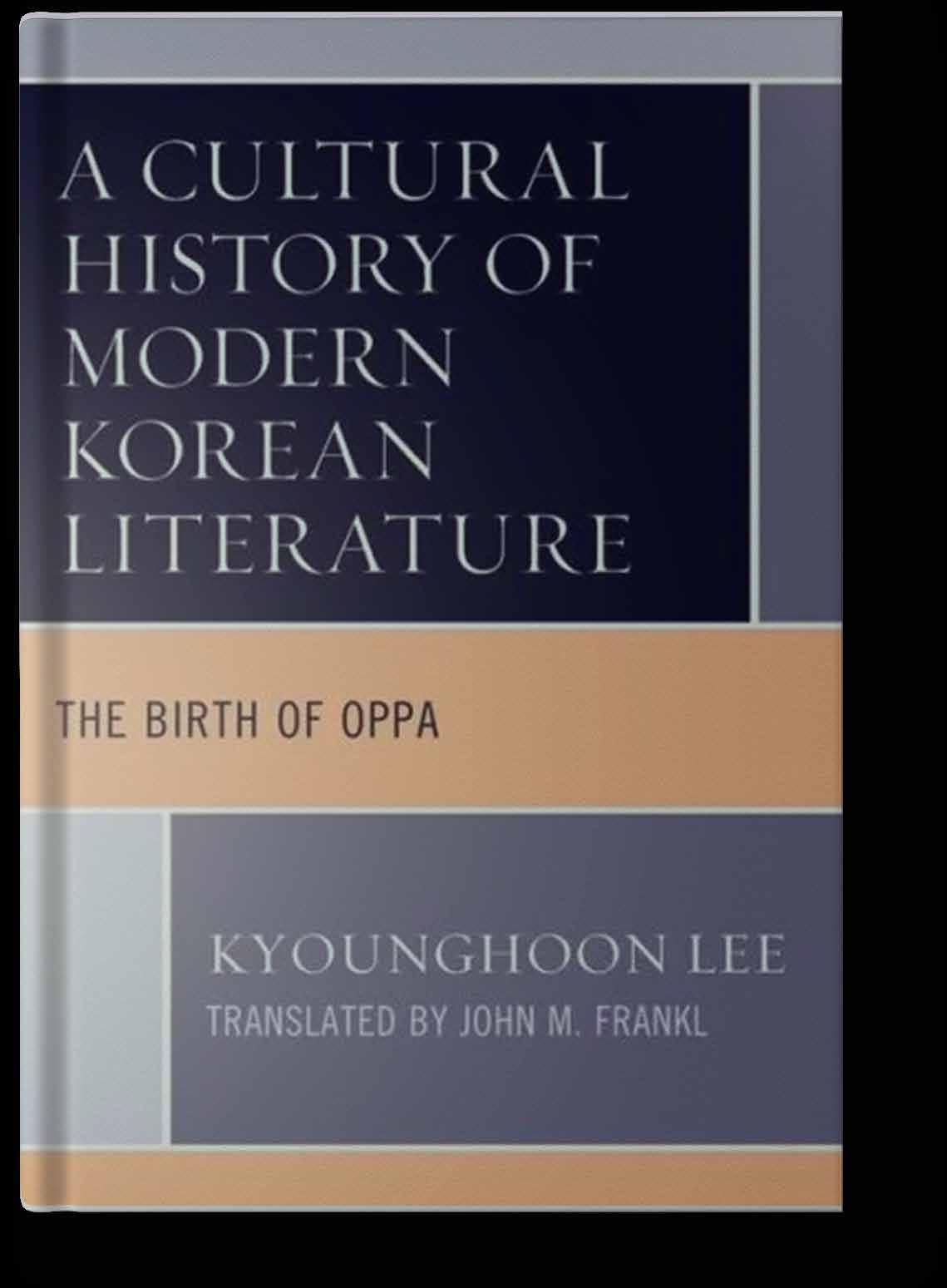
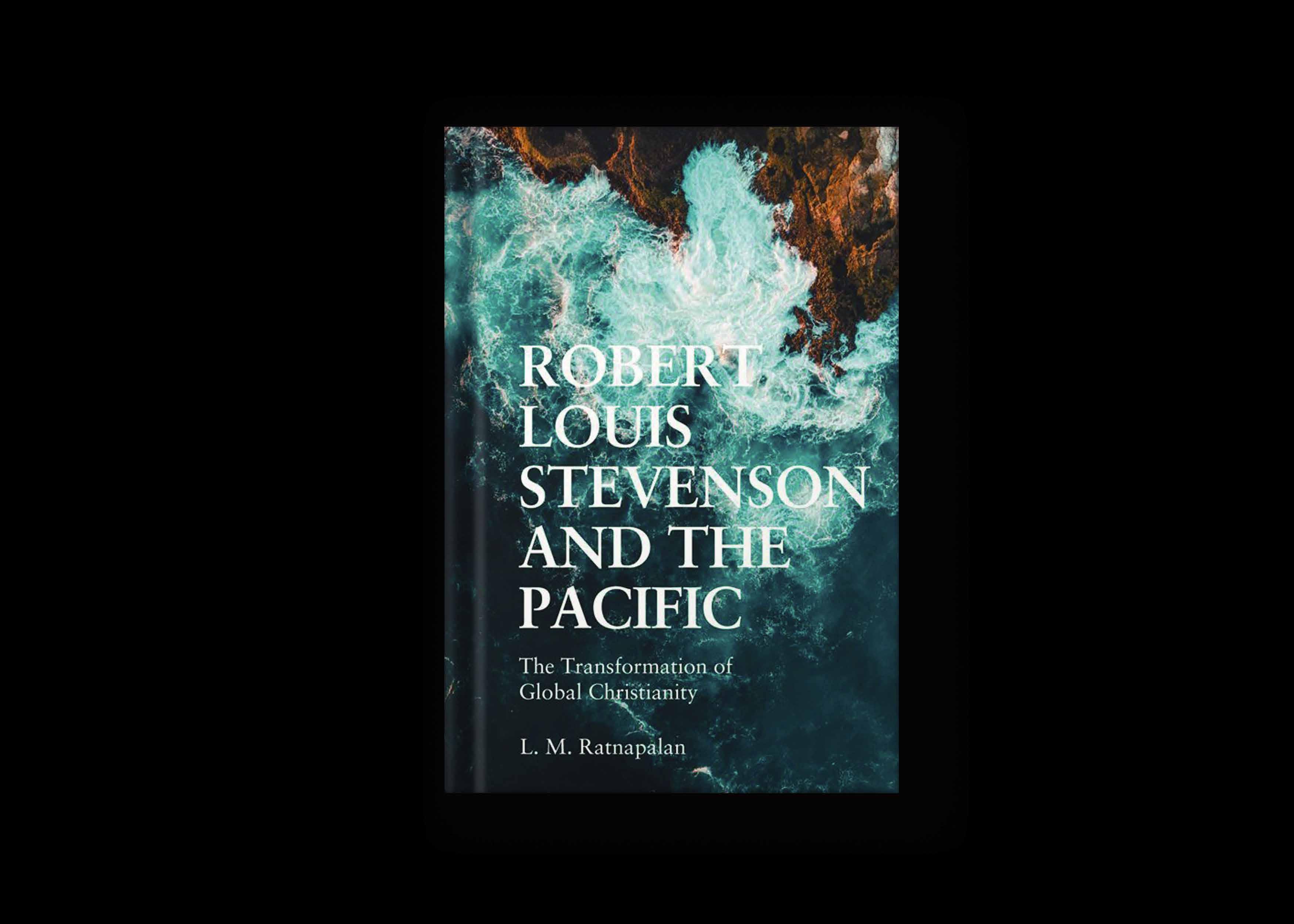



John Delury, Professor of Chinese Studies, recently published his monograph, Agents of Subversion: The Fate of John T. Downey and the CIAʼs Covert War in China (Cornell University Press, 2022).
Agents of Subversion reconstructs the story of a covert CIA mission in November of 1952 into Manchuria that ended disastrously with two American agents, John T. “Jack” Downey and Dick Fecteau, imprisoned by the Chinese government for twenty years. As part of a wider CIA campaign against Communist China, this mission fit within decades of covert anti-Chinese activity by the US government.
Published by Cornell University Press, “Agents of Subversion is an innovative work of transnational history, demonstrating both how the Chinese Communist regime used the fear of special agents to tighten its grip on society, and why intellectuals in Cold War America could not but worry about the subversion abroad that would eventually lead to repression at home.” For more on the origins of the book, see the interview that Prof. John Delury did with the Association for Asian Studies.
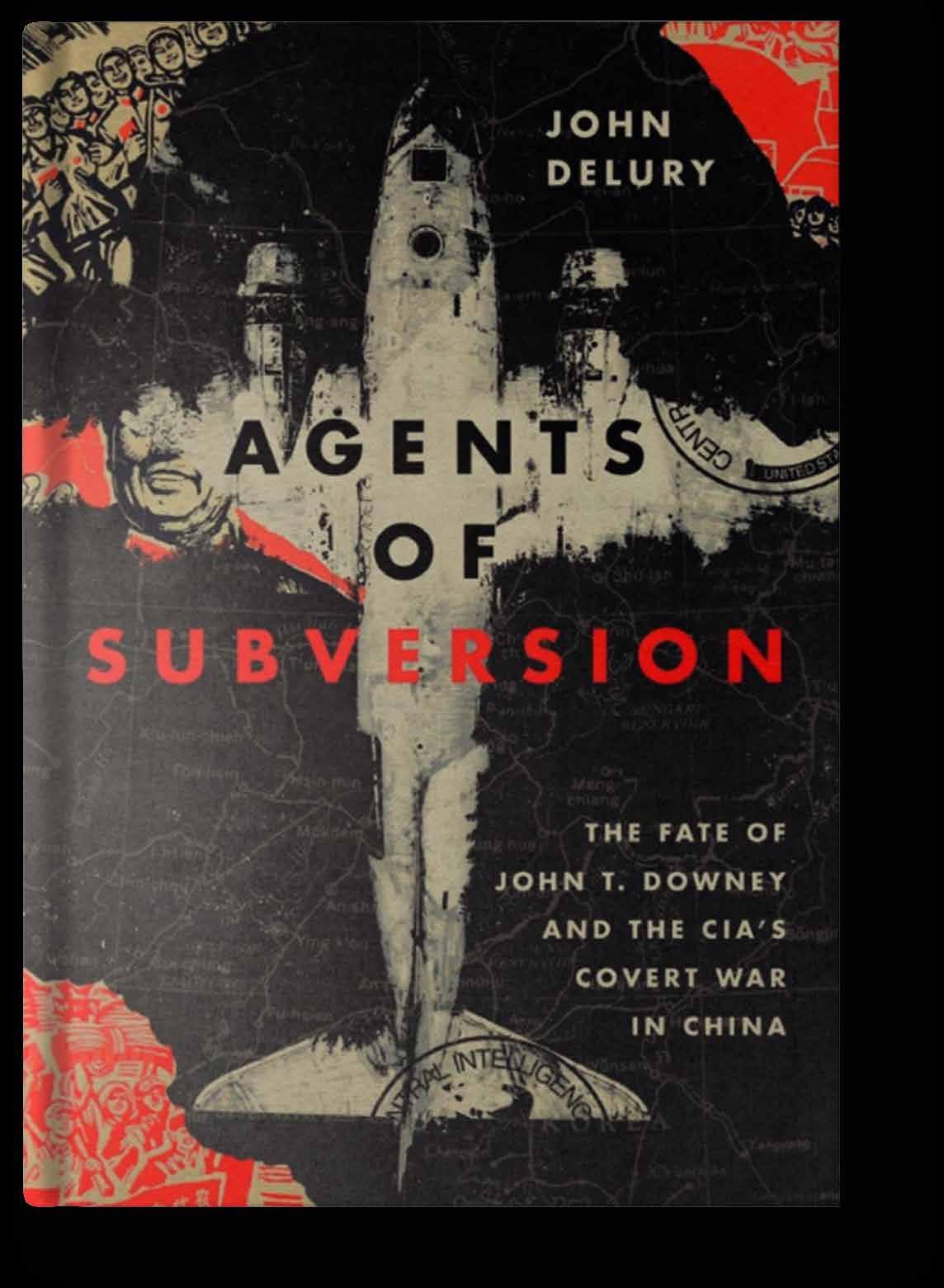
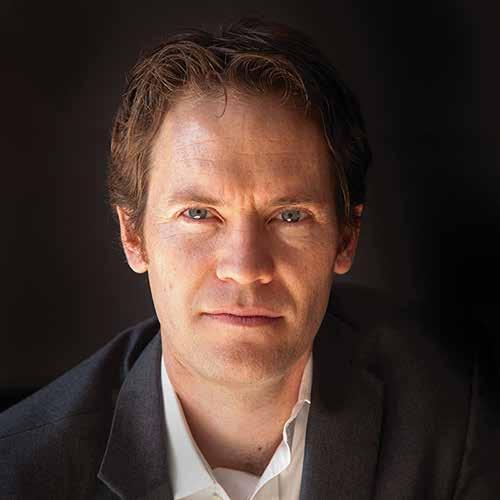

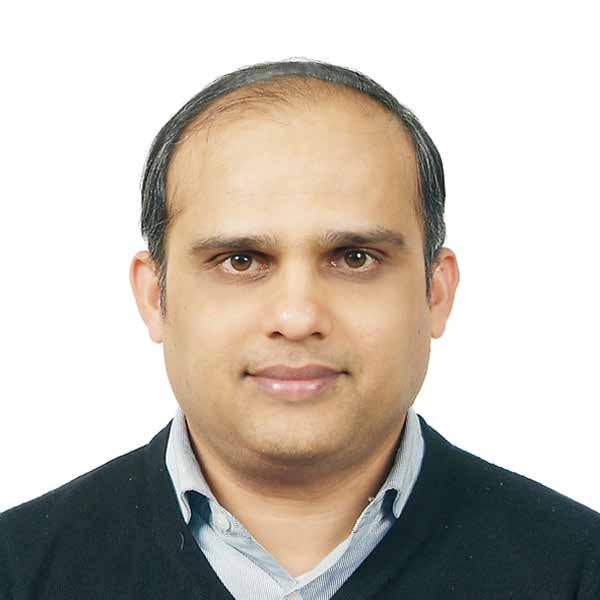
Zeolite Based Membrane for Removal of Ammonium: A Review, Membrane Journal 32(3) (2022); co-authored with UIC student Joo Yeop Lee (NSE, ‘17).
Recent Progress in Zeolite Membrane for Wastewater Treatment: A Review, Membrane Journal 32(4) (2022); co-authored with UIC student Joo Yeop Lee (NSE, ‘17).
Recent developments in conductive polymers based electro/photoelectrocatalytic materials for effective hydrogen/oxygen evolution reactions: A review, ChemElectroChem (2022); co-authored with S. Kumaravel, UIC student Esther Kim (EESE, ‘20), B.B. Kale, A. Adhikari, Rajkumar Patel, and S. Kundu.
A Detailed Review on Quality Parameters of Functional Noodles, Food Reviews International (2022).
Ion Exchange Membrane for Desalination by Electrodialysis Process: A Review, Membrane Journal 32(2) (2022); co-authored with UIC student Sarsenbek Assel (NSE, '19).
A Review Based on Ion Separation by Ion Exchange Membrane, Membrane Journal 32(4) (2022); co-authored with UIC student Sarsenbek Assel (NSE, '19).
Ceramic Based Photocatalytic Membrane for Wastewater Treatment: A Review, Membrane Journal 32(3) (2022); co-authored with UIC student Yeonsoo Kwak (EESE, '19).
Professor Natalja Deng, Associate Professor of Philosophy, was awarded a six-month (July-Sept 2023 and Dec 2023-Feb 2024) Humboldt Research Fellowship for experienced researchers in Theoretical Philosophy, at the Freie Universitaet in Berlin. Professor Deng was also awarded an Anderson Visiting Fellowship (Oct-Nov 2023), at the University of Sydney. Both stays are intended to facilitate research exchanges related to a project on "The ineffability of time", a novel metaphysical view of time. The basis for the project is the idea that understanding the metaphysical foundation for reconciling the manifest image of time with the scientific image of time requires expanding the conceptual toolbox of philosophy of time in the direction of ineffability, which has long played a central role in certain non-Western philosophical traditions.
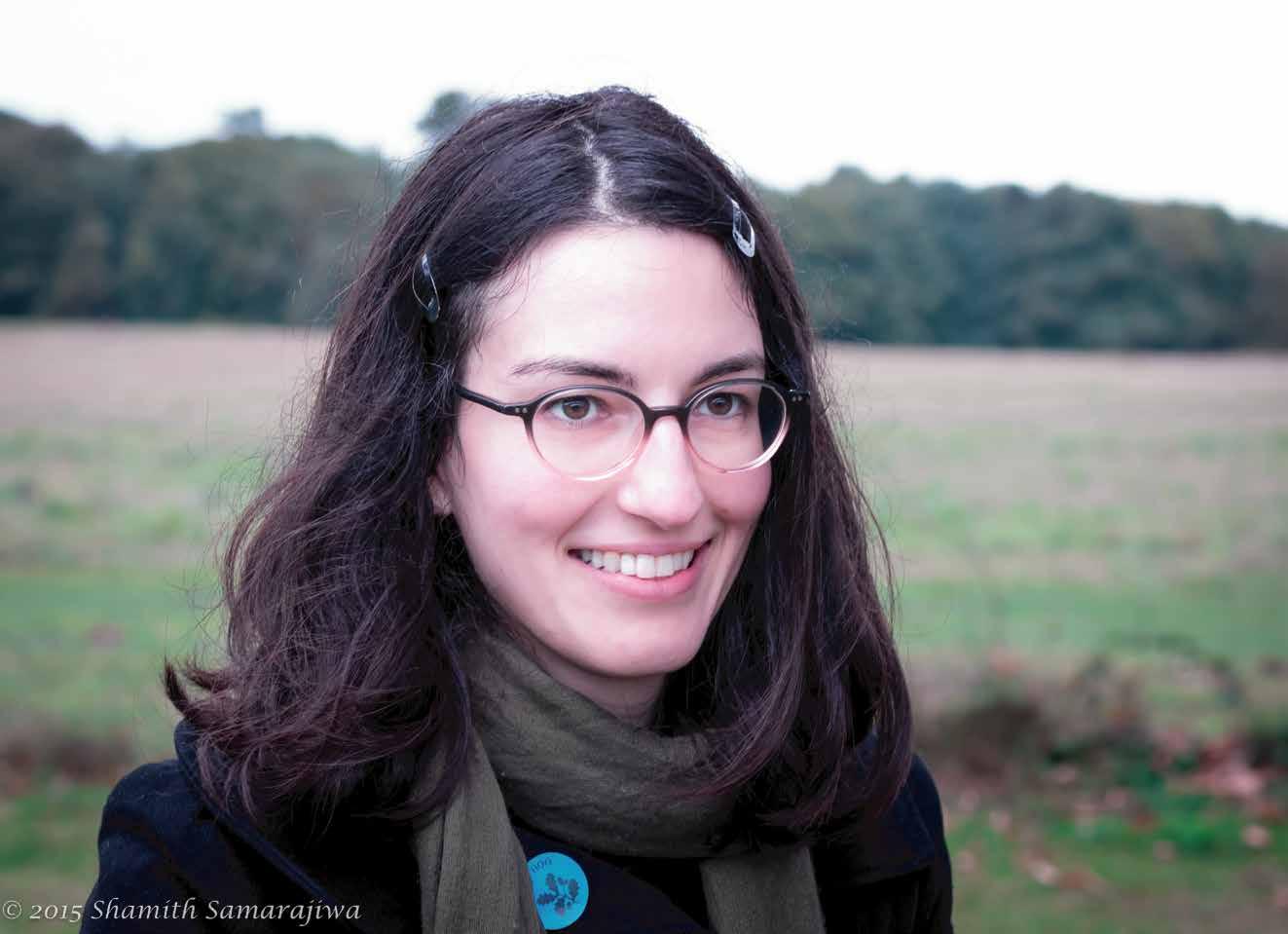
Professor Nikolaj Pederson, Professor of Philosophy, was awarded the Underwood Distinguished Professorship. The Underwood Distinguished Professorship is a prestigious award that is given to a Yonsei University faculty member who has received international recognition for his or her research accomplishments. As Underwood Distinguished Professor, Prof. Pederson will receive research support for the next three years.
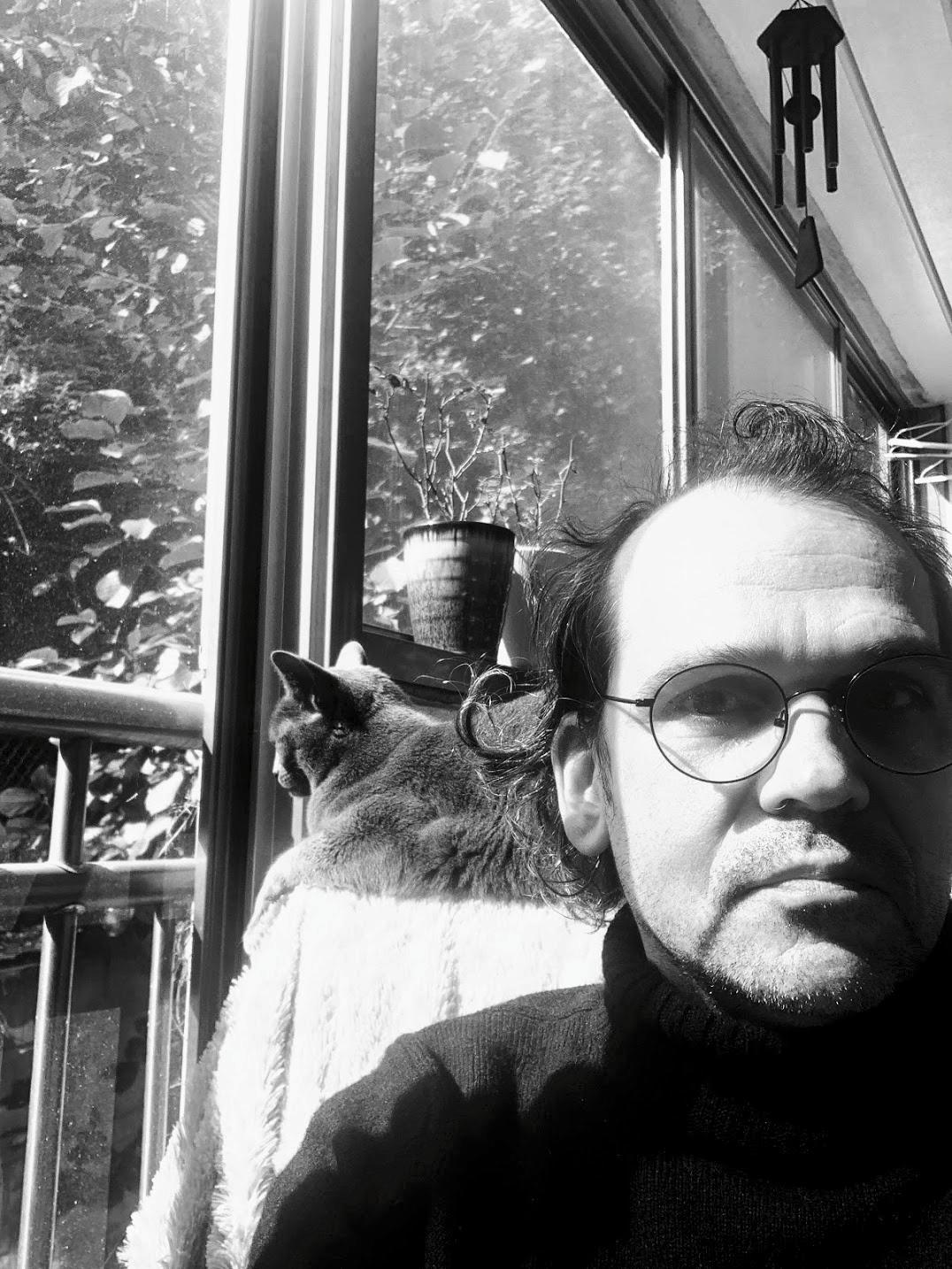
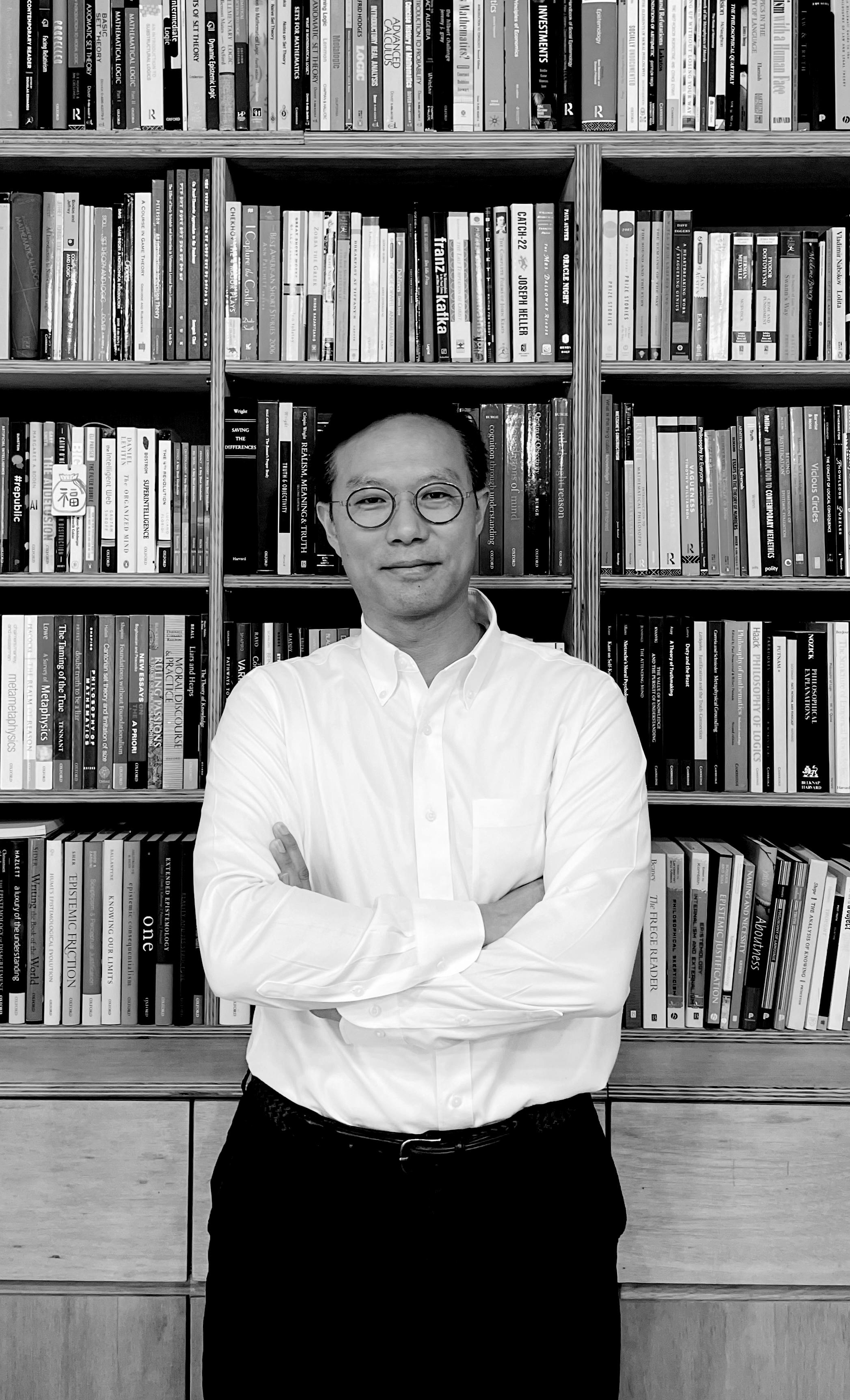
Prof Hyun-Kyung Lee has Top Cited Article 2021-2022
Professor Hyun-Kyung Lee, Professor of Culture and Design Management, was recognized as publishing a Top Cited Article 2021-2022, among all work published by the Wiley Publishing Company between January 2021 to December 2022. She received this recognition for her article “Developing Museum Education Content: AR Blended Learning,” in the International Journal of Art & Design Education.

olitics and Truth in Hölderlin: Hyperion and the Choreographic
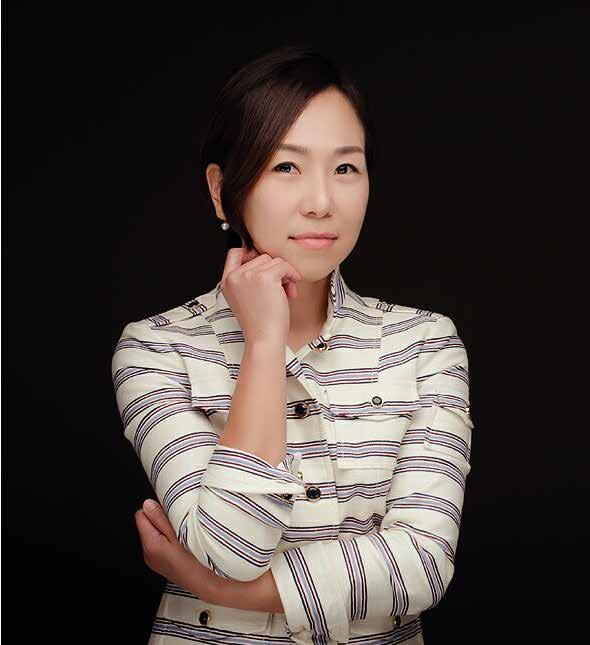
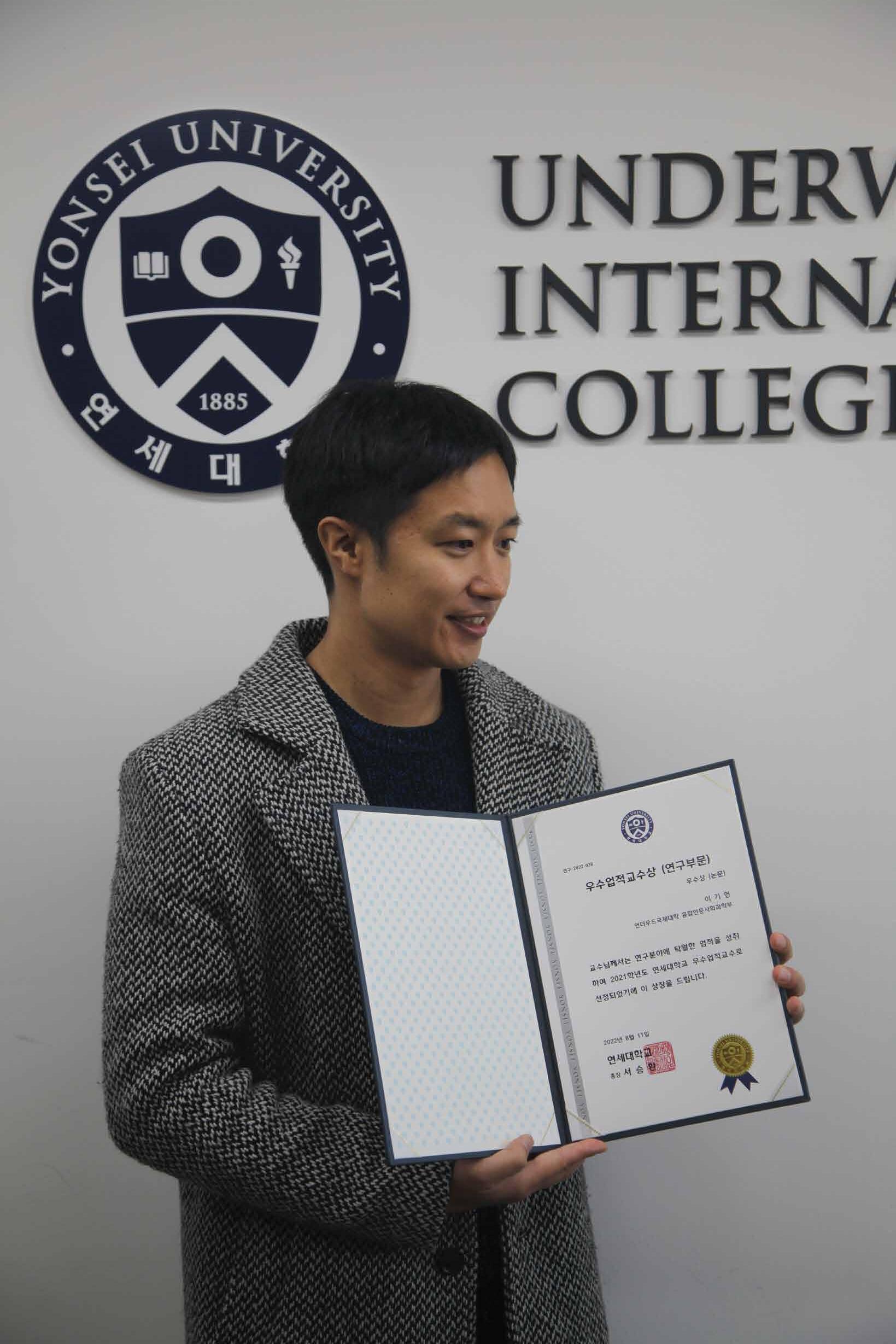
Professor Keeheon Lee, Associate Professor of Creative Technology Management, was awarded a Yonsei University Outstanding Achievement Award (Research) for the 2021 academic year. The award was presented by Dean Helen Lee in November 2022.
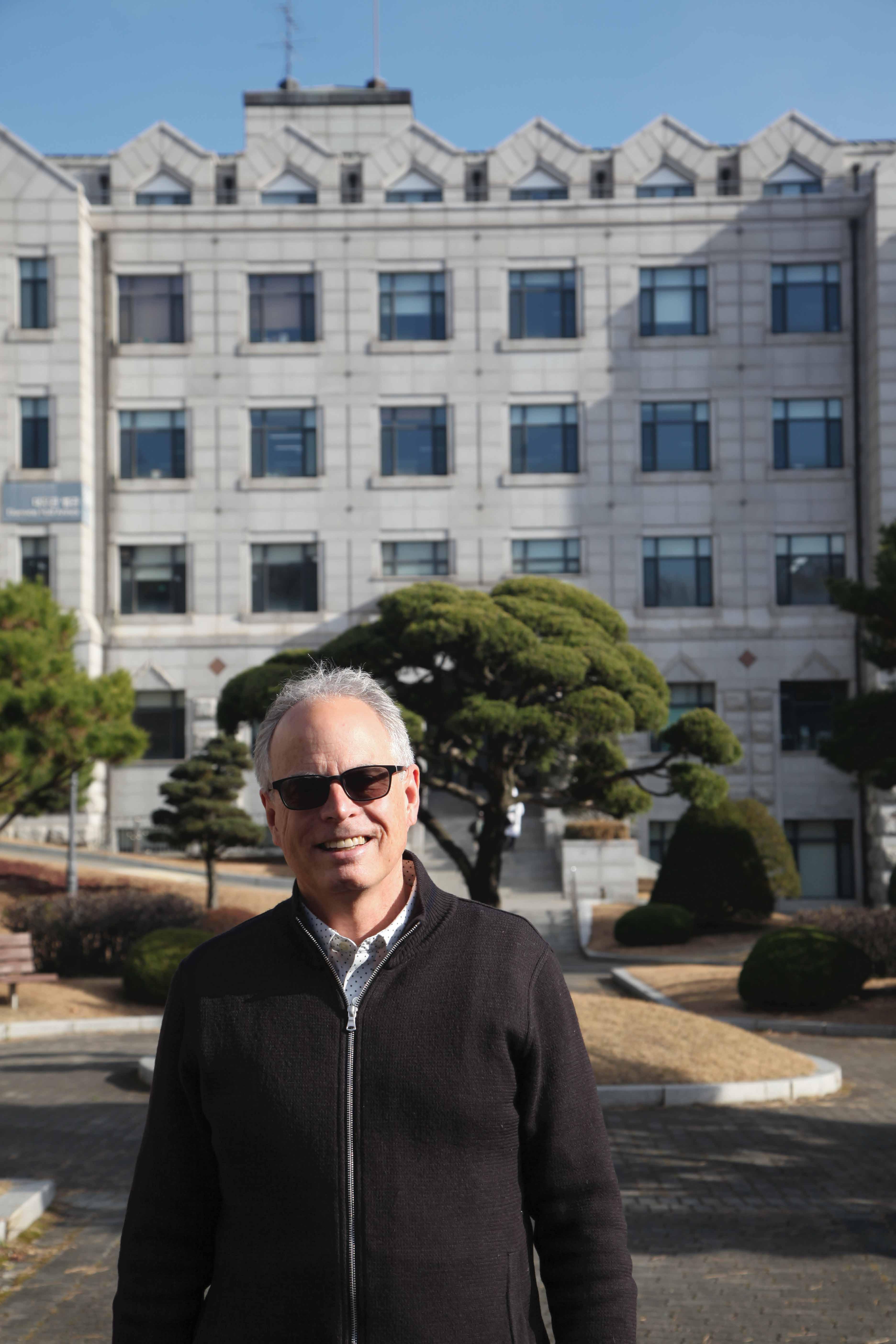

On Nov. 30, 2022, Theodore (Ted) Hughes, UIC Shinhan Professor and Korea Foundation Professor of Korean Studies in the East Asian Languages and Cultures Department at Columbia University, presented his Shinhan lecture titled “The Limitless War: Cultures of Division in Korea” at Daewoo Annex Hall #105. In a separate interview, Professor Hughes shared about his experiences in Korea, how he came to specialize in Korean Studies, his interactions with students in the field, and his plans for future projects.
Q: Can you please introduce yourself?
My name is Ted Hughes and I'm currently the Korea Foundation Professor of Korean Studies in the Humanities at Columbia University. Iʼm in the department of East Asian Languages and Cultures there.
Q: When you first started your academic career, how and why did you decide to pursue Korean Studies? Was there any particular reason or motivation to focus on Korea?
I actually went to college five years late because after graduating high school, I worked at a job in a warehouse for a while and then I enlisted in the army, where I spent two years in Korea. Once I got out of the army, I went to a community college and transferred to UC San Diego where I majored in English and American literature, and then I returned to Korea to teach English. So, I didn't do anything related to Korea at all as an undergraduate.
During my time in the army, I had an assignment that took me away from the standard kind of military installation, so I was working very closely with Koreans and I had time to learn Korean on my own. In a way, I had progressed in the language prior to entering college but didn't pursue it as an undergraduate. In that time, I increased my Korean proficiency and I was living in Changwŏn so I spent a lot of time with graduate students from Masan University who were interested in teaching me about Korean literature—this was really the starting point in my journey.
Then I applied to graduate school, to comparative literature departments, but I was encouraged to talk to people in East Asian Languages and Cultures Department since I had put down Korea on my application as an interest. I ended up switching from comparative literature and I went into what was then the East Asian Languages and Cultures Department—from that point forward I just did Korean.
Q: Youʼve focused on a variety of issues across Korean Studies—is there a common theme that runs through your work on Korea or has your focus progressed naturally from when you first started working in Korean Studies?
I've always considered myself as someone who really likes to read and study literature, so it was actually a natural progression to move from English and American Literature to Korean literature. I like to do interdisciplinary work and Iʼve tried to develop my interests in that way but I would say first and foremost Iʼm a literary studies scholar. However, I also consider my work to be cultural studies in a way because I like to look at extra literary texts, such as photography, film, and art. I try to engage with the scholarly work in other disciplines like anthropology, sociology since I enjoy reading history. I was influenced by my advisor Professor John Duncan to work in the way that I wanted to work while showing me how to see things through a historianʼs lens, which has been tremendously helpful to me.
Q: Your Shinhan seminar at UIC focused on the Korean War—is this representative of your current and future research projects or are you thinking of a different future direction for your research?
This particular talk is actually drawn from a section of my book which I'm entering in the final stages of working on, so it's not pointing to a new direction. I've presented a portion of the talk elsewhere, but the majority of the talk was actually new for me as it was the first time I've ever presented that work so it was a wonderful opportunity for me and I'm very grateful to have had it here. I got some helpful comments at the end of the talk and afterward I got to talk to some scholars whom I respect deeply so it was really a wonderful experience.
Q: Aside from completing work on your book, do you have a sense of what your next project might be?
I've spent a lot of time on this book manuscript so what I would like to do initially is actually focus on publishing articles for a couple of years and allow myself to explore new topics. What I have in mind in terms of time period is I would like to look at later decades as I move forward since a lot of my work is focused on the 1950s, with some work on the 1960s.
As you get older or later in your career sometimes you reflect back to earlier times and we were talking about how I got into Korean Studies, how I learned Korean, and I had people advising me. One of them once told me that you should be reading popular novels, the kind that no one teaches in Korean Language and Literature departments because you need to learn Korean. When I look around I see an opening there because thereʼs not that much work done on things like the popular detective novels of the early 1970s so that would be one area that I'm kind of interested in.
Q: What are your impressions of the Korean Shinhan seminar class and how has your experience been teaching these UIC students?
I felt fairly comfortable entering into this when I agreed to come and teach the class because I had taught a joint class in the summer of 2015 that brought together an equal number of UIC students with Columbia students. So, I felt that I had kind of a UIC experience from that course, which helped the way I approached the seminar.
I would say that I'm just very impressed with UIC students. I enjoy learning from students; I like to engage with them, learn about where they're at and where they're coming from. I thought this was a very engaged and highly motivated group so it made teaching a pleasure and kind of easy. Although one had to do it everyday, it was fun and I hope the students feel the same way.
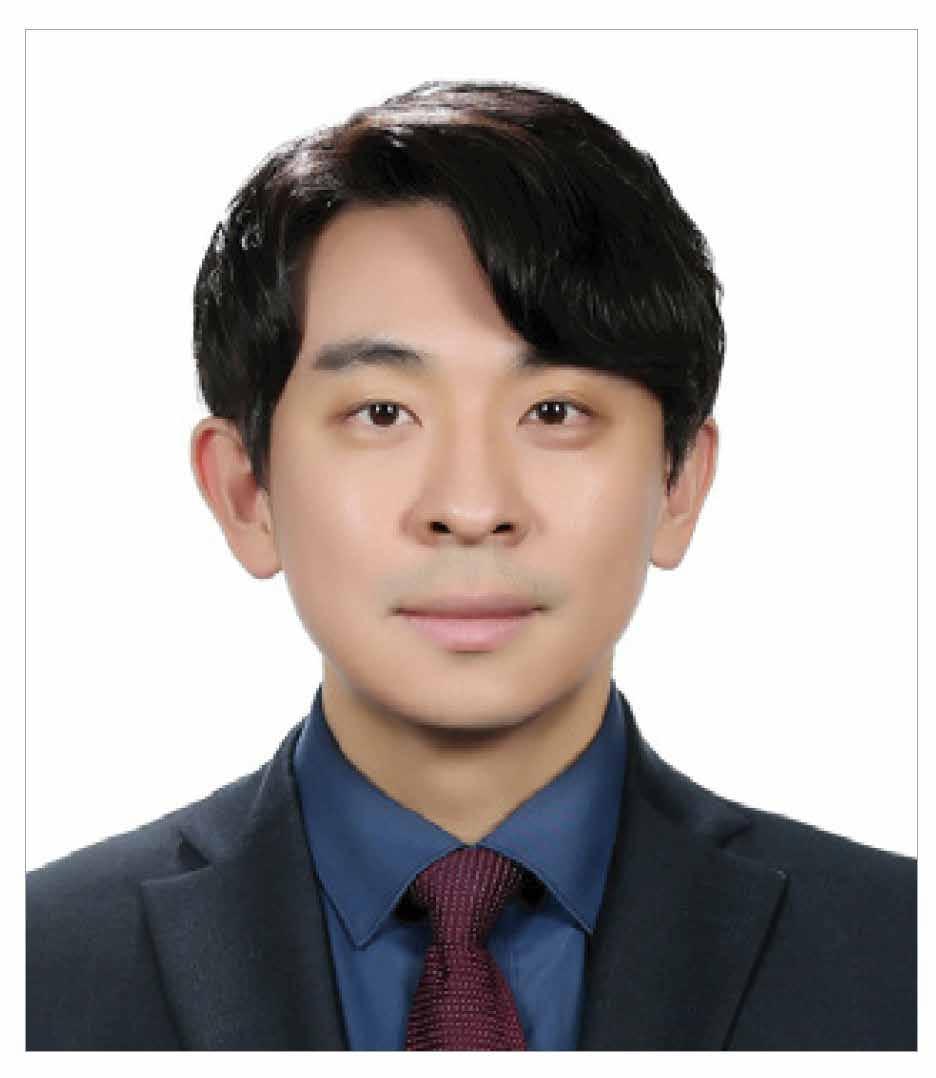
Prof. Sangyup (Sam) Choi, Associate Professor of Economics and Chair of the Underwood Economics Major, recently received the Choheon Academic award from the Alumni Association of the College of Business and Economics. In October of 2022, he was featured in a Chosun Biz article about the Korean economy alongside several young and influential economists in Korea. In 2022, Prof. Choi published several co-authored articles.
Labor Market Dynamics Under Technology Shocks: The Role of Subsistence Consumption. Macroeconomic Dynamics (2022)
Heterogeneous Gains from Countercyclical Fiscal Policy: New Evidence from International Industry-Level Data. Oxford Economic Papers (2022)
Are Government Spending Shocks Inflationary at the Zero Lower Bound? New Evidence from Daily Data. Journal Of Economic Dynamics and Control (2022)
Uncertainty, Financial Markets, and Monetary Policy Over The Last Century (Lead Article). B.E. Journal of Macroeconomics: Advances (2022)
Bitcoin: An Inflation Hedge But Not A Safe Haven. Finance Research Letters (2022)
Inflation Anchoring And Growth: The Role of Credit
